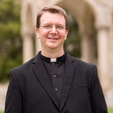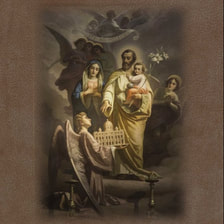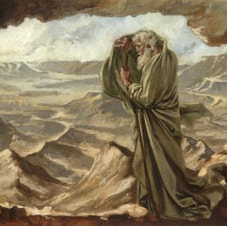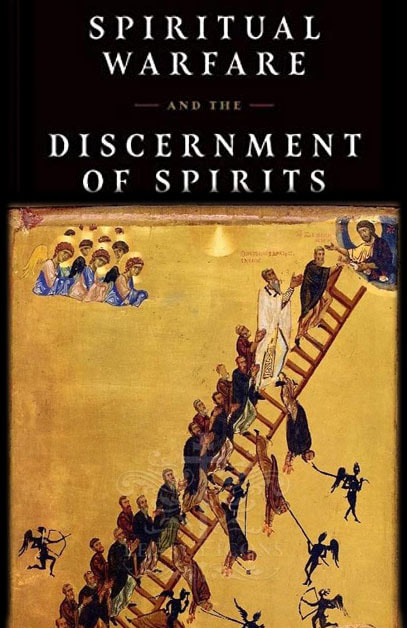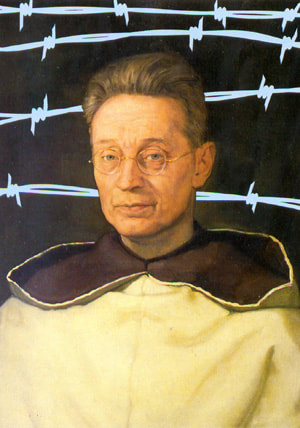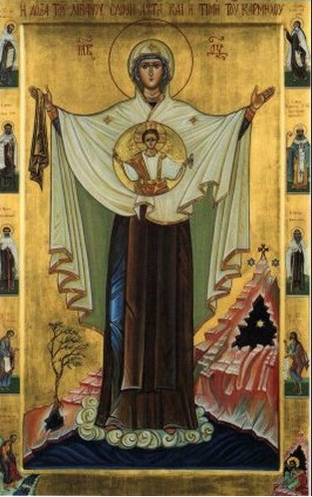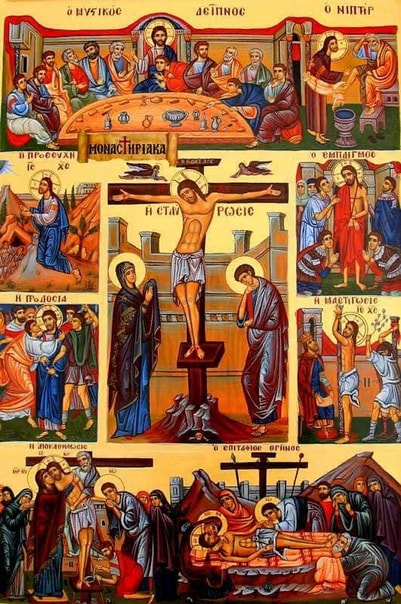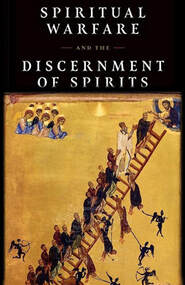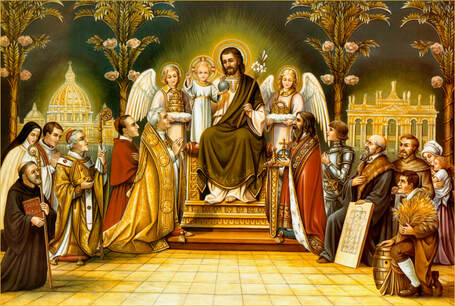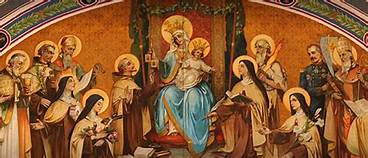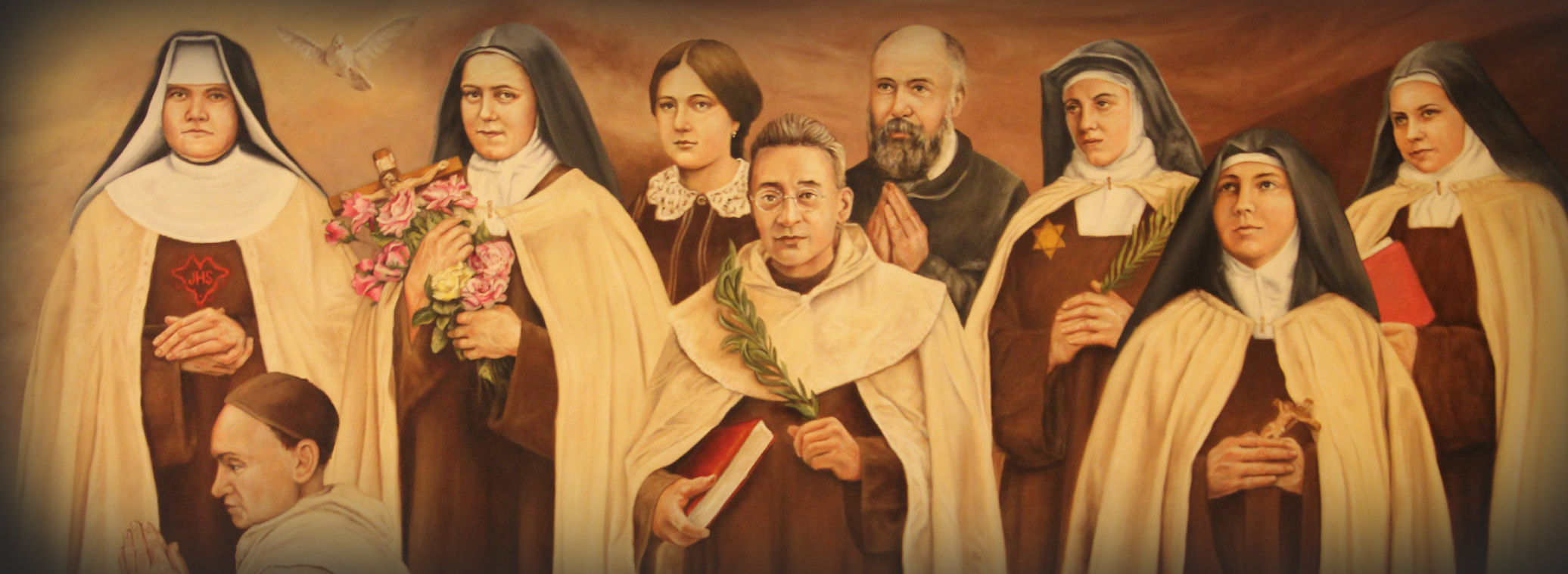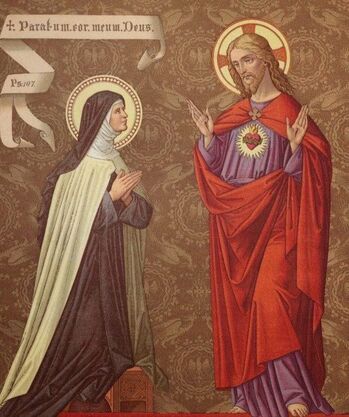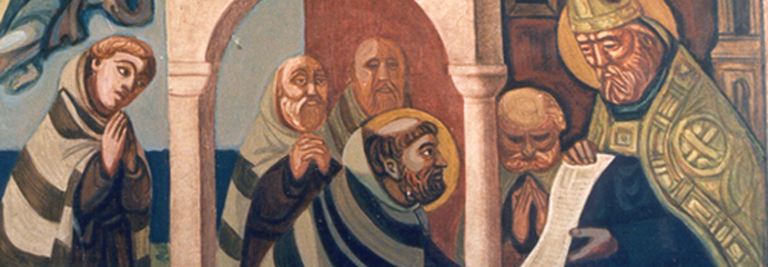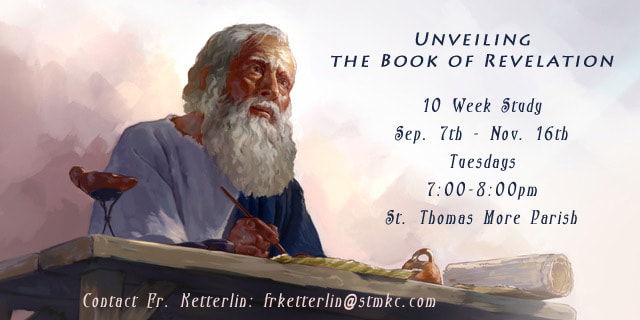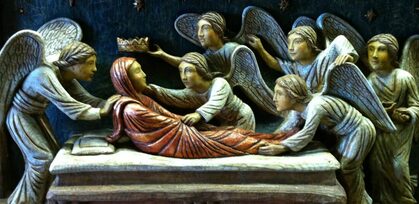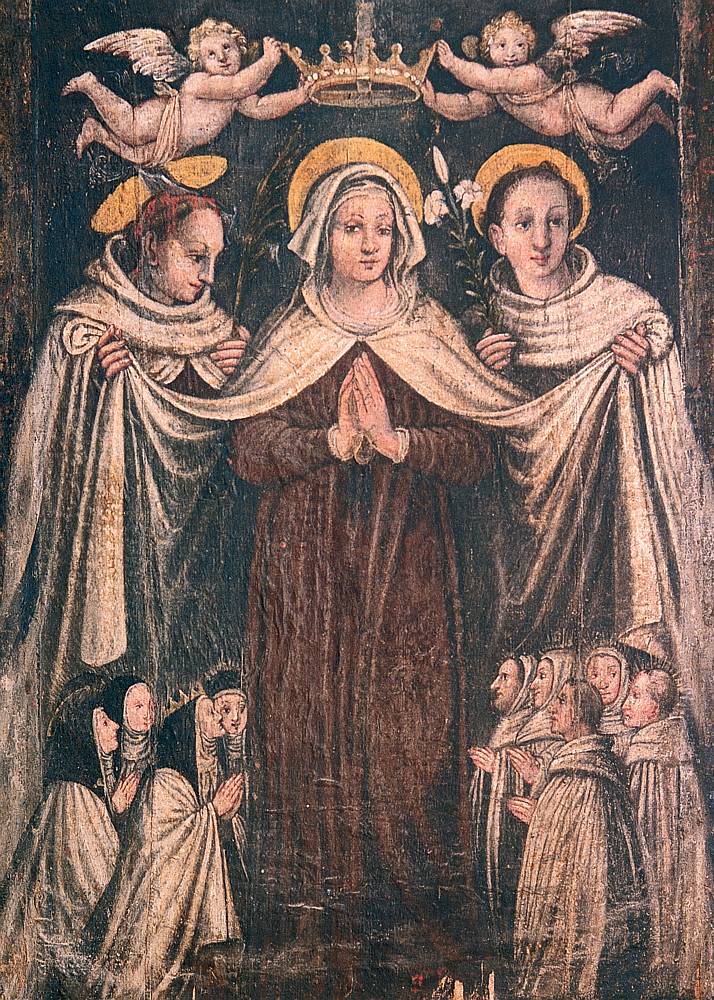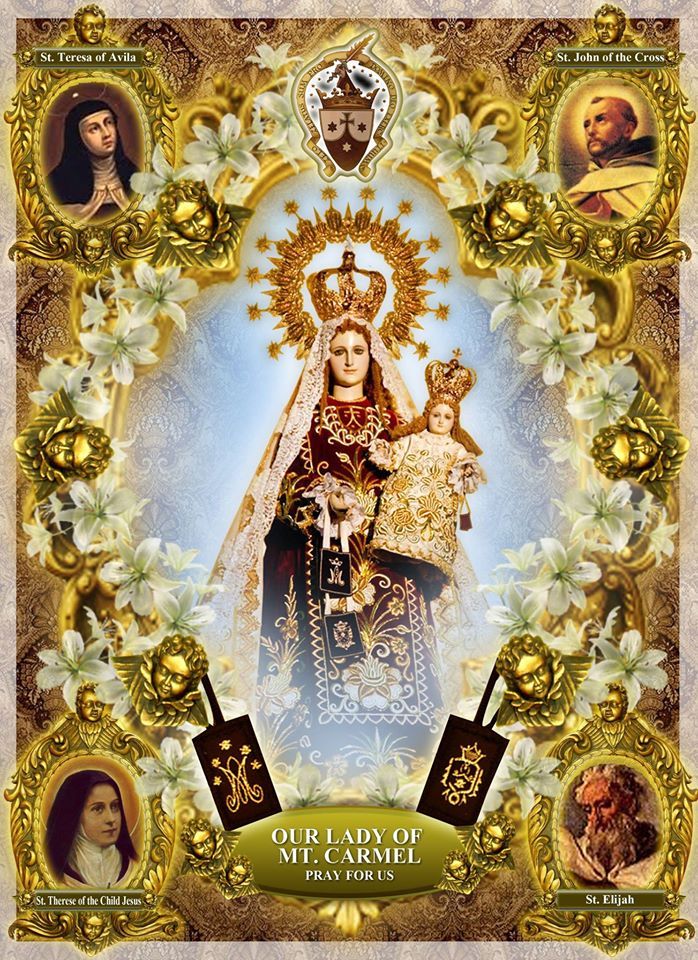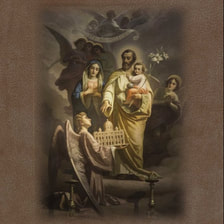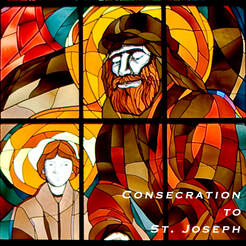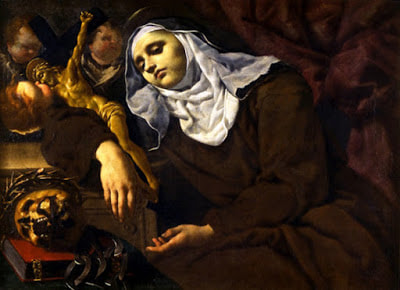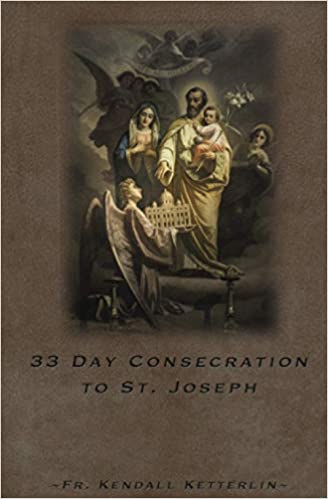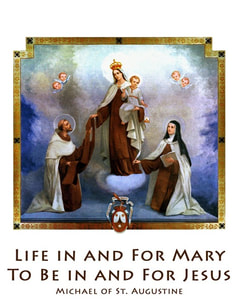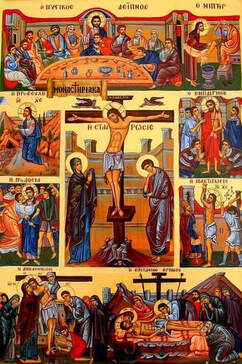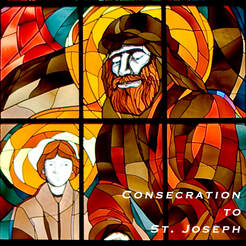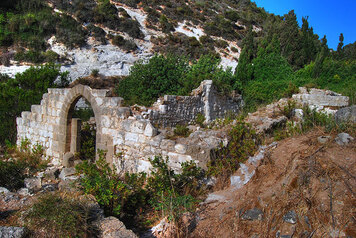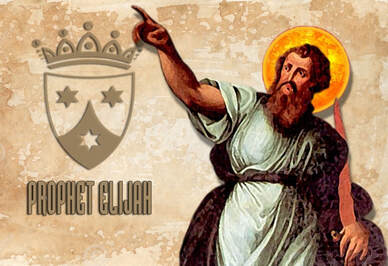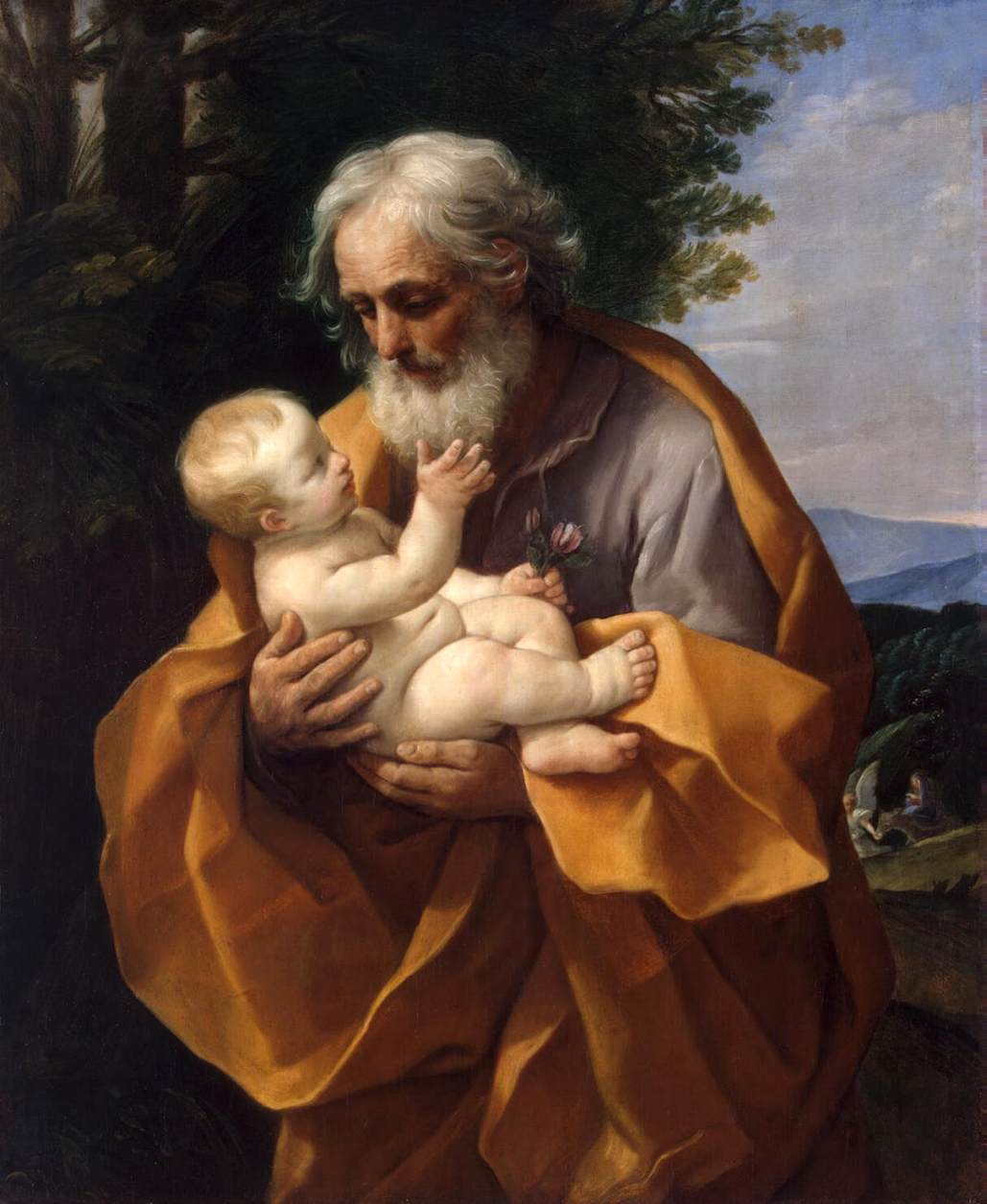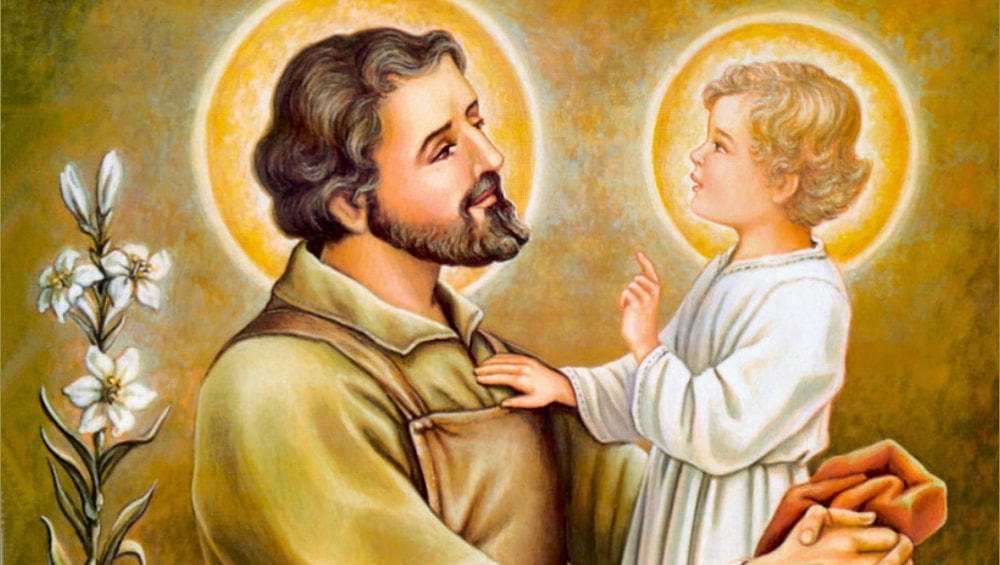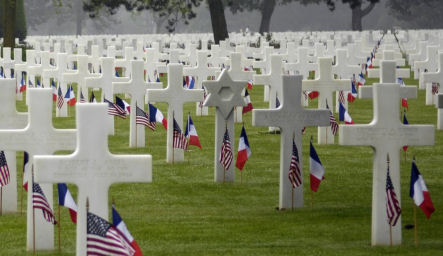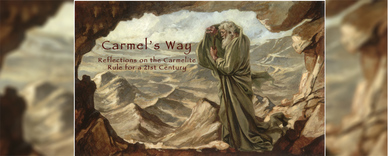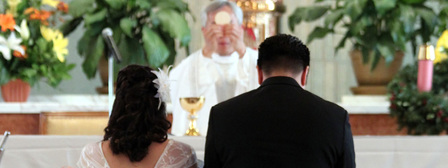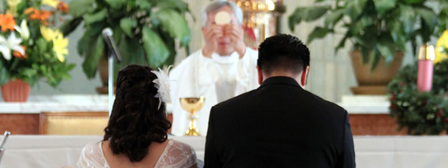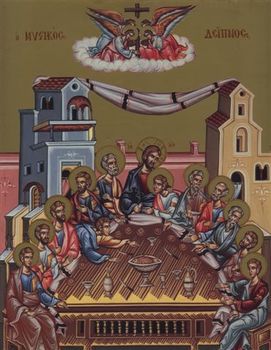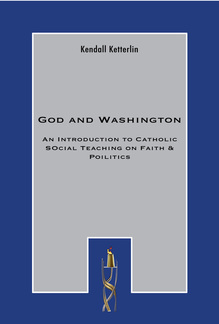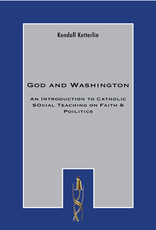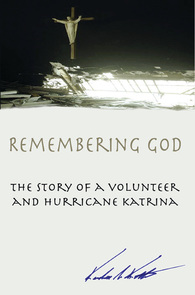Publications
|
Coming to the Font: May 14th
| ||||||||||||||||||||||||||||||||||||||||||||||||||||||||||||||||||||||||||||||||||||||||||
|
A significant, yet often overlooked aspect that is essential for the health of our Christian life, is the environment we are in. Not only the place in which we live, but also our job, our hobbies and the places where we spend time and recreate. This month we'll look at the importance of the places we occupy for our spiritual life, and the significance of a place of silence.
CLICK HERE to go to the Conference Page
|
Coming to the Font: April 23rd
The Counsels of Perfection: Renunciation of Ownership
|
Together, the Counsels of Perfection give us the guidance and direction that leads one to the Perfection of Love which we seek, that is, to love perfectly as our Father Loves us. In this light we can see that while Obedience is the first step necessary in living a life in allegiance to Christ and loving Chastely is the reward and very end of this life, the renunciation of ownership is the day-to-day work that conducts one along the journey and the way of perfection.
Through the Renunciation of Ownership, we break away the ties that bind us to things, whether material or immaterial. Just as something becomes no longer my computer or my books to the exclusion of others, we can ascend to where it is no longer my time or my joy in ownership. Rather, we may still say my joy, but it is not because I own or a responsible for it, but by relationship--my joy is the joy that resides in me. 7:15-8:00 am CONFESSIONS
8:15 am MASS ADORATION (until 9:15) 9:15 Conference on Renunciation of Ownership **At St. Thomas More Parish |
Prayers for Holy WeekAlthough the Sacred Triduum begins on Thursday, each day of Holy Week possesses a special character and invites us to enter more deeply into the Mysteries that begin on Holy Thursday. This packet includes prayers that you can offer each day. They make a particular beautiful practice for families.
| |||||||
Discernment of Spirits
|
LATEST VIDEO
|
7 Sundays Devotion to St. Joseph
|
Offered on the 7 Sundays leading to the Feast of St. Joseph on March 19th, this devotion recalls the 7 Sorrows and 7 Joys of St. Joseph.
This year, the devotion will begin on January 30th. On each Sunday, a short prayer is offered, then a Gospel reading and conclusion with the Litany of St. Joseph. There will also be a short recorded reflection which will be uploaded each week. CLICK HERE to view the prayers and reflections on line --OR--
| |||||||
COMING TO THE FONT: The Counsels of Perfection
SATURDAY, JANUARY 15th:
THE COUNSELS OF PERFECTION: Recognizing the Prior
8:15 am
THE COUNSELS OF PERFECTION: Recognizing the Prior
8:15 am
The first thing that Albert asks of the brothers of Mt. Carmel, is that they appoint a prior to whom they profess obedience. In adapting the Rule, we would also consider recognizing a prior and how this may look very different from the prior of the monastery--and yet, also the same.
When St. Teresa of Jesus returned to her home monastery of Avila as the appointed prioress, she shocked many of her sisters by placing a statue of Mary in the prioresses seat, reminding them that the Mother of God was the Prioress. In the family setting, we can also be reminded of the sacramental affects of Marriage. God unites what was two into one, such that husband and wife are together bound as prior of the home. In fact, in almost every situation, we can consider and look toward recognizing who the prior is. While not offering the vow of obedience, live with a disposition and view toward a proper sense of obedience.
Next month, we will look more closely at the promise and living with a disposition of obedience.
When St. Teresa of Jesus returned to her home monastery of Avila as the appointed prioress, she shocked many of her sisters by placing a statue of Mary in the prioresses seat, reminding them that the Mother of God was the Prioress. In the family setting, we can also be reminded of the sacramental affects of Marriage. God unites what was two into one, such that husband and wife are together bound as prior of the home. In fact, in almost every situation, we can consider and look toward recognizing who the prior is. While not offering the vow of obedience, live with a disposition and view toward a proper sense of obedience.
Next month, we will look more closely at the promise and living with a disposition of obedience.
| Chapter 4 of Adaptations | |
| File Size: | 86 kb |
| File Type: | |
RESOURCES FOR 4TH WEEK OF ADVENT
As we enter these final days of Advent, we enter a privileged time, the final moments of preparation to focus our attention on the arrival of the Son of God; that free of distractions and false expectations, we may recognize the face and presence of Christ when he comes to us. This is his promise: he will come to us, that we only need to prepare our hearts and homes, our eyes and our ears, so that we are ready to receive him, the one who first loved us and has always pursued us.
The following are resources and prayers that can be used this week to help draw your attention and increase the joy and celebration that begins Christmas Day.
The following are resources and prayers that can be used this week to help draw your attention and increase the joy and celebration that begins Christmas Day.
|
These are the 4 Gospel readings that are given for the Masses of the Nativity of the Lord. Form the Gospels of Matthew, Luke and John, they lead us through God's long plan and arrival His Son.
It is recommended that you, with your family, read one a day, beginning Monday. | ||||||
|
December 17-23 are accompanied by an ancient tradition in prayer commonly referred to as the "O Antiphons". These short prayers proclaim the promises of the one who is to come. It is suggested to pray these each day, with the Magnificat, the Song of Mary that is found in the Gospel of Luke.
| ||||||||||||
COMING TO THE FONT: All Saints of Carmel
SATURDAY, NOVEMBER 13th:
8:15 am
8:15 am
|
7:15-8:00 am CONFESSIONS
8:15 am MASS ADORATION (until 9:15) 9:15 Conference on Turning to the Saints of Carmel **At St. Thomas More Parish |
The second chapter of the rule reminds us of the many ways that our saintly forebears lived in allegiance to Christ. Although we have found great Love on Carmel, it remains but one of the ways that men and women have found in drawing them deeper to the Heart of Jesus. Yet all of these ways--Dominican, Franciscan, Augustinian, Benedictine, Eastern Rite Catholics . . .-- also bear in common a central key: All are called to a life of service and to be united with the Heart of Christ, and such life must be lived unswervingly.
In other words, all are called to a life on holiness and sainthood, and we have been given the lives, words and examples of the Saints to lead us down this way. |
COMING TO THE FONT: St. Teresa of Jesus and the Holy Trinity
SATURDAY, OCTOBER 16th
8:15 am
8:15 am
|
7:15-8:00 am CONFESSIONS
8:15 am MASS ADORATION (until 9:15) 9:15 Conference on The Holy Trinity in Carmel **At St. Thomas More Parish Teresa of Jesus wrote eloquently and intensely about the Beloved, the Son of God who captured her heart; John of the Cross wrote of the burning fire and love of the Holy Spirit; Therese of the Child Jesus painted the image of a child in the loving arms of the Father.
It seems to be no accident in these three foundations illuminated one particular person of the Holy Trinity, and through this person, they describe the soul's spiritual journey to purification and love. As we begin exploring adaptations to the Rule for daily life, we will look at the place of the Holy Trinity in Carmel. |
COMING TO THE FONT: Albert of Jerusalem, the Rule Giver
|
SATURDAY, SEPTEMBER 18TH
ST. ALBERT OF JERUSALEM 8:15 am 7:15-8:00 am CONFESSIONS
8:15 am MASS ADORATION (until 9:15) 9:15 Conference on The Carmelite Rule **At St. Thomas More Parish |
The Carmelite Order has the unique moniker of being the only major order whose Rule was written by someone who was not their founder. In fact, Albert of Jerusalem was not a part of the order, but as Patriarch, held the position to formalize the Way of Life that had been lived on Mt. Carmel for more than a hundred years.
We'll also answer the question as to why paintings of early Carmelites depicts the friars in striped habits. |
|
For many Christians, there is no more intriguing and beguiling book in the New Testament than the Revelation to John. The imagery, symbolism, beauty and prophetic witness make it equally difficult to interpret and understand what our Lord is trying to communicate to His Church.
More than an almanac describing events and signs so that the Christian community can recognize the return of Christ, the Revelation to John unveils the role of the Church in the world and God’s plan of salvation that spans over centuries. I will be leading a 10 week, in depth study of the Book of Revelation, drawing from the long tradition of Catholic interpretation: connections to the Old Testament prophets and analogical interpretations. We hope to unfold the story of God’s plan and His work to bring about the salvation of the greatest number of people and the fulfillment of the promise made in Christ. |
Week 1: The Prophets of Revelation, Key Characters and Symbols
Week 2: Letters to the Churches Week 3: A Vision of Heavenly Worship and the Lamb Week 4: Breaking Open the Seals Week 5: The Sound of Trumpets Announcing Week 6: The Drama Unfolds: a Woman, a Dragon and 2 Beasts Week 7: The Great Harvest Week 8: The Bowls of God’s Fury Week 9: Judgment and the Kingdom on Earth Week 10: The Fullness of Salvation: Union of Heaven and Earth |
COMING TO THE FONT: Assumption of the Blessed Virgin Mary
|
SUNDAY, AUGUST 15TH
THE ASSUMPTION OF THE BLESSED VIRGIN MARY 11:00 am Between the Latin, Eastern and Orthodox churches, there is universal agreement that the Blessed Virgin Mary was assumed into heaven, body and soul. Aside from Jesus, she was the first to live a life of perfection and reveal its fruits. Our conference looks at the meaning and origins of a spirituality of Perfection in the early Christian Church.
11:00 am MASS 12:15 Conference on the Meaning of Perfection **At St. Thomas More Parish |
|
COMING TO THE FONT: Our Lady of Mt. Carmel
|
SATURDAY, JULY 10TH
OUR LADY OF MT. CARMEL 8:15 am Our Lady of Mt. Carmel is one of the very few mantles of the Blessed Virgin that has appeared in different places and and times. Her first appearance was to St. Simon Stock, but she later appeared at Fatima and Garabandal. She is also associated with the appearances at Lourdes.
7:15-8:00 am CONFESSIONS 8:15 am MASS ADORATION (until 9:15) 9:15 Conference on Our Lady of Mt. Carmel **At St. Thomas More Parish |
COMING TO THE FONT: Purification of the Heart
|
SATURDAY JUNE 12TH
FEAST OF THE IMMACULATE HEART OF MARY Every Saint who has walked with Christ has sought and desired to obtain a Pure Heart. It is not something that is peculiar to the Carmelite Order and Way of Life.
What is the Carmelite way of seeking and attaining a Pure Heart? What does it even mean, to have a Pure Heart? 7:15-8:00 am CONFESSIONS 8:15 am MASS ADORATION (until 9:15) 9:15 Conference on Purification of the Heart **At St. Thomas More Parish |
33 Day Consecration to St. Joseph
Begins May 19th (Tuesday)
with final Consecration on Father's Day (June 20th)
|
This consecration to St. Joseph begins on Tuesday, May 19th, for the intention of making the final Consecration on Father's Day, June 20th.
Each day of the Consecration is noted by a theme, usually drawing attention to one of the Titles of St. Joseph. You are asked to pray the Litany of St. Joseph, along with a second prayer from the Tradition and an act of consecration. One making the Consecration is also encouraged to abstain from meat on Wednesdays, go to Confession weekly and make one noteworthy act of charity each week. Each day, there will be a video meditation posted. You can also access a written meditation and the daily prayers through the links provided below. Copies of the Consecration will be provided to those attending the Communal Acts of Consecration at St. Thomas More Parish. Copies are also available through Amazon: CLICK HERE |
First Act of ConsecrationTuesday, May 19th 5:00-6:00 pm Eucharistic Adoration 6:00-6:30 pm Meditation and First Act of Consecration ** CONFESSION WILL BE AVAILABLE 5:00-6:00pm |
Coming to the Font:
Mary Magdalene de Pazzi and the Mystical Union of Prayer
|
TUESDAY, MAY 25th
The next Carmelite Spirituality gathering will be on Tuesday, May 25th, beginning at 6:30pm @ St. Thomas More Parish. We will be hearing about the Mystical experience of prayer, primarily through Mary Magdalene de Pazzi whose writings are the collection of her mystical elocutions. 6:30pm Evening Prayer Adoration (ends at 7:30) 7:30 - 8:00pm Conference |
33 Day
|
Coming to the Font:
The Maryform Life, Michael of St. Augustine
Prayers for Holy Week
Each day of Holy Week offers a different character as we accompany Our Lord from his entry into Jerusalem, remembered on Palm Sunday, through His Passion and Death, unto the Resurrection on Easter Sunday. These prayers are intended to help draw you deeper into the Mystery of His Passion and unite more closely with His Sacred Heart. For each day, begin with the Sign of the Cross, read the Gospel which is taken from the Mass reading for the day, aloud if possible as it is a prayer of proclaiming the Word of God, and then offer the prayer for the day. You may pray the Gospel and prayer at the same time, or at different times (i.e. read the Gospel in the morning and pray the prayer in the evening).
YOU CAN DOWNLOAD ALL OF THE PRAYERS BELOW.
YOU CAN DOWNLOAD ALL OF THE PRAYERS BELOW.
|
SUNDAY (Palm Sunday)
Litany of the Sacred Heart MONDAY John 12:1-11 Stations of the Cross TUESDAY John 13:21-33, 36-38 Chaplet of the Precious Blood (Old Testament) WEDNESDAY Matthew 26:14-25 Chaplet of the Precious Blood (New Testament) HOLY THURSDAY John 13:1-15 Litany of Our Lady of Sorrows GOOD FRIDAY John 18:1-11 7 Last Words HOLY SATURDAY Mark 16:1-7 Nicene Creed **To download a copy of the prayers, click on the document to the right.
|
| ||||||
33 Day Consecration to St. Joseph
FINAL ACT OF CONSECRATION
|
Friday, March 19th
St. Thomas More Parish 6:30-7:30 pm Vespers Eucharistic Adoration 7:30-8:00 pm Conference and Final Act of Consecration ** CONFESSION WILL BE AVAILABLE 6:30-7:30 |
This consecration to St. Joseph begins on Monday, February 15th, for the intention of making the final Consecration on the Feast of St. Joseph, March 19th.
Each day of the Consecration is noted by a theme, usually drawing attention to one of the Titles of St. Joseph. You are asked to pray the Litany of St. Joseph, along with a second prayer from the Tradition and an act of consecration.
One making the Consecration is also encouraged to abstain from meat on Wednesdays, go to Confession weekly and make one noteworthy act of charity each week.
CLICK HERE for more information and links to the prayers.
Each day of the Consecration is noted by a theme, usually drawing attention to one of the Titles of St. Joseph. You are asked to pray the Litany of St. Joseph, along with a second prayer from the Tradition and an act of consecration.
One making the Consecration is also encouraged to abstain from meat on Wednesdays, go to Confession weekly and make one noteworthy act of charity each week.
CLICK HERE for more information and links to the prayers.
Coming to the Font: The Desert and Carmel: Preparing for Lent
|
SATURDAY, FEBRUARY 13TH
The next monthly prayer and gathering of Carmelite Spirituality is this Saturday morning. We will begin with Mass at 8:15am, with Exposition and Adoration until 9:15, then conclude with a presentation on Carmelite Spirituality. This month’s topic, presented by Fr. Ketterlin, is in preparation for Lent and the notion of Entering the Desert of Carmel to encounter the Divine Presence. |
Coming to the Font: Elijah and the Founding of the Carmelites
|
The Book of the First Monks describes the Prophet Elijah as the founder of the Order and traces the lineage of those pursuing a life of Perfection and Love of God all of the way from this Prophet of God to the modern Order of the Brothers of the Blessed Virgin Mary of Mt. Carmel. While the book is not a historical record by modern academic standards. It is a Spiritual History and speaks volumes for and about the one whom the Carmelites attributed to be their founder.
In Elijah, the Order saw a man who presented the "method for reaching prophetic perfection through: The renunciation of possessions “Crucifying” all human desires Relinquishing my Will to the Will of God Seeking solitude and living chastely Full of love in the Love of God and Love of Neighbor. CLICK HERE for the notes and link to the video of this presentation. |
A Response to the Storming of the U.S. Capitol
Yesterday (January 6, 2021) was an ugly day, but it was not a surprising day. It has been building for quite some time, and as shocking as it is to see this happen at the Capitol building, it is much the same that we have seen brewing in protests, riots and unrest for years. Although a smaller seed, not yet germinated, we saw similar following the election 4 years ago. It has grown with greater fervor in some of the BLM protests we have seen this year, some of those lasted far longer than a day.
The unrestrained emotion, apparent disdain for brothers and sisters, desire for destruction, and disregard for the physical well being and even the life of other human beings is clear and wide spread. Yesterday was not an isolated incident caused by one man; nor can we say that it was the culmination of events. In much of what I have read and heard in response, I have heard echoes of the very same motives that drove the events of yesterday: From Republicans, Democrats, blacks, whites, professed Christians, anti-Christians and atheists, from wealthy people and poor people.
I fear that things will be getting worse over these next months, but they do not have too. We do not have to respond to the diminishing presence of humanity by dehumanizing others, name calling, condemnation of people, calls for retribution and raising of equal or even more violent protests. You cannot heal another by attacking them; you cannot rebuild their humanity by de-humanizing them. And this nation needs great healing. If we had not heard the alarm before, yesterday was a clear and vivid sign of this. We need words of forgiveness, reconciliation and mercy. Words that have long been absent from our political discourse, our justice system, and even our day to day lives. We also need words of truth to humbly accept the condition that we are in and our need for healing and the help of others.
We are dependent on one another, and this is something that has been ingrained in our humanity from the very beginning. We effect one another. Our life, our words, actions and even our personal health, affects others. This is a fundamental truth that there is no escaping. So let us embrace it and no longer focus on isolating ourselves or the ways that someone else negatively affects me, but how I can positively, with the Love of Christ, affect others: To live in the Way of Righteousness, to live in Truth rather than how we wish them to be, and to embrace and support Life always. These are the things of love and what will bring healing. Unfettered adherence to agendas and ideologies, name calling, hatred of others, attacking of others whether physical, verbal or written, destruction of property, desiring harm, taking joy in the pain or misfortune of others, seeking retribution, ostracizing and any other form of violence against the human dignity of another person will only hasten our descent.
The unrestrained emotion, apparent disdain for brothers and sisters, desire for destruction, and disregard for the physical well being and even the life of other human beings is clear and wide spread. Yesterday was not an isolated incident caused by one man; nor can we say that it was the culmination of events. In much of what I have read and heard in response, I have heard echoes of the very same motives that drove the events of yesterday: From Republicans, Democrats, blacks, whites, professed Christians, anti-Christians and atheists, from wealthy people and poor people.
I fear that things will be getting worse over these next months, but they do not have too. We do not have to respond to the diminishing presence of humanity by dehumanizing others, name calling, condemnation of people, calls for retribution and raising of equal or even more violent protests. You cannot heal another by attacking them; you cannot rebuild their humanity by de-humanizing them. And this nation needs great healing. If we had not heard the alarm before, yesterday was a clear and vivid sign of this. We need words of forgiveness, reconciliation and mercy. Words that have long been absent from our political discourse, our justice system, and even our day to day lives. We also need words of truth to humbly accept the condition that we are in and our need for healing and the help of others.
We are dependent on one another, and this is something that has been ingrained in our humanity from the very beginning. We effect one another. Our life, our words, actions and even our personal health, affects others. This is a fundamental truth that there is no escaping. So let us embrace it and no longer focus on isolating ourselves or the ways that someone else negatively affects me, but how I can positively, with the Love of Christ, affect others: To live in the Way of Righteousness, to live in Truth rather than how we wish them to be, and to embrace and support Life always. These are the things of love and what will bring healing. Unfettered adherence to agendas and ideologies, name calling, hatred of others, attacking of others whether physical, verbal or written, destruction of property, desiring harm, taking joy in the pain or misfortune of others, seeking retribution, ostracizing and any other form of violence against the human dignity of another person will only hasten our descent.
Consecration to St. JosephThe Consecration to St. Joseph is designed to begin on Monday, November 23rd and conclude with the final act of Consecration on Christmas Day.
|
Carmel's Way (adaptations)
Chapter 9: Doorways
The “prior,” or the one the “prior” designates, is to greet
all who come to the door.
all who come to the door.

We may not think about this much, but if the life of an entire community of brothers and sisters can be disrupted if the Prior is not attentive to greeting all those who approach, then the same can be said for any home. Who is it that answers the door when the mailman arrives, or the plumber, or a local political activist, or a child, or a complete stranger?
As a child I was told that my parents were always to open the door, even if it was for one of my friends whom I was expecting. But I have a sense today, from the homes and families that I’ve visited, that a lot of people no longer have this rule. Maybe it is a matter of protecting the safety of our children, in case that very rare event happens and a complete stranger with mal-intent is knocking at the door. Then, we may also consider the more general and broad question: What good would it do for a parent to always greet whoever approaches the home? If it is an adult, the mailman, a repairman or one of the neighbors who comes to the door, then most likely the parent would be needed anyway, as would the Prior. If a child is knocking at the door, a friend of your own child, then you would know who was coming over and who your child was spending their time with. . . READ FULL POST
As a child I was told that my parents were always to open the door, even if it was for one of my friends whom I was expecting. But I have a sense today, from the homes and families that I’ve visited, that a lot of people no longer have this rule. Maybe it is a matter of protecting the safety of our children, in case that very rare event happens and a complete stranger with mal-intent is knocking at the door. Then, we may also consider the more general and broad question: What good would it do for a parent to always greet whoever approaches the home? If it is an adult, the mailman, a repairman or one of the neighbors who comes to the door, then most likely the parent would be needed anyway, as would the Prior. If a child is knocking at the door, a friend of your own child, then you would know who was coming over and who your child was spending their time with. . . READ FULL POST
Thanksgiving Prayer and Litany

One of the traditional forms of prayer in the Catholic Church is the Litany. Rather than written with a normal sentence structure, this style of prayer features a list of similar things, generally with a short response. It is a very good way of engaging in prayer with a group of people and especially on special occasions.
I offer you this Prayer and Litany of Thanksgiving to consider using with your family on this Thanksgiving Holiday (and at various times throughout the year). One of the wonderful benefits of a Litany is that it can be easily changed to fit your own needs and personal interests. You may add different things for which you are thankful, and easily take some away as you desire without effecting the integrity or sound of the prayer. One suggestion may be that when you come to the "litany", you may go around the table (or room) and have each person say one (or a few) things for which they are thankful; after each thing, the others would respond with "we give thanks". In this way our individual prayers our brought together, everyone is able to play an active part, and the prayer takes on a rhythm and tone that adds to the overall experience.
The prayer follows below, or you can CLICK HERE to go to a printable version.
I offer you this Prayer and Litany of Thanksgiving to consider using with your family on this Thanksgiving Holiday (and at various times throughout the year). One of the wonderful benefits of a Litany is that it can be easily changed to fit your own needs and personal interests. You may add different things for which you are thankful, and easily take some away as you desire without effecting the integrity or sound of the prayer. One suggestion may be that when you come to the "litany", you may go around the table (or room) and have each person say one (or a few) things for which they are thankful; after each thing, the others would respond with "we give thanks". In this way our individual prayers our brought together, everyone is able to play an active part, and the prayer takes on a rhythm and tone that adds to the overall experience.
The prayer follows below, or you can CLICK HERE to go to a printable version.
PRAYER & LITANY OF THANKSGIVING
We sing thanks to our Creator
for His goodness lasts forever:
For the light that guides our way,
For the sky filled with beauty to draw our spirits high;
For the mountains and valleys,
for the waters that team with life
and the land that sprouts fruit;
For the stars that mark the descendants of heaven;
and the moon that governs the darkness.
Let us thank the Lord for the life that swims in the seas,
that runs in fields,
and soars in the skies,
And the life that breathes in our lungs.
Let us sing songs of prayer and thanksgiving to our Creator:
To the Father,
Source of all Wisdom;
To the Son,
Word of Compassion and Sacrifice of Life;
And to the Holy Spirit
The Advocate, Power and Comforter;
To the Lord God Almighty
Who has made for us this day
Who formed the oceans and sea
and crafted the dry land from his hands
The Lord, who is the source of all that has ever been
and all that will ever be.
For our Lord and Savior Jesus Christ
We give thanks that he has opened
the gates that were once closed;
He opened the heavens
and crossed the way,
that mankind may be restored to life everlasting.
We give thanks for His angels,
for the Guardians that protect our way,
and for the Host of Glory who announce His way,
for the messengers who lend the words,
for the prayers and incense lifted to the throne.
(THE LITANY BEGINS HERE)
For the Saints . . . we give thanks* (repeat after each item)
For the food that’s on our table . . .
For roof and shelter . . .
For the kindness of strangers . . .
For our brothers and sisters . . .
For our mother and father . . .
For our entire family . . .
For those with us today and those who
have gone before us in death . . .
For the sounds of music . . .
For passion and creativity . . .
For good weather and the wind at our backs . . .
For the rain that waters our crops . . .
For the sun that rises . . .
For the deer, the fox and all the animals . . .
For our pets and those all those things
entrusted to our care . . .
For safety and a secure home . . .
For good health, and doctors and nurses who
treat our sickness . . .
For our teachers . . .
For our elders who share their stories and wisdom . . .
For our priests and ministers . . .
For forgiveness given through mercy . . .
For those who pray for us . . .
Thank you Lord for all that you have given to us
and all that we are to receive from your bounty of Goodness.
May we accept your generosity with love and
gratitude on this day and forever.
--AMEN
for His goodness lasts forever:
For the light that guides our way,
For the sky filled with beauty to draw our spirits high;
For the mountains and valleys,
for the waters that team with life
and the land that sprouts fruit;
For the stars that mark the descendants of heaven;
and the moon that governs the darkness.
Let us thank the Lord for the life that swims in the seas,
that runs in fields,
and soars in the skies,
And the life that breathes in our lungs.
Let us sing songs of prayer and thanksgiving to our Creator:
To the Father,
Source of all Wisdom;
To the Son,
Word of Compassion and Sacrifice of Life;
And to the Holy Spirit
The Advocate, Power and Comforter;
To the Lord God Almighty
Who has made for us this day
Who formed the oceans and sea
and crafted the dry land from his hands
The Lord, who is the source of all that has ever been
and all that will ever be.
For our Lord and Savior Jesus Christ
We give thanks that he has opened
the gates that were once closed;
He opened the heavens
and crossed the way,
that mankind may be restored to life everlasting.
We give thanks for His angels,
for the Guardians that protect our way,
and for the Host of Glory who announce His way,
for the messengers who lend the words,
for the prayers and incense lifted to the throne.
(THE LITANY BEGINS HERE)
For the Saints . . . we give thanks* (repeat after each item)
For the food that’s on our table . . .
For roof and shelter . . .
For the kindness of strangers . . .
For our brothers and sisters . . .
For our mother and father . . .
For our entire family . . .
For those with us today and those who
have gone before us in death . . .
For the sounds of music . . .
For passion and creativity . . .
For good weather and the wind at our backs . . .
For the rain that waters our crops . . .
For the sun that rises . . .
For the deer, the fox and all the animals . . .
For our pets and those all those things
entrusted to our care . . .
For safety and a secure home . . .
For good health, and doctors and nurses who
treat our sickness . . .
For our teachers . . .
For our elders who share their stories and wisdom . . .
For our priests and ministers . . .
For forgiveness given through mercy . . .
For those who pray for us . . .
Thank you Lord for all that you have given to us
and all that we are to receive from your bounty of Goodness.
May we accept your generosity with love and
gratitude on this day and forever.
--AMEN
Carmel's Way (desert reflections)
Chapter 9: Prior as Host and Guardian
“The Prior’s cell should stand near the entrance to your property,
so that he may be the first to meet those who approach, and whatever
has to be done in consequence may all be carried out as he may
decide and order."--the Rule, Chapter 9
so that he may be the first to meet those who approach, and whatever
has to be done in consequence may all be carried out as he may
decide and order."--the Rule, Chapter 9

I have heard this chapter described as a call for hospitality; that it is necessary for the Prior to be near the entrance so that he can better show and express a hospitable welcome to approaching guests. This is certainly within the spirit of the Rule and one way of looking at the text, but I also believe there is much more to glean form this chapter and the task of hospitality is but a smaller piece.
One of the first images that comes to mind in reading this chapter is that of a guard and protector. In the previous chapter, St. Albert had just described to us the importance for each brother to have his own, separate cell; these cells are to be assigned and situated according to the disposition of the Prior; the brothers can’t run around changing cells at a whim, nor can one brother decide to take the cell of another. One way of looking at this is that we are to have security in our cells. We are given security in our solitude to be absolutely free of unwanted and uninvited intrusions. It seems that Albert is placing a high value on this protected freedom . . .READ FULL POST
One of the first images that comes to mind in reading this chapter is that of a guard and protector. In the previous chapter, St. Albert had just described to us the importance for each brother to have his own, separate cell; these cells are to be assigned and situated according to the disposition of the Prior; the brothers can’t run around changing cells at a whim, nor can one brother decide to take the cell of another. One way of looking at this is that we are to have security in our cells. We are given security in our solitude to be absolutely free of unwanted and uninvited intrusions. It seems that Albert is placing a high value on this protected freedom . . .READ FULL POST
Carmel's Way (adaptations)
Chapter 8: Occupy your home, pt. 2
Occupy where you live, it is the place that you have been given.
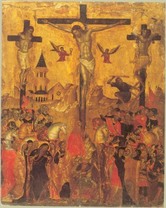
As with all things in this life, we may begin with the material and physical things, but then move onward to the immaterial and spiritual things. If you have been given a job to do, or a particular schedule of shifts to work--accept them. If you have been given certain people as friends and family members--accept them. If you are out of work and been given time to help others or possibly work on a personal project; certain responsibilities that have been asked of you; inspirations to write, or create, to visit someone or call a long time friend--accept them. Whatever your situation in life may be--accept what you have been given. Even to the point if you are given insults and injustice--accept them.
We remember always that the first thing which St. Albert asked of us and that we have done in setting out upon this life is to elect a prior, that we have Christ, or the one he has chosen, as our prior and the One who has given us all that we have been given . . . READ FULL POST
We remember always that the first thing which St. Albert asked of us and that we have done in setting out upon this life is to elect a prior, that we have Christ, or the one he has chosen, as our prior and the One who has given us all that we have been given . . . READ FULL POST
Carmel's Way (adaptations)
Chapter 8: Occupy your home, pt. 1
Occupy where you live, it is the place that you have been given.

The cell is a center of the Carmelite Way of Life. While there are many other ways of living in allegiance to Christ: through missions, evangelization, centered in ministry, this particular Way is founded on silence and solitude, on seeking God and discovering intimate moments with Him in the quietness of prayer. For this, the cell is our center; that it is our daily shelter and retreat where we find God as our close and personal friend. It will be from here that we venture out each day to go forth to serve, to evangelize and to minister to those in need. It is not that in choosing this particular way of life, or to be inspired by its model, that we abandon these things--no one can truly live a life in allegiance to Christ without being with Christ who dwells in the people and also lives in the world beyond our cells and homes. But the cell, silence and solitude from the noise of our daily world, is our enter where we pray in intimate conversation with the One we love; our home is our center, silent from the noise and bustle of daily life were we come to be attentive to those we love, to spend significant time with them, and to give ourselves wholly into it. . . READ FULL POST
Carmel's Way: (adaptations)
Chapter 8: Acceptance pt. 2
Accept what you have been given.

An considering the things that we have been given, as with all things in this life, we may begin with the material and physical things, but then move onward to the immaterial and spiritual things. If you have been given a job to do, or a particular schedule of shifts to work--accept them. If you have been given certain people as friends and family members--accept them. If you are out of work and been given time to help others or possibly work on a personal project; certain responsibilities that have been asked of you; inspirations to write, or create, to visit someone or call a long time friend--accept them. Whatever your situation in life may be--accept what you have been given. Even to the point if you are given insults and injustice--accept them.
We remember always that the first thing which St. Albert asked of us and that we have done in setting out upon this life is to elect a prior, that we have Christ, or the one he has chosen, as our prior and the One who has given us all that we have been given. It is from God that all that exists in our life has come and it is He who wishes and longs for the best things for us . . .READ FULL POST
We remember always that the first thing which St. Albert asked of us and that we have done in setting out upon this life is to elect a prior, that we have Christ, or the one he has chosen, as our prior and the One who has given us all that we have been given. It is from God that all that exists in our life has come and it is He who wishes and longs for the best things for us . . .READ FULL POST
Carmel's Way: (adaptations)
Chapter 8: Acceptance pt. 1
Accept what you have been given.

The Rule tells us that none of the brothers are to accept a cell other than that which has been given to him. If we take this strictly, then we would consider simply that we are to accept and live happily in whatever room we have been given in our house: children should not argue with their parents over which room they have been assigned; if we share a house with roommates, we should gladly accept even the smallest bedroom in the house; and if we are away at college and living in the dorms, we should carry on without complaint, even if we have a snoring roommate who uses the floor as a laundry basket. These things may be a part of what the Rule is attempting to teach us--a humble acceptance of whatever living conditions we have been provided and confidence that God always has us in His care--however, if this were all that it is trying to offer, then that would have little meaning for most of us. . . READ FULL POST
Carmel's Way (desert reflections)
Chapter 8: What the Lord has Given
“None of the brothers is to occupy a cell other than that allotted
to him or to exchange cells with another, without leave of whoever is Prior
at the time.” --The Rule, Chapter 8
to him or to exchange cells with another, without leave of whoever is Prior
at the time.” --The Rule, Chapter 8
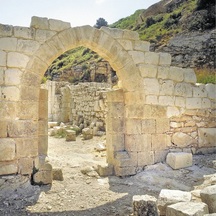
Is there anything more to this chapter behind what it says straightforward? “None of the brothers is to occupy a cell. . .” Sometimes there may really be nothing hidden between the lines, behind the lenses of history, or cloaked in theological mysteries. We might be able to squeeze out some profundity with regard to the relationship of the individual and the community, but I think this is a chapter that is best taken for what it says on the surface; Sometimes simplicity is truly simple, and practical matters are solved quite practically.
In the correspondence that Albert received from the brothers, there likely were some problems of brothers moving cells, or of taking cells from one another. In a place like the Wadi of Carith, it is not hard to imagine that there were some cells and caves that were much nicer, roomier, more comfortable, and choicer than others. Is it hard then to imagine some conflict or maneuvering of the cells? Is it hard to imagine that this is Albert’s way of saying, “Stop it. Accept what you are given and do not use it to abuse your brothers, or to play political games with your brothers, or to set yourself up higher than any one of your brothers. But accept the gifts that God has given to you and live in Peace with one another; and stop bickering over the cell that the Prior has given you.”
In the correspondence that Albert received from the brothers, there likely were some problems of brothers moving cells, or of taking cells from one another. In a place like the Wadi of Carith, it is not hard to imagine that there were some cells and caves that were much nicer, roomier, more comfortable, and choicer than others. Is it hard then to imagine some conflict or maneuvering of the cells? Is it hard to imagine that this is Albert’s way of saying, “Stop it. Accept what you are given and do not use it to abuse your brothers, or to play political games with your brothers, or to set yourself up higher than any one of your brothers. But accept the gifts that God has given to you and live in Peace with one another; and stop bickering over the cell that the Prior has given you.”
A Prayer of Blessing for Families
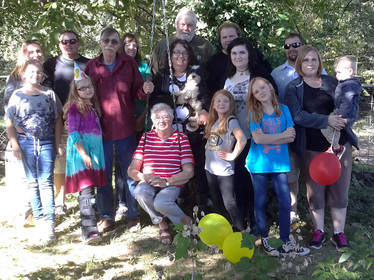
On October 8th, my family celebrated the 85th birthday of my grandmother, Colleen Grosvenor. As I'm away at seminary, I was not able to be there to celebrate, however, my grandma did have the excellent idea of using Skype so that I could share a prayer and special blessing for our family. . .
LORD GOD ALMIGHTY,
To your servant Abraham You promised not simply prosperity for him and Sarah,
but that their descendants would number the stars in the sky
and the sand of the sea;
That if would be through his family that an entire nation would prosper, live long life and enjoy peace so long as they continued to follow Your ways, to honor, love and worship you, our Lord and God;
It would be through his generations that the nations of the world would be delivered.
To Isaac and Jacob you renewed Your promises
And to David you promised that it would be his descendent,
his root and the stump of Jesse, who would reign as King forever
and through whom salvation would come to Your people.
Through the family of Elizabeth and Zacariah, and her cousin Mary, you brought to us the deliverance that you had so long ago promised:
John, the one who would announce and make clear the way to forgiveness and
Christ, our Lord, born to Mary and Joseph
raised in the obedience of a son to mother and father;
He blessed the wedding at Canaa, the foundation for all families
He restored the mother of the disciple to health
And taught us the parable of the Father and his wayward son;
Upon his death, he looked to his mother and said to her, “Behold, your son,” and have called all of us to be brothers and sisters, aunts and uncles
In your name, and through your body and the blood that you shed for us.
Lord God, and Our Father,
We ask this day, in a very special way,
That you bless this family as you have blessed the families of our forefathers and all those who love you.
Bring them into your providential care and the inheritance of life eternal,
Grant them prosperity in your Word and faithfulness to You and to one another;
Hold them in the protection of your Peace;
Give them work for their hands, that they may always have food on their table, a roof over their head, clothes to cover their back and provision to share the generosity of their hearts with others;
Keep them in good health and always in safety;
Shelter them from tragedy and comfort them in grief;
Bless the children and mothers and fathers,
that this family may continue to grow in abundance,
Bring them days of joy and happiness, and lead each of them to Life everlasting.
We ask also that You be with the ones we love who are unable to be here today,
that though distance may separate us from one another, we remain one family united in Christ,
We pray also for those who have died,
in gratitude for the gifts and the life that they have given to this family,
and ask that you grant to them the eternal rest and perpetual light of your Spirit.
This we ask through Christ our Lord, who lives and reigns with you and the Holy Spirit, one God forever and ever -- AMEN
LORD GOD ALMIGHTY,
To your servant Abraham You promised not simply prosperity for him and Sarah,
but that their descendants would number the stars in the sky
and the sand of the sea;
That if would be through his family that an entire nation would prosper, live long life and enjoy peace so long as they continued to follow Your ways, to honor, love and worship you, our Lord and God;
It would be through his generations that the nations of the world would be delivered.
To Isaac and Jacob you renewed Your promises
And to David you promised that it would be his descendent,
his root and the stump of Jesse, who would reign as King forever
and through whom salvation would come to Your people.
Through the family of Elizabeth and Zacariah, and her cousin Mary, you brought to us the deliverance that you had so long ago promised:
John, the one who would announce and make clear the way to forgiveness and
Christ, our Lord, born to Mary and Joseph
raised in the obedience of a son to mother and father;
He blessed the wedding at Canaa, the foundation for all families
He restored the mother of the disciple to health
And taught us the parable of the Father and his wayward son;
Upon his death, he looked to his mother and said to her, “Behold, your son,” and have called all of us to be brothers and sisters, aunts and uncles
In your name, and through your body and the blood that you shed for us.
Lord God, and Our Father,
We ask this day, in a very special way,
That you bless this family as you have blessed the families of our forefathers and all those who love you.
Bring them into your providential care and the inheritance of life eternal,
Grant them prosperity in your Word and faithfulness to You and to one another;
Hold them in the protection of your Peace;
Give them work for their hands, that they may always have food on their table, a roof over their head, clothes to cover their back and provision to share the generosity of their hearts with others;
Keep them in good health and always in safety;
Shelter them from tragedy and comfort them in grief;
Bless the children and mothers and fathers,
that this family may continue to grow in abundance,
Bring them days of joy and happiness, and lead each of them to Life everlasting.
We ask also that You be with the ones we love who are unable to be here today,
that though distance may separate us from one another, we remain one family united in Christ,
We pray also for those who have died,
in gratitude for the gifts and the life that they have given to this family,
and ask that you grant to them the eternal rest and perpetual light of your Spirit.
This we ask through Christ our Lord, who lives and reigns with you and the Holy Spirit, one God forever and ever -- AMEN
Carmel's Way (adaptations)
Dinner Conversation and Reading
Be attentive to the topics of conversation during meals, and throughout the entire day, and listen to readings during meal times, regularly.
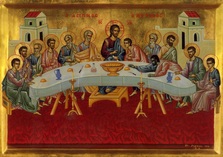
The brothers and sisters of the vowed life are told that they are to maintain silence during their meals and to listen to a reading from scripture or some other holy writing. This practice is fitting as they have chosen a life of silent conversation with God; that in their silence, they do not eat in ignorant emptiness, like a husband and wife who sit across from one another refusing to say a single word, but in listening to God’s word, they enter into a meaningful and substantial conversation with their Beloved; in the silence, the brothers and sisters are sharing in the important events of their day, they ponder over questions that may be spinning in their minds and share what they have learned. Meal times for the brothers and sisters are silent, but active: they are learning together, savoring together, recalling together and join the daily sustenance of life on earth, the regular nutrition of the body, with the sustenance of our soul and life in heaven.
It may be possible that if we look at the meals of the brothers and sisters in this way, not as the empty silence of people who have vowed not to speak to one another, but the dynamic conversation of another and very intentional way, then it is easier to see how we may share in this fruit and what it may offer to us as we sit down to share meals with our friends and families, with co-workers and fellow students, and even when we may be sitting by ourself and outwardly alone. . . READ FULL POST
It may be possible that if we look at the meals of the brothers and sisters in this way, not as the empty silence of people who have vowed not to speak to one another, but the dynamic conversation of another and very intentional way, then it is easier to see how we may share in this fruit and what it may offer to us as we sit down to share meals with our friends and families, with co-workers and fellow students, and even when we may be sitting by ourself and outwardly alone. . . READ FULL POST
Carmel's Way (adaptations)
Chapter 7: A Common Meal
Eat a common meal.

St. Albert instructs the brothers that they are to each live in a separate cell (chapter 6), “However, you are to eat whatever may have been given to you in a common refectory.” This gathering together around a common meal is what makes community and family different from a collection of people with similar interests living in an apartment complex or condominiums. If we sit in our rooms and have our own private meals, we would not see each other very often; or even if we shared a common kitchen and pantry, coming to grab food whenever we felt like eating. A household coming together at regular times is the foundation of unity that builds our relationships with one another and keeps us from so easily drifting away. . . READ FULL POST
Carmel's Way (desert reflections)
Chapter 7: One Common Table
"However, you are to eat whatever may be given you in a common refectory, listening together meanwhile to a reading from Holy Scripture, where that can be done without difficulty."--The Rule, Chapter 7
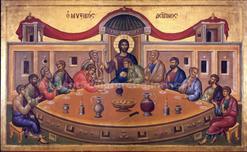
This chapter does seem out of place. What are we to do with the “however,” clause which has absolutely nothing to do with the preceding chapter on the establishment of a “separate cell”? Or, if we take a moment to pause, does it actually relate to the brothers having separate cells? Is the Rule, not St. Albert himself, since this chapter is part of the mitigation that came after the Order’s move to Europe, suggesting that while the brothers are to each have a separate cell, in which they spend most of their time at or in, they are not to eat their meals in their individual cells? Is the Rule, by its placement saying: You will have your own dwelling, ‘however,’ you will come together to join in a common meal, and you will eat common food while listening to the common Word? If so, then is this a profound chapter on the source of unity and understanding of community; that we are brought together at the Table where one meal is served and one Voice proclaimed? ? ? READ FULL POST
Carmel's Way (adaptations)
Chapter 6: For Each a Separate "Cell"
Provide each person a separate “cell” according to the layout and provisions of your home.

It is good for everyone to have a place to lay their head at night. This idea may also conjure up for us memories and visions of the homeless men, women and children who some of us see everyday--and this is a good thing. These images not only serve to remind us of the plight of our brothers and sisters, and of the real hardships that homelessness brings, but they also pull our imaginations and remind us that this Rule is not only meant to serve our private lives and loved ones; in taking up its statues and provisions, we neither seek nor are called to isolate ourselves from the world around us and separate ourselves from their needs out of a selfish desire for our own perfection and spiritual good--as though we could even imagine attaining perfection in such isolation--but it calls us and pushes our awareness to both include and be responsible to all of our brothers and sisters in Christ. We do not say, as many do: “It is your choice, your decisions, or your actions that have caused you to be poor and without a roof over your head.” Nor do we say: “It is your own fault,” and swiftly walk away. Rather, the love of this perfection, of transforming in Love and being transformed into Christ compels us to desire that everyone have a place to rest their head; it compels us to recognize that it does not matter what the situation or cause may be, if it is one’s own actions and choices that causes such great poverty, but that our heart breaks whenever we see such pain on any face, we weep for those who are in mourning and despair, we are called to meet their eyes with compassion and long to tell them that God does not want them to remain in such a place and condition. It does not matter the reason and the cause, He does not wish for any to be sleeping in the rain, or on top of subway vents in order to stay warm, or that it is safer for a teenager to be on the street, than in their own home. This Way of Life, we are to be reminded, is not for us and our comfort, but it is for them and truly for all, that we may be strengthened to have compassion, to show our mercy and to truly love. . . READ FULL POST
Carmel's Way (adaptations)
Chapter 6: A Place of Intimacy
Sleep in a room dedicated to intimacy and holiness.
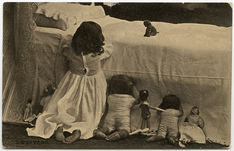
Here may begin some of the provisions of The Rule that seem utterly foreign and alien to day-to-day life outside of the Order: “each one of you is to have a separate cell.” Is it a rule of life that each family member should have his or her own bedroom? Am I suggesting that even parents, not only have separate beds resembling 1950s television shows, but sleep in altogether different rooms? And what of single people who already rent or own a private apartment or home, and are already enjoying a two or three bedroom cell? Is the Rule encouraging us into isolation and a luxurious way of living in grandiose homes and apartments? Rather than taking the Rule according to its literal meaning, let’s take a brief moment to consider what the cell is in the tradition of the monastery and what it provides to the life of the brothers and sisters.
The cell is a basic provision of shelter. It may seem odd to our modern time and culture of wealth that St. Albert would be providing for this most basic need; that he wanted to ensure that each brother had a place to sleep; that some would not be ignored by the prior and be left to simply find their own place to lay down their head. However, within the context of this basic command, he is making provision that the Order would take care of one’s most basic needs so that the brothers would not have to go outside, or beyond the Order as part of the daily struggle for survival
The individual cell, assigned by the prior, is also a sign and measure of equality. . .READ FULL POST
The cell is a basic provision of shelter. It may seem odd to our modern time and culture of wealth that St. Albert would be providing for this most basic need; that he wanted to ensure that each brother had a place to sleep; that some would not be ignored by the prior and be left to simply find their own place to lay down their head. However, within the context of this basic command, he is making provision that the Order would take care of one’s most basic needs so that the brothers would not have to go outside, or beyond the Order as part of the daily struggle for survival
The individual cell, assigned by the prior, is also a sign and measure of equality. . .READ FULL POST
Carmel's Way (desert reflections)
Chapter 6: A Separate Cell
"Next, each one of you is to have a separate cell, situated as the lie of the land you propose to occupy may dictate, and allotted by disposition of the Prior with the agreement of the other brothers, or the mature among them."

We are to each have a “separate” cell. This does not simply mean that we each have an individual room, with individual doors. The cell is not a room, but a place of intimacy, an encounter where we can spend time, not merely sleeping; in retreat from others so that we can watch our tv show or listen to our favorite music; sitting at our writing desk or finding a quiet place to read a book; it is a place where we spend dwelling in union with out Beloved. If we are paying attention, the cell is not even specified to be a single room. Perhaps tradition has interpreted it as such, and that tradition is meaningful, but what is most meaningful is that the cell is a “separate” place where we do not simply go, but in which we live and spend time with God, actively and privately. This quality means two things.
First, we must be able to have that active and participative union with with God. Our cells are not to become private living quarters (or our personal condos as I have heard some brothers describe them). They are to be centers of prayer and must provide sufficient room (i.e. space) and means to engage in this prayer actively.
Second, and more importantly, a “separate” cell means that one is free from outside influences. This does not mean just having its own door, or only one bed to each cell, but that what I am doing in my cell should neither interfere with, nor influence any other brother’s cell. A “separate” cell includes the separation of sounds, that our cells have sufficient room between them, or that the walls at least are built to provide privacy. One brother not only should be able to pray vocally and aloud (i.e. actively), without worry over disturbing his neighbor, but should always have the cell as a place of silence. The cell must always be that one place to which we may go in order to find the silence and preserve the undying unity and intimacy with our Beloved.
It is understandable that there are limits to what can be done to insulate rooms in a house, and to what is possible in a given house; this is given and understood in the Rule, that the cells be situated as the “lie of the land” dictates. For some houses it is essentially impossible to grant each brother a cell that is fully separate from the others. When this is the case, it remains that our attention should remain on putting forth every effort to create a “separation” between the cells and that this “separation” includes much more than merely granting individual rooms.
First, we must be able to have that active and participative union with with God. Our cells are not to become private living quarters (or our personal condos as I have heard some brothers describe them). They are to be centers of prayer and must provide sufficient room (i.e. space) and means to engage in this prayer actively.
Second, and more importantly, a “separate” cell means that one is free from outside influences. This does not mean just having its own door, or only one bed to each cell, but that what I am doing in my cell should neither interfere with, nor influence any other brother’s cell. A “separate” cell includes the separation of sounds, that our cells have sufficient room between them, or that the walls at least are built to provide privacy. One brother not only should be able to pray vocally and aloud (i.e. actively), without worry over disturbing his neighbor, but should always have the cell as a place of silence. The cell must always be that one place to which we may go in order to find the silence and preserve the undying unity and intimacy with our Beloved.
It is understandable that there are limits to what can be done to insulate rooms in a house, and to what is possible in a given house; this is given and understood in the Rule, that the cells be situated as the “lie of the land” dictates. For some houses it is essentially impossible to grant each brother a cell that is fully separate from the others. When this is the case, it remains that our attention should remain on putting forth every effort to create a “separation” between the cells and that this “separation” includes much more than merely granting individual rooms.
Carmel's Way (adaptations)
Chapter 5: Silence and Solitude
Designate and maintain a solitary place.
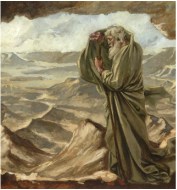
God said to Elijah, “Go outside and stand on the mountain before the LORD; the LORD will be passing by . . .” and when he heard a tiny whispering sound, “Elijah hid his face in his cloak and went and stood at the entrance to the cave.”
If there is one thing that we can say is unique to the Carmelite way of life and essential to this particular way of life in allegiance to Christ, it is the practice and time spent in solitude and silence. It is not, as some may be confused and believe, the meditative silence we seek in order to calm the soul and give respite from an increasingly loud and noisy world; nor is it merely an inner calm and inner silence that we seek while commuting on the train each morning, surrounded by the din of factory machinery or the bustle of demanding customers and clients; rather, it is in the silence and intimacy of solitude that we find God, that we come face-to-face with our Creator without distraction and we stand before Him as a dear friend, His attention raptured on us, just as we are enraptured by Him; it was in that very moment as Elijah hid in the cave that he encountered the One he loved, that he heard the tiny whisper of his lover’s call, once drowned by the sound of a roaring wind, buried under the rumble of an earthquake and overwhelmed by raging fire. In the stillness, the loneliness--a truly holy loneliness--and solitude that was free from all other voices, from distractions and chatter of day-to-day concerns, Elijah’s ears were free to hear and listen to no other but the LORD alone. And so, at the sound of his lover’s call, he approached to the mouth of the cave with timidity and gentleness. . . READ FULL POST
If there is one thing that we can say is unique to the Carmelite way of life and essential to this particular way of life in allegiance to Christ, it is the practice and time spent in solitude and silence. It is not, as some may be confused and believe, the meditative silence we seek in order to calm the soul and give respite from an increasingly loud and noisy world; nor is it merely an inner calm and inner silence that we seek while commuting on the train each morning, surrounded by the din of factory machinery or the bustle of demanding customers and clients; rather, it is in the silence and intimacy of solitude that we find God, that we come face-to-face with our Creator without distraction and we stand before Him as a dear friend, His attention raptured on us, just as we are enraptured by Him; it was in that very moment as Elijah hid in the cave that he encountered the One he loved, that he heard the tiny whisper of his lover’s call, once drowned by the sound of a roaring wind, buried under the rumble of an earthquake and overwhelmed by raging fire. In the stillness, the loneliness--a truly holy loneliness--and solitude that was free from all other voices, from distractions and chatter of day-to-day concerns, Elijah’s ears were free to hear and listen to no other but the LORD alone. And so, at the sound of his lover’s call, he approached to the mouth of the cave with timidity and gentleness. . . READ FULL POST
Interlude
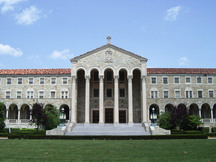
I am on the move to Cincinnati this week where I will continue my seminary studies at the Athenaeum, Mount St. Mary's. In order to ficus on this new phase in life I will not be able to post new articles for the next couple of weeks. In the mean time, please look around the site and feel free to visit some of the earlier posts. To make it easier, here are a couple of links to the archives:
GOD AND WASHINGTON: an introduction to Catholic Social Teaching on faith and politics (perfectly timed for the election season).
CARMEL'S WAY: living the Carmelite Way of Life in the 21st Century.
God Bless, and thanks for your continued support.
Kendall
GOD AND WASHINGTON: an introduction to Catholic Social Teaching on faith and politics (perfectly timed for the election season).
CARMEL'S WAY: living the Carmelite Way of Life in the 21st Century.
God Bless, and thanks for your continued support.
Kendall
Carmel's Way (adaptations)
Chapter 5: A Suitable Place (pt. 2)
More than a Physical Place
Accept places that are “suitable and convenient” to the observation of your Christian faith and Way of Life
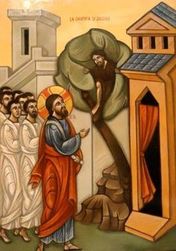
In considering "suitable places", we should consider also that places means far more than the physical places where we live and worship. From the fourth century, we have a document called the Apostolic Tradition of Hippolitus. In this document, which describes the initiation ceremonies of the Church in Rome, there is a list of professions that Christians are prohibited from holding: “If someone is a sculptor or a painter, let them be taught not to make idols. Either let them cease or let them be rejected. If someone is an actor or does shows in the theater, either he shall cease or he shall be rejected...” The list continues to include certain public officials, one who wants to become a soldier, astrologers, diviners and even includes an admonition that one who teaches children should cease. What this list tells us is not that it is immoral for a person to be a teacher, a solider, or to hold certain public offices, but that the Church recognized that there are certain professions and kinds of work that by their very nature, require one to do things that are indelibly opposed to the life of a Christian. . . READ FULL POST
Carmel's Way (adaptations)
Chapter 5: Places Suitable to Your Faith
Accept places that are “suitable and convenient” to the observation of your Christian faith and Way of Life
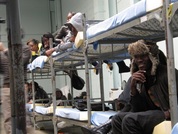
Each of us, regardless of what our goals may be, what we want to get out of life, or what we may want to accomplish, needs to pay attention to our environment, to the people with whom we spend our time, the activities we spend our time doing, and whatever other influences which may be surrounding us. At its core, this chapter of the Rule is telling us nothing more than this: that we be attentive to these things that surround us and judge them according to how they influence and affect the life in Christ that we desire to live.
The first thing that we think about when considering places that are “suitable and convenient” to the observation of our Christian faith is the place where we live. Many of us, it must be recognized, do not have as much freedom to actually choose where we live as we, or others seem to often think. Whether it is a commitment to a job, the closeness of our family, our economic situation or even the cultural environment that we enjoy, one can’t simply say that we should all find a good house that is located in a good neighborhood to only live in places surrounded by other Christians and which offer quietness, silence and presence of nature that support this Carmelite Way of Life. It is simply not practical for families, priests and others living outside of the Order to hold the same standard of accepting “suitable” places which we should expect from the Order itself. We also know that a life lived in allegiance to Christ is not reserved to those with the financial resources to pick and choose exactly where they want to live, or who are fortunate enough to be born in such a place. Christ is found in every neighborhood; in the cities, in suburbia and across rural America; in high-rise apartment complexes, student dormitories and isolated farmhouses; He is found in homeless camps, in ghettos, ganglands, in the shacks of Appalacia and even in the penthouses of Manhattan and mansions of Beverly Hills. What we should bear in mind are two things. . .READ FULL POST
The first thing that we think about when considering places that are “suitable and convenient” to the observation of our Christian faith is the place where we live. Many of us, it must be recognized, do not have as much freedom to actually choose where we live as we, or others seem to often think. Whether it is a commitment to a job, the closeness of our family, our economic situation or even the cultural environment that we enjoy, one can’t simply say that we should all find a good house that is located in a good neighborhood to only live in places surrounded by other Christians and which offer quietness, silence and presence of nature that support this Carmelite Way of Life. It is simply not practical for families, priests and others living outside of the Order to hold the same standard of accepting “suitable” places which we should expect from the Order itself. We also know that a life lived in allegiance to Christ is not reserved to those with the financial resources to pick and choose exactly where they want to live, or who are fortunate enough to be born in such a place. Christ is found in every neighborhood; in the cities, in suburbia and across rural America; in high-rise apartment complexes, student dormitories and isolated farmhouses; He is found in homeless camps, in ghettos, ganglands, in the shacks of Appalacia and even in the penthouses of Manhattan and mansions of Beverly Hills. What we should bear in mind are two things. . .READ FULL POST
Carmel's Way (desert reflections)
Chapter 5: Suitable Foundations
"If the Prior and brothers see fit, you may have foundations in solitary places, or where you are given a site that is suitable and convenient for the observance proper to your Order."

This chapter is a later addition to the Rule under the mitigation by Pope Innocent III. As I have heard numerous times, it was added in order to allow Carmelites to accept a gift of land and/or house that often came with an invitation for the friars to begin a house. This way of acquiring property can also be a very mendicant way of living--not for the Order to decide on property to purchase, but to live and minister according to the gifts that are received. While this appears to be a very faith-filled way of responding to God's calls and the call of the needs of God's people, there is a very dangerous side to accepting land for foundations wherever they may be given, especially for an Order of hermit friars, moving from the seclusion of Mt. Carmel into European cities. The Rule accounts for this danger, but it can seem as though our practice has often ignored its warnings. . .READ FULL POST
A Happy Announcement
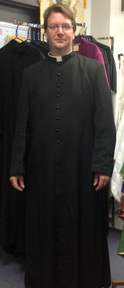
Dear Friends,
It was just about a year ago when I made the difficult decision to leave the Order of Carmelites. While I never questioned my vocation to serve the Catholic Church and desire to live a life consecrated to Christ, it had become clear that I was not going to be able to live out my call within the Order of Carmelites. Since then, as many of you have been aware, I have been living with my mom and her husband while I continued discerning with different diocese and the ways that I could continue following my call to the ordained priesthood.
It is with a tremendous amount of excitement and gratitude that I can now share with you that I have been accepted into the formation program with the Diocese of Kansas City-St. Joseph and will be returning to studies at the seminary of Mt. St. Mary’s in Cincinnati in the next few weeks. While this has already been a long and winding road, there is no question that is by God’s Good and Divine Grace that I have been counted to join the Diocese in Kansas City and to be part of a diocese that is remaining strong and committed to sharing the long-standing faith of the Catholic Church and share Christ’s light to a world that seems to be in ever increasing need. Without wading into any particular political statements, it is fair to say that recent events, and especially our current presidential election, shows us the dire need for the compassion, wisdom, faith and peace of Christ.
I ask that you keep me in your prayers that I may continue with the strength and devotion to serve God’s people faithfully, as I will continue to keep you in my daily prayers. I will continue to keep the website updated regularly. Lastly, if you are able, please consider purchasing one of the books I’ve written or published, either through this site or Amazon, as a help in covering my seminary experiences.
With Christ’s Peace and guidance of our Lady,
Kendall
It was just about a year ago when I made the difficult decision to leave the Order of Carmelites. While I never questioned my vocation to serve the Catholic Church and desire to live a life consecrated to Christ, it had become clear that I was not going to be able to live out my call within the Order of Carmelites. Since then, as many of you have been aware, I have been living with my mom and her husband while I continued discerning with different diocese and the ways that I could continue following my call to the ordained priesthood.
It is with a tremendous amount of excitement and gratitude that I can now share with you that I have been accepted into the formation program with the Diocese of Kansas City-St. Joseph and will be returning to studies at the seminary of Mt. St. Mary’s in Cincinnati in the next few weeks. While this has already been a long and winding road, there is no question that is by God’s Good and Divine Grace that I have been counted to join the Diocese in Kansas City and to be part of a diocese that is remaining strong and committed to sharing the long-standing faith of the Catholic Church and share Christ’s light to a world that seems to be in ever increasing need. Without wading into any particular political statements, it is fair to say that recent events, and especially our current presidential election, shows us the dire need for the compassion, wisdom, faith and peace of Christ.
I ask that you keep me in your prayers that I may continue with the strength and devotion to serve God’s people faithfully, as I will continue to keep you in my daily prayers. I will continue to keep the website updated regularly. Lastly, if you are able, please consider purchasing one of the books I’ve written or published, either through this site or Amazon, as a help in covering my seminary experiences.
With Christ’s Peace and guidance of our Lady,
Kendall
Carmel's Way (adaptations)
Chapter 4: Renunciation of Ownership (pt. 2: the Spiritual benefits)
Live according to the Way of obedience, chastity and the renunciation of ownership.

The renunciation of ownership teaches us humility by placing the needs of others ahead of our own. If we no longer claim ownership of things, then it is harder to grow prideful and believe that we deserve them more than others. It teaches us patience. It is hard to grow angry over things that we do not see as “our own,” or rather, it is far too easy to be hurt and upset over things that we have laid claimed to. If someone criticizes our job, our opinions, or even our clothing, it can truly hurt deeply and more quickly motivate us to anger. Yet we also know that these things are not who we are—I am not the sum of either my wardrobe or my latest joke which no one laughed at. By renouncing ownership, we acknowledge this and are less hurt. If I no longer take possession of my job, or of my time writing, then I become more patient with interruptions and more attentive to other things that may need my attention. We learn patience too because there will be times when we want, or think that we need something, and it is not available to us—and so also we progress in the detachment from things and become less dependent on them. We grow in solidarity as we see things less often as mine, we are forced to work in cooperation with others more often and we gain the first hand experience and understanding of what it is like to have to go without at times. The renunciation of ownership increases our compassion . . . READ FULL POST
Carmel's Way (adaptations)
Chapter 4: Renunciation of Ownership
Live according to the Way of obedience, chastity and the renunciation of ownership.
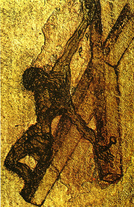
Although it is a common perception, the renunciation of ownership should not be confused with a vow of poverty; the renunciation of ownership is not the commitment to live a life of simplicity, to go hungry, to wear a lower quality of clothing, to live without money in savings or to use broken-down, second-hand things. The renunciation of ownership does not require one to live on the edge of financial security; it is not the voluntary decision to go without meeting one’s daily needs; it is not to be homeless, to have access to lower education or less access to basic health care. The renunciation of ownership is not a condition of life that for some is involuntary, brought on by the environment of a surrounding neighborhood, sudden and unplanned unemployment, serious medical conditions, or debilitating family situations. Rather, the renunciation of ownership, like the other vows, is a disposition of the heart: to renounce pressing an exclusive claim of use, of authority, or of belonging over any thing. By renouncing the ownership of things, we do not deprive ourselves of wants and needs, but transform and shape ourselves so that we want and need fewer things; that we don’t simply become more satisfied with less, but have our eyes trained toward the love of others and the truly valuable things in heaven . . . READ FULL POST
Carmel's Way (adaptations)
Chapter 4: A Chaste Love
Live according to the Way of obedience, chastity and the renunciation of ownership.

Chastity is not celibacy. To be sure, brothers and sisters in the Order do profess a vow of celibacy, this is according to Church law and the nature of their consecrated life, married to Christ. However, it is equally important to note that the Rule calls one to a life of chastity and a chaste way of love that all of us, whether married, single, adult or child, can live.
In the shortest terms possible, to love chastely is to love as God Loves and this is the Way of Perfection, the Way that leads us to love more perfectly and to be in love perfectly. If obedience is the beginning and the first step in this life, then chastity is its end, that we are not yet capable of loving so perfectly, but by fasting, prayer and alms giving we are transformed and grow in our ability to love others. Chastity, to love as God Loves, without any self-interest or gain, is our purpose and our goal. . . READ FULL POST
In the shortest terms possible, to love chastely is to love as God Loves and this is the Way of Perfection, the Way that leads us to love more perfectly and to be in love perfectly. If obedience is the beginning and the first step in this life, then chastity is its end, that we are not yet capable of loving so perfectly, but by fasting, prayer and alms giving we are transformed and grow in our ability to love others. Chastity, to love as God Loves, without any self-interest or gain, is our purpose and our goal. . . READ FULL POST
Carmel's Way (adaptations)
Chapter 4: Obedience pt. 2
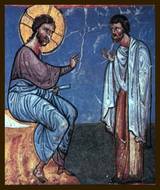
In the last post, we began looking at the place that the traditional vows of the Religious (obedience, chastity and the renunciation of ownership) have in the daily life of our Christian faith. These dispositions, as many are tempted to believe, are not vows reserved for men and women in religious orders, but are the cornerstones of the Christian life and anyone who longs to live a life in allegiance to Christ. I began by looking first at the place and importance of Obedience. Below is the second part to this article, exploring a little more into what this disposition of holy Obedience is and the virtues that it helps to build in one's life.
At the surface, obedience is simply doing what is asked of you, without challenging or debating, but in a joyful and grateful way. But as in all things, we know that there is much more lying beneath the surface and apparent simplicity. To be obedient is to place yourself into the care of another. Not only believing that they will not over burden, take advantage of, or demand too much from you, but that they will take care of your interest, provide for your needs and promote your own good as a coach may train and foster an athlete to both improve one’s self and the team’s performance. . . READ FULL POST
At the surface, obedience is simply doing what is asked of you, without challenging or debating, but in a joyful and grateful way. But as in all things, we know that there is much more lying beneath the surface and apparent simplicity. To be obedient is to place yourself into the care of another. Not only believing that they will not over burden, take advantage of, or demand too much from you, but that they will take care of your interest, provide for your needs and promote your own good as a coach may train and foster an athlete to both improve one’s self and the team’s performance. . . READ FULL POST
Carmel's Way (adaptations)
Chapter 4: Dispositions of Life
Live according to the Way of obedience, chastity and the renunciation of ownership.

An entire book can be written about each of these dispositions of the vowed life: obedience, chastity and the renunciation of ownership. Each of these books could then be followed by a complete series on how we may adopt such attitudes and adapt them to every day life outside of a religious Order. Here, I will attempt to write briefly, and perhaps write these books later or leave them for someone wiser and more eloquent than myself, setting the stage and foundation for you to see how they may be applied and incorporated into your own life. My hope is that you may begin to see that these are not vows and dispositions that have been reserved to members of religious orders alone, but their very presence in the orders comes from a most basic observation that they are essential to the Christian way of life and should, in fact, be central to the life of anyone who longs and strives to live a life in allegiance to Christ. . . READ FULL POST
Carmel's Way (adaptations)
Chapter 4: A Prior for Daily Life
Recognize the prior of your home, promising obedience.
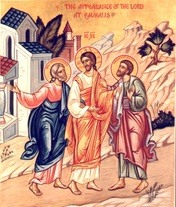
In the fourth chapter, St. Albert directs the brothers and sisters of the Order to elect a prior from within their midst. His intention is simple and quite basic, and has nothing to do with democracy and governance, as some today are hasty to point toward. They would describe the Rule itself as a radical document of democratic ideals, written six centuries prior to the revolutions that swept the Americas and Europe. They would also like to reduce this move by the Patriarch to an ordinary act of practical management. The loose band of brothers gathered around the Spring on Mount Carmel needed to be brought together and organized under a single leadership in order to facilitate the living of a common life and create a structure for order. These are the ways of thinking in the democratic age of the 21st Century; it is the way of thinking of a corporate mind that concentrates on management structures and methods. But St. Albert did not come from this time and our age of thinking. . . READ FULL POST
Carmel's Way (desert reflections)
Chapter 4: The First Thing
"The first thing I require is for you to have a prior, one of yourselves, who is to be chosen for the office by common consent, or that of the greater and maturer part of you; each of the others must promise him obedience--of which, once promised, he must try to make his deeds the true reflection--
and also chastity and the renunciation of ownership." --The Rule, Chapter 4
and also chastity and the renunciation of ownership." --The Rule, Chapter 4
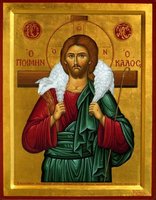
Does it mean something that the 'First' thing Albert requires of the hermits on Mt. Carmel is to have a prior? In some ways, it may seem to us today to be a natural starting part: Organize yourselves into group first with at least some basic structure around a common cause (i.e. "to live in allegiance with Jesus Christ") and then proceed to make rules and discern the day-to-day means of life. However, this first step is not necessarily so basic. Why was building a chapel as a place to come together for Mass each morning not the first thing that Albert required? or the designation of individual cells? or the pledge of allegiance to Jesus Christ? We might consider that Albert did not even include the vows of chastity and poverty in his letter of the Rule, but this was a very common practice for eastern monastics because these vows were widely assumed and there was no need to specifically mention them. There remained, however many other questions and options within Albert's grasp. The selection (not necessarily election) of a prior was not a basic or self-evident choice. His choice of choosing a prior first and before all other requisites is meaningful. . . READ FULL POST
Carmel's Way
Desert Reflections and Adaptations
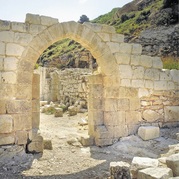
It has been a few months since I posted the introduction to this series of articles and in which I explained both the inspiration for the series, and the difference between the two parts: Desert Reflections and Adaptations. Rather than simply reposting, or inviting people to revisit the introduction (which you can read by clicking here) I have been thinking that it would be worthwhile to say a few things about the Desert Reflections that will help in your reading.
This project began a little more than two years ago, although at the time, I was not thinking about a long term project of any kind, nor about posting them on a regular website. I was a novice with the Carmelites, and it began as a Lenten meditation. Each morning I would read a chapter of the Rule and allow it to roll around in my thoughts throughout the day, and at some point, when it ‘felt right’, I would sit down and write about how the Rule struck me, what it meant for my life as a Carmelite and the life of the Order itself. Desert Reflections is the collection of this journal . . . READ FULL POST
This project began a little more than two years ago, although at the time, I was not thinking about a long term project of any kind, nor about posting them on a regular website. I was a novice with the Carmelites, and it began as a Lenten meditation. Each morning I would read a chapter of the Rule and allow it to roll around in my thoughts throughout the day, and at some point, when it ‘felt right’, I would sit down and write about how the Rule struck me, what it meant for my life as a Carmelite and the life of the Order itself. Desert Reflections is the collection of this journal . . . READ FULL POST
Prayer for Memorial Day
Dearest Father,
Today we remember those who have given their life
for the good of this nation;
Our brothers and sisters who left their homes, their friends
and many their families
for the work of defending the freedom of this land,
to protect the freedom to believe in Your name,
to fight for the life of their neighbors,
to stand against evil and the destruction of life,
to rescue the innocent from torture and despair,
to search for those who have been lost, or kidnapped from their homes,
to struggle to release prisoners from captivity,
and bear witness against all kinds of violence against the human soul;
Some fought in success,
some in failure,
Some for the love of a stranger,
for the protection of the life You created,
and the liberty that You bestowed on Creation
and have dreamed for Your children;
That though we may do wrong,
that we may fall short and choose poorly,
that we may grow victim to our anger, greed, be consumed by power,
and although we may commit great atrocities against one another,
It is the free soul that you love most
and in freedom have given us this choice of love and compassion,
And the sacrifice that these servants, who we remember today,
have given with the very life of their blood;
In giving their life they entered into the mystery of Your sacrifice:
The sacred and holy lamb given to the slaughter,
not for their sins, but for the iniquities of others,
not for their failures and shortcomings,
but for their love
in the very way that you Loved us;
Their lives given for the good of strangers,
has entered them into the eternal sacrifice
And so they hang on the cross with You,
As they also have risen in Your resurrection;
Dearest Father,
Today we remember and pray for all those who have died
for the defense, protection and in the name of this nation;
Be with them in eternal Grace,
Grant to their families and all those who loved them the perfect Peace of your Spirit,
Give forgiveness to all those who have died in battle,
either for a just cause, or even for the unjust,
that You free their soul from the corruption of death
and the chains of sin that hold us in captivity;
That having left this world in chains,
they may be free to worship You in truth;
And grant our hearts healing from any anger, animosity or hatred
that we may yet harbor for those who have wronged us,
Defend us from all harm and oppression,
from all those who seek our life because of Your name,
and especially today for those martyrs who are giving their lives
and facing great persecution for the sake of your name and love of Christ;
Protect them in your Spirit and grant them defenders to keep them safe;
Send your Spirit of safe-keeping over all who fight in the name of righteousness;
Most of all, we pray for the day of your coming and that day
when no more are called to war,
when swords and guns lay eternally at rest,
when the trumpets sound the charge no longer,
when no more shall die from the hands of battle,
and no life need be given for the love and protection of another.
Lord, this we pray. . .
GRANT US YOUR PEACE--AMEN
Today we remember those who have given their life
for the good of this nation;
Our brothers and sisters who left their homes, their friends
and many their families
for the work of defending the freedom of this land,
to protect the freedom to believe in Your name,
to fight for the life of their neighbors,
to stand against evil and the destruction of life,
to rescue the innocent from torture and despair,
to search for those who have been lost, or kidnapped from their homes,
to struggle to release prisoners from captivity,
and bear witness against all kinds of violence against the human soul;
Some fought in success,
some in failure,
Some for the love of a stranger,
for the protection of the life You created,
and the liberty that You bestowed on Creation
and have dreamed for Your children;
That though we may do wrong,
that we may fall short and choose poorly,
that we may grow victim to our anger, greed, be consumed by power,
and although we may commit great atrocities against one another,
It is the free soul that you love most
and in freedom have given us this choice of love and compassion,
And the sacrifice that these servants, who we remember today,
have given with the very life of their blood;
In giving their life they entered into the mystery of Your sacrifice:
The sacred and holy lamb given to the slaughter,
not for their sins, but for the iniquities of others,
not for their failures and shortcomings,
but for their love
in the very way that you Loved us;
Their lives given for the good of strangers,
has entered them into the eternal sacrifice
And so they hang on the cross with You,
As they also have risen in Your resurrection;
Dearest Father,
Today we remember and pray for all those who have died
for the defense, protection and in the name of this nation;
Be with them in eternal Grace,
Grant to their families and all those who loved them the perfect Peace of your Spirit,
Give forgiveness to all those who have died in battle,
either for a just cause, or even for the unjust,
that You free their soul from the corruption of death
and the chains of sin that hold us in captivity;
That having left this world in chains,
they may be free to worship You in truth;
And grant our hearts healing from any anger, animosity or hatred
that we may yet harbor for those who have wronged us,
Defend us from all harm and oppression,
from all those who seek our life because of Your name,
and especially today for those martyrs who are giving their lives
and facing great persecution for the sake of your name and love of Christ;
Protect them in your Spirit and grant them defenders to keep them safe;
Send your Spirit of safe-keeping over all who fight in the name of righteousness;
Most of all, we pray for the day of your coming and that day
when no more are called to war,
when swords and guns lay eternally at rest,
when the trumpets sound the charge no longer,
when no more shall die from the hands of battle,
and no life need be given for the love and protection of another.
Lord, this we pray. . .
GRANT US YOUR PEACE--AMEN
Carmel's Way (adaptations)
Chapter 3: Hold fast and be Encouraged
Hold fast to the Rule, and to the faith of the Church, and to the teachings of our Lord Jesus Christ.
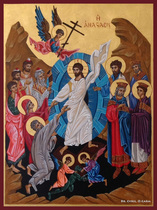
Perhaps there is little more to be said than beyond offering this encouragement: Hold fast to the Rule, and to the faith of the Church, and to the teachings of our Lord Jesus Christ. This life is filled with times of struggles, uncertainty and weariness. There are times when we, and our faith, are being tested. At others, we are being challenged and feel the pangs of growth, of the Lord transforming us into a more clear and life-like image of his very own likeness--this is the Dark Night and Ascent of Mt. Carmel that John of the Cross has described for us; that journey and way along the slopes of perfection that can be long and arduous at times, but as we know from our daily life and the normal way of things, significant rewards require significant work and investment. And as a good friend reminded me in one of my darker hours: “No cross, no Crown.” That the rewards of heaven and the fruit of a life of perfection come through such times of toil and hardship. Not even the Son of God could escape this mystery of things: “Father, I pray that if possible, take this cup from me...but only that your will is done”; even he, the one who himself conquered death and was raised by his own power, could not have been raised the King of Heaven without such suffering; that the Son of Man, to be raised in Glory, was to be handed over, tortured, abused, mocked and sacrificed for our sins. . . READ FULL POST
Carmel's Way (adaptations)
Chapter 3: An Avowed Purpose
Live with an avowed purpose.
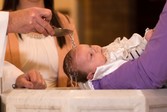
A rich man came to the Lord and said, “Master, I follow the law in every way and listen to every word of your teaching. What further must I do to inherit eternal life?” And the Lord said in reply, “Go and sell everything that you own and give it to the poor, the hungry and those in need. Then return to me and you shall inherit the Kingdom.”
In another place, our Lord also tells the story of a man who had been possessed by a demon, but the demon had been expelled from this man and sent away. While he was away, the demon scoured the countryside, finding more demons who joined him. One day, this demon saw the man walking in a field, and finding this man’s heart still empty, the demon entered him again with the many other demons that he had gathered with him. And so the man, having once been possessed by a single demon, was now worse than he had been before.
Live with an avowed purpose. Rather than an actual prescription that St. Albert suggests for us, he is making a basic and very practical observation about our human nature and a fundamental need. We are very passionate creatures. . . READ FULL POST
In another place, our Lord also tells the story of a man who had been possessed by a demon, but the demon had been expelled from this man and sent away. While he was away, the demon scoured the countryside, finding more demons who joined him. One day, this demon saw the man walking in a field, and finding this man’s heart still empty, the demon entered him again with the many other demons that he had gathered with him. And so the man, having once been possessed by a single demon, was now worse than he had been before.
Live with an avowed purpose. Rather than an actual prescription that St. Albert suggests for us, he is making a basic and very practical observation about our human nature and a fundamental need. We are very passionate creatures. . . READ FULL POST
Carmel's Way (desert reflections)
Chapter 3: A Deliberate Choice
"It is to me, however, that you have come for a rule of life in keeping with your avowed purpose, a rule you may hold fast to henceforward; and therefore:" --The Rule, Chapter 3
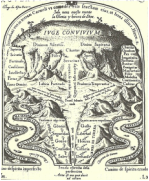
It seems as though there may be little to say about this chapter, and not much that could be profound. Here, seems to be a legalistic clause; a chapter that needs to be included for the sake of inclusion and not for any significant purpose in itself. It can appear that Albert is simply saying: "You asked me for a Rule, a way of life. Here it is. Follow it." Yet, if we keep in mind what he has already written, there may be a few nuggets of treasure even here.
"Many and varied are the ways..." but "it is to me, however, that you have come..."
Albert has recognized that the hermits on Mt. Carmel had an endless number of options of people and traditions to turn toward in establishing their way of life. They could have even turned toward one the "saintly forefathers," using their wisdom and foundation to perhaps draft a Rule for the brothers, or even to the small gathering of Eastern monks who lived nearby. Yet, turning to one of the others is not what the hermits of Mt. Carmel did. . . READ FULL POST
"Many and varied are the ways..." but "it is to me, however, that you have come..."
Albert has recognized that the hermits on Mt. Carmel had an endless number of options of people and traditions to turn toward in establishing their way of life. They could have even turned toward one the "saintly forefathers," using their wisdom and foundation to perhaps draft a Rule for the brothers, or even to the small gathering of Eastern monks who lived nearby. Yet, turning to one of the others is not what the hermits of Mt. Carmel did. . . READ FULL POST
Carmel's Way (adaptations)
Chapter 2: A Rule for all Manners of Life
Accept the Rule according to and regardless of your station and place in life.

We can neither forget, nor overlook, a basic principle that to reap the full harvest of the Rule, one needs to profess the vowed life as a brother or sister in the Order. What St. Albert has written are prescriptions for a Way of Life that if lived in its fullest capacity, results in one taking on the burdens and obligations of consecrated life, and the Order, so long as it remains true and loyal to this consecration, exists for the purpose of helping and aiding the brothers and sisters in living out this life. That we can neither forget nor overlook this basic principle does not mean, however, that those living outside the Order cannot also live a life in allegiance to Christ and glean from the wisdom and ways provided by this Rule, and so also, in varying degrees and measures, also experience the rewards and fruit of Carmel; all who love Christ, regardless of their station or place in life, can taste of the fruit of perfection. There will be some outside of the Order, who experience this perfection and love of Christ more than many inside the Order. . . READ FULL POST
Carmel's Way (adaptations)
Chapter 2: Converse with the Saints
Read the works of our saintly forebears.
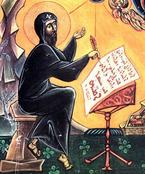
One of the greatest gifts I have experienced in my Catholic faith is the knowledge and understanding that we are not alone in this journey. I am not referring merely to our friends, family and people I see gathered each week around the altar; nor am I referring to the words of a good friend, who although separated by an ocean, often says “good-bye” with the words, “See you at the altar.” There is one Body in Christ, and this Body is not merely some institutional union of a worldwide organization, nor is it simply an invisible spiritual union for us to imagine that all believers in Christ share a common belief, heritage, and inheritance. Through the Eucharist, this Body becomes truly a singular body of the faithful, bound in ways that go beyond our shared humanity: that we walk together, hand-in-hand, fully participating in the work of salvation. In this body, we experience the moments of crucifixion, of Peter’s denial and the betrayal of Judas; along with the joy of the women at the emptied tomb, the cleansing of forgiveness and sanctifying Grace of baptism. . . READ FULL POST
Carmel's Way (desert reflections)
Chapter 2: Pilgrims of Heart and Conscience
"Many and varied are the ways in which our saintly forefathers laid down how everyone,
whatever his station or the kind of religious observance he has chosen, should live a life of
allegiance to Jesus Christ--how, pure in heart and stout in conscience, he must be unswerving
in the service of his Master." --The Rule, Chapter 2
whatever his station or the kind of religious observance he has chosen, should live a life of
allegiance to Jesus Christ--how, pure in heart and stout in conscience, he must be unswerving
in the service of his Master." --The Rule, Chapter 2
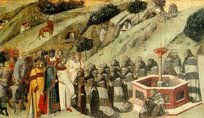
There are several very important and highly meaningful things in this chapter. "Many and varied" recognizes that there are many traditions and ways of living in Christ. This is not to suggest that many and varied are the religions of the world and that each of these religions are equally true and untrue, but "Many and varied" are the ways of living daily in Christ such that there is not one single tradition or standard way of living as a good Christian (to live in Christ remains essential); "everyone, whatever his station" is called to receive the Lord, just as he called tax collectors, dined with Pharisees, healed the families of Roman soldiers, touched the leprous, opened the ears of the dumb and welcomed his betrayer with a kiss.
Everyone receives the Love and Forgiveness of the Lord. It is not a life that is reserved for a few of the Holy or the elite in knowledge and stature. I can truly see Albert writing here to a varied group of pilgrims gathered at the Spring, pilgrims from France, from England, the son of a wealthy land noble paying the debt of his father's sins, a father whose children had died from fever with nothing left but a faithful march to the Holy Land, and even a local or two born in Palestine and seeking refuge from the fount. READ FULL POST
Everyone receives the Love and Forgiveness of the Lord. It is not a life that is reserved for a few of the Holy or the elite in knowledge and stature. I can truly see Albert writing here to a varied group of pilgrims gathered at the Spring, pilgrims from France, from England, the son of a wealthy land noble paying the debt of his father's sins, a father whose children had died from fever with nothing left but a faithful march to the Holy Land, and even a local or two born in Palestine and seeking refuge from the fount. READ FULL POST
Called to Marriage pt. 2
Being Human
That we are all called to marriage tells us about two very important things. The first is about who we are and an essential part of what it means to be human, and the second is about God, who He is and His plans for us.
That every person is called to marriage, to the union that was described for us in Genesis through Adam and Eve, reveals some very important aspects of our humanity and what it truly means to be human. We find completion and fulfillment in another. To be human means that we do not find our fulfillment and completion within ourselves; we are not and are never our own suitable companion and help-mate (help-mate being not mere a helper, but also and simultaneously the one whom we equally help); we could never be truly content and become fully human if left alone.
This reality is even more pertinent and meaningful to our society and culture today, that particularly in the United States we like to promote our independence as an individual, our rights to self-determination and freedom from interference by others and individual fulfillment by pursuing what we personally want, improving our personal talents, embracing our unique personality and fulfilling our personal dreams and ambitions. In contrast to these cultural and popular norms, our universal call to marriage suggest for us, and actually warns us outright, is that no matter what we do and accomplish, no matter what we acquire or to what grand heights of success we ascend in our chosen careers, we will never actually be fulfilled and find satisfaction in our humanity. We do not become more human and reach the potential of who we can become by solely turning inward and pursuing our own life. Rather, we only become better people, more content, more truly satisfied and ultimately fulfilled by opening ourselves and sharing ourselves with other people. Sometimes this is in the unique bond of marriage, which is the highest and most complete form of uniting with another, but most of the time, this opening and sharing with others is through our daily encounters with co-workers or colleagues, our peers, our friends and even strangers that we meet and the people we may hire to provide services. It is through others and not within ourselves that we will find fulfillment and ultimately the fullness of our own humanity. Unless we have given ourself fully, completely and unreservedly to another, we cannot be fully ourself.
Another meaning that a universal call to marriage offers to us today is a reminder that our physical identity and gender is not only important, but is an essential factor in creation and a deliberate act of God. True marriage is between a man and a woman. God created for the man Adam, from his very flesh, a woman who was to be his companion and was the companion that no other living thing could provide. And so a woman is given to a man and a man to a woman in mutual giving, sharing and sacrifice to the other; that a man leaves behind all that he has to cling to his wife and a woman’s heart is given for her husband. And it is only a man and a woman that together can form this union. Gender is not an accident of chemistry and a chance happening of DNA that has no real bearing on who we are and who our other half, or true soul mate, might actually be. Gender is not a social construction and marriage, the singular marriage to which we are all called, is between a man and a woman. To those who are called to a marriage with Christ, no one would dare say, nor be so foolish as to think that God has a gender, but that His Spirit alone is sufficient to bring any person and any thing to its highest fulfillment. He is the One who is the suitable help-mate for all, but for man only woman is suitable, and for woman only man.
I recognize that there are struggles for each of us, and that there are times when doctors do make the actual mistake of assigning the wrong gender at birth. There are mistakes in biology and birth defects that remain strange and unordinary, but like a child who may be born with her organs having formed outside of her skin or who may have been born with a severe mental disability, these are things that shape our life and remain very important to our personal humanity. They do not make us less human, or in any way less deserving of life, or more warranting of judgment, but are the various struggles and challenges that help us in our journey and guide us ultimately in our Love for God and for others. Everything that we have been given in this life, and all of it has been given to us, is given for our salvation and shaped not according to some judgment against our character, but as nourishment, encouragement and the assistance that meets our particular spiritual needs and the needs that others have of us. All of us begin this life short of the potential and fullness of even our own humanity; we are born infants without even the ability to speak and unable to eat solid food, but have been promised that through this life we are transformed and grow into humanity’s fullness—which is nothing less than what we call salvation itself.
One only has to look at the cross, at our tortured, beaten and mocked savior to see and be reminded that suffering is a part of this mystery of salvation and that all things, no matter how confusing or uncomfortable they may be, find their good and become truly Good when they are directed toward God. Our gender, and not the societal roles that have far too often been used to oppress and confine people—whether we are male or female—is a central and significant part of our salvation and fullness of humanity and should not be wiped aside as a personal option or fashionable trend of the times. Our challenge is not to overcome it, but to understand it and to accept that if God created male and female, female and male, He created us and in His image, and that man and woman, both and each, finds fulfillment and becomes fully human in marriage, then these things are truly important, even if we might not fully understand how.
For the second thing that a universal call to marriage tells us, revealing more about who God is and His plans for us I will address in a next part.
That every person is called to marriage, to the union that was described for us in Genesis through Adam and Eve, reveals some very important aspects of our humanity and what it truly means to be human. We find completion and fulfillment in another. To be human means that we do not find our fulfillment and completion within ourselves; we are not and are never our own suitable companion and help-mate (help-mate being not mere a helper, but also and simultaneously the one whom we equally help); we could never be truly content and become fully human if left alone.
This reality is even more pertinent and meaningful to our society and culture today, that particularly in the United States we like to promote our independence as an individual, our rights to self-determination and freedom from interference by others and individual fulfillment by pursuing what we personally want, improving our personal talents, embracing our unique personality and fulfilling our personal dreams and ambitions. In contrast to these cultural and popular norms, our universal call to marriage suggest for us, and actually warns us outright, is that no matter what we do and accomplish, no matter what we acquire or to what grand heights of success we ascend in our chosen careers, we will never actually be fulfilled and find satisfaction in our humanity. We do not become more human and reach the potential of who we can become by solely turning inward and pursuing our own life. Rather, we only become better people, more content, more truly satisfied and ultimately fulfilled by opening ourselves and sharing ourselves with other people. Sometimes this is in the unique bond of marriage, which is the highest and most complete form of uniting with another, but most of the time, this opening and sharing with others is through our daily encounters with co-workers or colleagues, our peers, our friends and even strangers that we meet and the people we may hire to provide services. It is through others and not within ourselves that we will find fulfillment and ultimately the fullness of our own humanity. Unless we have given ourself fully, completely and unreservedly to another, we cannot be fully ourself.
Another meaning that a universal call to marriage offers to us today is a reminder that our physical identity and gender is not only important, but is an essential factor in creation and a deliberate act of God. True marriage is between a man and a woman. God created for the man Adam, from his very flesh, a woman who was to be his companion and was the companion that no other living thing could provide. And so a woman is given to a man and a man to a woman in mutual giving, sharing and sacrifice to the other; that a man leaves behind all that he has to cling to his wife and a woman’s heart is given for her husband. And it is only a man and a woman that together can form this union. Gender is not an accident of chemistry and a chance happening of DNA that has no real bearing on who we are and who our other half, or true soul mate, might actually be. Gender is not a social construction and marriage, the singular marriage to which we are all called, is between a man and a woman. To those who are called to a marriage with Christ, no one would dare say, nor be so foolish as to think that God has a gender, but that His Spirit alone is sufficient to bring any person and any thing to its highest fulfillment. He is the One who is the suitable help-mate for all, but for man only woman is suitable, and for woman only man.
I recognize that there are struggles for each of us, and that there are times when doctors do make the actual mistake of assigning the wrong gender at birth. There are mistakes in biology and birth defects that remain strange and unordinary, but like a child who may be born with her organs having formed outside of her skin or who may have been born with a severe mental disability, these are things that shape our life and remain very important to our personal humanity. They do not make us less human, or in any way less deserving of life, or more warranting of judgment, but are the various struggles and challenges that help us in our journey and guide us ultimately in our Love for God and for others. Everything that we have been given in this life, and all of it has been given to us, is given for our salvation and shaped not according to some judgment against our character, but as nourishment, encouragement and the assistance that meets our particular spiritual needs and the needs that others have of us. All of us begin this life short of the potential and fullness of even our own humanity; we are born infants without even the ability to speak and unable to eat solid food, but have been promised that through this life we are transformed and grow into humanity’s fullness—which is nothing less than what we call salvation itself.
One only has to look at the cross, at our tortured, beaten and mocked savior to see and be reminded that suffering is a part of this mystery of salvation and that all things, no matter how confusing or uncomfortable they may be, find their good and become truly Good when they are directed toward God. Our gender, and not the societal roles that have far too often been used to oppress and confine people—whether we are male or female—is a central and significant part of our salvation and fullness of humanity and should not be wiped aside as a personal option or fashionable trend of the times. Our challenge is not to overcome it, but to understand it and to accept that if God created male and female, female and male, He created us and in His image, and that man and woman, both and each, finds fulfillment and becomes fully human in marriage, then these things are truly important, even if we might not fully understand how.
For the second thing that a universal call to marriage tells us, revealing more about who God is and His plans for us I will address in a next part.
Carmel's Way (adaptations)
Chapter 1: Meditate on the Holy Trinity
Meditate on the name of the Father, Son and Holy Spirit
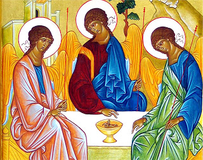
We begin our Christian life, baptized in the “The name of the Father, and of the Son, and of the Holy Spirit,” yet I often wonder in modern times if we truly appreciate the importance of this Name or how much emphasis we really place on the Name of God under which we were baptized.
The priest begins mass: “In the name of the Father, the Son and the Holy Spirit. May the peace of our Lord Jesus Christ, the Love of the Father and Grace of the Holy Spirit be with each of you.” And we respond: “And with your spirit.” How many of us accept the greeting? And how many of us expect him to then say “Good morning.” Do we realize that we have just been greeted in the most profound way, and with the strongest blessing that can be given to someone, or even remember how powerful of a statement it is to claim One name of God in three? READ FULL POST
The priest begins mass: “In the name of the Father, the Son and the Holy Spirit. May the peace of our Lord Jesus Christ, the Love of the Father and Grace of the Holy Spirit be with each of you.” And we respond: “And with your spirit.” How many of us accept the greeting? And how many of us expect him to then say “Good morning.” Do we realize that we have just been greeted in the most profound way, and with the strongest blessing that can be given to someone, or even remember how powerful of a statement it is to claim One name of God in three? READ FULL POST
All are Called to Marriage
For the Catholic Church in the west, this past Sunday is commonly known as Good Shepherd Sunday. It also marks a little more than a week after Pope Francis released his encyclical on marriage and the family, Amoris Laetitiae (The Joy of Love). With likely these two things in mind, I finally realized and saw a basic truth about this life and what it means to be human: We are all called to the love of marriage, to the complete giving and discovery of ourself in another.
We call it Good Shepherd Sunday because it is the sunday when we read from the Gospel when Jesus tells the disciples “My sheep hear my voice; I know them, and they follow me.” (Jn 10:27) In Christ, we recognize the shepherd to whom we have been given, who will truly lead and protect his people. He is the Good Shepherd and so, many pastors take the opportunity to talk about the shepherd’s of today’s church, those who, like the disciples, have inherited the charge of leading, teaching, feeding and caring for the flock of the Church; many take the opportunity to talk about vocations, about the dwindling numbers of seminarians in many diocese, the urgent need for men to respond to this vocational call, and the important role that families have in fostering an encouraging environment. They also talk about the privilege of one being chosen, of the great rewards the ordained priesthood offers, and that the greatest gift a mother can give to the church is to have raised a son who becomes a priest, while at the same time, dancing around the call to married life and the equal importance of raising a family in the Catholic faith. It is as though, in one moment we place a vocation to the priesthood as a vocation above all other vocations, as the response to a truly higher calling, and with the very next breath, profess the equality of the vocation to marriage, as though we are afraid that if we place the call to the priesthood on a pedestal that is too high, or even the tiniest bit higher than a life of marriage and family, then families, women and men who have not been called to consecrated life will somehow be offended and the institute of marriage will be demeaned and diminished to mere table scraps pushed off to the side for those who weren’t worthy, or willing enough to respond to a true vocation; that if we truly praise and glorify men and women of consecrated life, we reduce marriage to a degree of settling, as a consolation to those of somewhat less faith and value to the church and spouses as a crutch for those who cannot bear the weight of the truly pure and holy life of chastity.
For as long as I can remember, I have not felt comfortable with this idea of pitting the vocation of the priesthood against marriage and family; I have never felt comfortable when people say that some people are called to consecrated life and others are called to the vocation of marriage and family. For many years I struggled to understand the nature, and even the reason for my discomfort, but have finally realized the source of my dis-ease and why it always sounds awkward, and even hypocritical, for priests to promote vocations to the priesthood while not offending the life of marriage and raising a family.
We are all called to marriage, to a life bound in union with a spouse and to raise a family. If recall the beginning of humanity, when God first created Adam and being in search of a worthwhile companion, having brought before him all of the animals and beasts of the earth, none were found to be a suitable partner, and so God cast a deep sleep over the man. This very struggle and dilemma for God points to an underlying truth that is unspoken in the story and often over looked, that if God was unable to find a suitable partner and companion for Adam, then humanity is such a creature and being that is in need of a suitable partner. And God created woman who was the completion and fulfillment of man: “This is bone of my bone and flesh of my flesh.” And so the man was given to the woman in marriage, to take as his own and woman was given to man that they may become joined in one body and one flesh.
God create mankind that from the beginning we were called and fulfilled only through the bond and mystery of matrimony; that if not even Adam, the first and perfect man could be fulfilled alone and needed no suitable partner, then there is no man, nor any woman who is complete and whole within themselves. As Pope Francis also wrote in his encyclical on the family, Amoris Laetitia, it is this union in marriage and foundation of the family which brings us into and is the perfection of God’s love and the reflection of the life of the Holy Trinity. It is only in marriage and through our union with another person that we can hope to become whole and complete, and fully human.
Would it make sense for us, in any way, even as a sacrificial offering to the church and the people of Go, that He would call some to forego this love and participation in the Trinity itself? Would it make any sense that some would be made in His image and so find completion and true fulfillment only through another, while others, those set aside to be His priests were not in fact created in this same image, would not find their fulfillment in another and so be uninvited to share in the Divine Love of the Trinity?
If we are to believe that all people were created in the image of God, then all are called to marriage and family. The question is not whether I have been called to the married life, but to whom have I been called and what family have I been asked to raise. To be called to the consecrated life, of which some are also called to the ordained priesthood, is to be chosen, and to choose, to take Christ as one’s spouse and to take on His children as your own. This is not a new idea, it is very ancient an old. It is why women wear the bridal veil on the day of their profession; it is why monks have long referred to their cells and bedrooms as the bridal chamber; it is why consecrated brothers, sisters and priests have long written poems of love and intimacy, spoke of the beauty of their Beloved, written of a heart teased by the wounding touch of a lover, led to chase with a heart set aflame in passion and spending a fraught-less life of pursuit only to discover that the one we love has long been pursuing us: “My heart is restless until it finds its rest in you.” ; “Like a deer that yearns for running water, so my heart yearns for you.” These are the words of a lover and spouse.
Who we are called to marry is the one who completes us; it is the one who brings us a particular kind of joy, who shares some common interest, with whom we can share the things of our daily life and talk about our weightiest concerns, who often knows us better than ourselves and most importantly, the one who walks with us through our struggles, helps us transform and grow, with whom we also walk, and whose expression of love strikes us most deeply to the core of our soul. The one we are called to marry is the one whom we desire and have committed most profoundly to join our life together with as one life. For some, and truly for most, this marriage is to another person: a man to woman and a woman to a man whose lives are joined inexorably to and with whom we raise a family. But to some, to myself included, we find this One in God alone, to become bride to the Creator of Heaven and earth, and so consecrate ourselves in the vows and practice of marriage that is no different from the vows and mixtures of life of man and woman bound also in marriage.
There is the One and only in whom I have found fulfillment of love; that I alone want to come home to at night, whose life I want to mix with my own; who I cannot imagine not having as a daily part of my life; for whom I would travel to the ends of the earth is so asked; with whom I want to share my troubles and joys and who has a power like no other to brush my heart with the palm of His hand. There is One to whom I want to give my life to and to be consumed by as husband is given to wife and a wife to her husband.
The call to consecrated life is not very different than that call which we all share: to the perfection of love itself, which is marriage. All are called to this marriage and to say yes and be joined in union with the one who, from the very beginning and foundations of the earth, was also created with us, that we may have the joy and the grace to walk with throughout this life. It is then from among these, those who have been chosen as the living spouse of Christ, that some are called to be the specific task and labor of the Shepherd and serve as priests, tending the flock and raising the family of God’s people.
There is no fight, no contrast or comparison between a call to the priesthood and what some will describe as a call to marriage, but all are called to marry the one who brings them to this true fulfillment in Christ. Some, having consecrated their life to God, are then asked to bear the keys to the Kingdom and share in the ministry and priesthood of the Church.
We call it Good Shepherd Sunday because it is the sunday when we read from the Gospel when Jesus tells the disciples “My sheep hear my voice; I know them, and they follow me.” (Jn 10:27) In Christ, we recognize the shepherd to whom we have been given, who will truly lead and protect his people. He is the Good Shepherd and so, many pastors take the opportunity to talk about the shepherd’s of today’s church, those who, like the disciples, have inherited the charge of leading, teaching, feeding and caring for the flock of the Church; many take the opportunity to talk about vocations, about the dwindling numbers of seminarians in many diocese, the urgent need for men to respond to this vocational call, and the important role that families have in fostering an encouraging environment. They also talk about the privilege of one being chosen, of the great rewards the ordained priesthood offers, and that the greatest gift a mother can give to the church is to have raised a son who becomes a priest, while at the same time, dancing around the call to married life and the equal importance of raising a family in the Catholic faith. It is as though, in one moment we place a vocation to the priesthood as a vocation above all other vocations, as the response to a truly higher calling, and with the very next breath, profess the equality of the vocation to marriage, as though we are afraid that if we place the call to the priesthood on a pedestal that is too high, or even the tiniest bit higher than a life of marriage and family, then families, women and men who have not been called to consecrated life will somehow be offended and the institute of marriage will be demeaned and diminished to mere table scraps pushed off to the side for those who weren’t worthy, or willing enough to respond to a true vocation; that if we truly praise and glorify men and women of consecrated life, we reduce marriage to a degree of settling, as a consolation to those of somewhat less faith and value to the church and spouses as a crutch for those who cannot bear the weight of the truly pure and holy life of chastity.
For as long as I can remember, I have not felt comfortable with this idea of pitting the vocation of the priesthood against marriage and family; I have never felt comfortable when people say that some people are called to consecrated life and others are called to the vocation of marriage and family. For many years I struggled to understand the nature, and even the reason for my discomfort, but have finally realized the source of my dis-ease and why it always sounds awkward, and even hypocritical, for priests to promote vocations to the priesthood while not offending the life of marriage and raising a family.
We are all called to marriage, to a life bound in union with a spouse and to raise a family. If recall the beginning of humanity, when God first created Adam and being in search of a worthwhile companion, having brought before him all of the animals and beasts of the earth, none were found to be a suitable partner, and so God cast a deep sleep over the man. This very struggle and dilemma for God points to an underlying truth that is unspoken in the story and often over looked, that if God was unable to find a suitable partner and companion for Adam, then humanity is such a creature and being that is in need of a suitable partner. And God created woman who was the completion and fulfillment of man: “This is bone of my bone and flesh of my flesh.” And so the man was given to the woman in marriage, to take as his own and woman was given to man that they may become joined in one body and one flesh.
God create mankind that from the beginning we were called and fulfilled only through the bond and mystery of matrimony; that if not even Adam, the first and perfect man could be fulfilled alone and needed no suitable partner, then there is no man, nor any woman who is complete and whole within themselves. As Pope Francis also wrote in his encyclical on the family, Amoris Laetitia, it is this union in marriage and foundation of the family which brings us into and is the perfection of God’s love and the reflection of the life of the Holy Trinity. It is only in marriage and through our union with another person that we can hope to become whole and complete, and fully human.
Would it make sense for us, in any way, even as a sacrificial offering to the church and the people of Go, that He would call some to forego this love and participation in the Trinity itself? Would it make any sense that some would be made in His image and so find completion and true fulfillment only through another, while others, those set aside to be His priests were not in fact created in this same image, would not find their fulfillment in another and so be uninvited to share in the Divine Love of the Trinity?
If we are to believe that all people were created in the image of God, then all are called to marriage and family. The question is not whether I have been called to the married life, but to whom have I been called and what family have I been asked to raise. To be called to the consecrated life, of which some are also called to the ordained priesthood, is to be chosen, and to choose, to take Christ as one’s spouse and to take on His children as your own. This is not a new idea, it is very ancient an old. It is why women wear the bridal veil on the day of their profession; it is why monks have long referred to their cells and bedrooms as the bridal chamber; it is why consecrated brothers, sisters and priests have long written poems of love and intimacy, spoke of the beauty of their Beloved, written of a heart teased by the wounding touch of a lover, led to chase with a heart set aflame in passion and spending a fraught-less life of pursuit only to discover that the one we love has long been pursuing us: “My heart is restless until it finds its rest in you.” ; “Like a deer that yearns for running water, so my heart yearns for you.” These are the words of a lover and spouse.
Who we are called to marry is the one who completes us; it is the one who brings us a particular kind of joy, who shares some common interest, with whom we can share the things of our daily life and talk about our weightiest concerns, who often knows us better than ourselves and most importantly, the one who walks with us through our struggles, helps us transform and grow, with whom we also walk, and whose expression of love strikes us most deeply to the core of our soul. The one we are called to marry is the one whom we desire and have committed most profoundly to join our life together with as one life. For some, and truly for most, this marriage is to another person: a man to woman and a woman to a man whose lives are joined inexorably to and with whom we raise a family. But to some, to myself included, we find this One in God alone, to become bride to the Creator of Heaven and earth, and so consecrate ourselves in the vows and practice of marriage that is no different from the vows and mixtures of life of man and woman bound also in marriage.
There is the One and only in whom I have found fulfillment of love; that I alone want to come home to at night, whose life I want to mix with my own; who I cannot imagine not having as a daily part of my life; for whom I would travel to the ends of the earth is so asked; with whom I want to share my troubles and joys and who has a power like no other to brush my heart with the palm of His hand. There is One to whom I want to give my life to and to be consumed by as husband is given to wife and a wife to her husband.
The call to consecrated life is not very different than that call which we all share: to the perfection of love itself, which is marriage. All are called to this marriage and to say yes and be joined in union with the one who, from the very beginning and foundations of the earth, was also created with us, that we may have the joy and the grace to walk with throughout this life. It is then from among these, those who have been chosen as the living spouse of Christ, that some are called to be the specific task and labor of the Shepherd and serve as priests, tending the flock and raising the family of God’s people.
There is no fight, no contrast or comparison between a call to the priesthood and what some will describe as a call to marriage, but all are called to marry the one who brings them to this true fulfillment in Christ. Some, having consecrated their life to God, are then asked to bear the keys to the Kingdom and share in the ministry and priesthood of the Church.
Carmel's Way (desert reflections)
Chapter 1: Greetings and Good Health
"Albert, called by God's fervor to be Patriarch of the Church in Jerusalem, bids health in the Lord and the blessing of the Holy Spirit to his beloved sons in Christ, B., and the other hermits under obedience to him, who live near the spring on Mount Carmel."
I have heard a lot said about the writing of our Rule in the form of a letter, much conjecture about who brother "B." really was, why Patriarch Albert did not use his full name and who precisely were these hermits, but I have not yet heard anyone mention the most interesting part of this opening: The Rule, from the very beginning and first greeting, is trinitarian. Albert does not merely greet his brothers in Christ, as one could easily and often expect from such a letter, but in the name of the Lord, the Holy Spirit and as sons in Christ.
He greets the community of hermits, and us, just as we are baptized into the name of the Father, and the Son, and the Holy Spirit. I do not know if this was an intentional move by Albert-- it is hard to imagine that anything he wrote was not done intentionally-- but in either case, he is greeting the brothers into their new way of life according to the same way that they had entered and were received into their first life in Christ and under the same name of God.
And so we begin our life, and perhaps it would be fitting to include these words in our profession of vows, with this simple greeting in the name of our One God, that our life from here forward enjoy good health in the Lord, in the blessing of the Holy Spirit as his beloved sons in Christ.
He greets the community of hermits, and us, just as we are baptized into the name of the Father, and the Son, and the Holy Spirit. I do not know if this was an intentional move by Albert-- it is hard to imagine that anything he wrote was not done intentionally-- but in either case, he is greeting the brothers into their new way of life according to the same way that they had entered and were received into their first life in Christ and under the same name of God.
And so we begin our life, and perhaps it would be fitting to include these words in our profession of vows, with this simple greeting in the name of our One God, that our life from here forward enjoy good health in the Lord, in the blessing of the Holy Spirit as his beloved sons in Christ.
Carmel's Way
Adaptations

For whom is the Rule written? For those who find in it a Way that is worth devoting their life to in the pursuit and desire to love and live a life of love in Christ. Beyond the cloisters and beyond the brothers and sisters of vowed consecrated life, this Way of Life has profound meaning and can be lived in the midst of the secular world--as the thousands of Third Order members and millions of Christian lives have witnessed to.
Here, this series diverges in two directions: exploring the Rule in its fullest expression within the vowed Order and leading adapting its wisdom and inspiration to life outside the Order. The original reflections, written during the desert experience within the Order, are reflections on the Rule for life as a vowed member of the Order, and specifically within the context of the American province of the Order of Carmelites. It should also be pointed out that these thoughts are within the ancient observance of the Order, and not the Discalced Carmelites. While I firmly believe that our observances are equal, as are the various Rites within the Church, I also know that there are those who like to label one over the other and may so disregard things they do not want to hear. This Way of Life, however, is not so easy, that we can lay aside those difficult and uncomfortable things as more appropriate to another Order. There is but one Rule to which we have professed a vow of obedience to, and our question is: What is the Rule saying to us in this Western, 21st century? READ FULL POST
Here, this series diverges in two directions: exploring the Rule in its fullest expression within the vowed Order and leading adapting its wisdom and inspiration to life outside the Order. The original reflections, written during the desert experience within the Order, are reflections on the Rule for life as a vowed member of the Order, and specifically within the context of the American province of the Order of Carmelites. It should also be pointed out that these thoughts are within the ancient observance of the Order, and not the Discalced Carmelites. While I firmly believe that our observances are equal, as are the various Rites within the Church, I also know that there are those who like to label one over the other and may so disregard things they do not want to hear. This Way of Life, however, is not so easy, that we can lay aside those difficult and uncomfortable things as more appropriate to another Order. There is but one Rule to which we have professed a vow of obedience to, and our question is: What is the Rule saying to us in this Western, 21st century? READ FULL POST
For whom is the Rule written? For those who find in it a Way that is worth devoting their life to in the pursuit and desire to love and live a life of love in Christ. Beyond the cloisters and beyond the brothers and sisters of vowed consecrated life, this Way of Life has profound meaning and can be lived in the midst of the secular world--as the thousands of Third Order members and millions of Christian lives have witnessed to.
Here, this series diverges in two directions: exploring the Rule in its fullest expression within the vowed Order and leading adapting its wisdom and inspiration to life outside the Order. The original reflections, written during the desert experience within the Order, are reflections on the Rule for life as a vowed member of the Order, and specifically within the context of the American province of the Order of Carmelites. It should also be pointed out that these thoughts are within the ancient observance of the Order, and not the Discalced Carmelites. While I firmly believe that our observances are equal, as are the various Rites within the Church, I also know that there are those who like to label one over the other and may so disregard things they do not want to hear. This Way of Life, however, is not so easy, that we can lay aside those difficult and uncomfortable things as more appropriate to another Order. There is but one Rule to which we have professed a vow of obedience to, and our question is: What is the Rule saying to us in this Western, 21st century? READ FULL POST
Here, this series diverges in two directions: exploring the Rule in its fullest expression within the vowed Order and leading adapting its wisdom and inspiration to life outside the Order. The original reflections, written during the desert experience within the Order, are reflections on the Rule for life as a vowed member of the Order, and specifically within the context of the American province of the Order of Carmelites. It should also be pointed out that these thoughts are within the ancient observance of the Order, and not the Discalced Carmelites. While I firmly believe that our observances are equal, as are the various Rites within the Church, I also know that there are those who like to label one over the other and may so disregard things they do not want to hear. This Way of Life, however, is not so easy, that we can lay aside those difficult and uncomfortable things as more appropriate to another Order. There is but one Rule to which we have professed a vow of obedience to, and our question is: What is the Rule saying to us in this Western, 21st century? READ FULL POST
Carmel's Way
For Whom is the Rule Written?
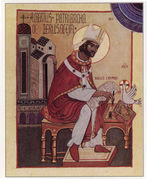
In reading the Rule and trying to transfer it into a contemporary context, there remains a very significant question: For whom is the Rule written? Is it written for cloistered monks, hidden away from public ministry and the concerns and temptations of modern life; for vowed religious with the supports and structures of a common community life? Was it written solely for the brothers living in the caves of Mt. Carmel, or for the mendicant friars as they moved into European cities and away from the primitive seclusion of the desert? Was the Rule specifically written for life in the 13th Century, a time before industry, digital technologies, and even the printing press, when one lived on food and water that the land provided, when travel was mostly by foot and seclusion into the cell could not be interrupted by the internet, televisions, radios, telephones or text messages? READ FULL POST
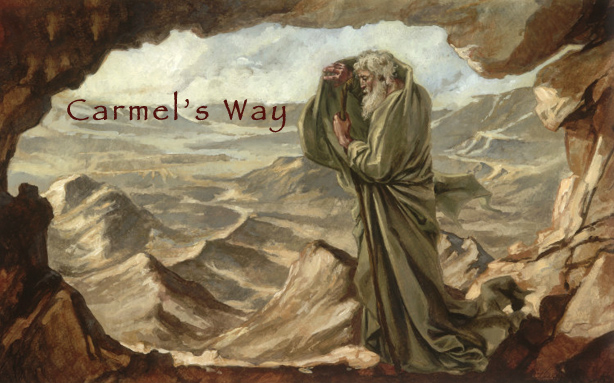
A series of reflections on the Carmelite Rule, the quintessential letter of St. Albert of Jerusalem which has lead Christians to a life in allegiance with Christ and the Perfection of Love for more than 800 years, bringing the tenants of this ancient Way of Life into the 21st Century.
At the heart is a Way of Life that leads us to stand in the presence of the One who Loved us first and in a most perfect way; and to be transformed into one who loves more perfectly.
Carmel's Way
Reflections from the Desert
One of the more unique features of the Novitiate year for the Carmelite Order is the Desert experience of Lent. While silence and prayer are the intention of the Carmelite Life, the season of Lent, like the days that Our Lord himself spent in the desert, is marked as a particularly intense time. The entire house goes into a deeper silence. There is the physical silence: brothers speak with one another only during supper; the television and radios are turned off; cell phones are also limited to necessary use, such as for a family emergency or if needed for a brother's regular ministry. Today, we also have to consider an electronic silence: computers, tablets and social networks are shutdown... READ FULL POST
Holy Week 2016
Easter is only a few days away. Our Lord is preparing to embark on his last moments, his greatest work and Passion, and so it is time for us to take a break from the regular activity of things, and in particular, away from the noise, the debates, the campaigning and worrying over "worldly things". Let us also share in this preparation, as we prepare to witness and receive what is coming in these next few days; that we may take these days to catch our breath from the busyness, uncertainty and chaos of the world around us to remember One thing: It is by His Grace and His Love that we are Saved; It is by His Grace and His Love that our hopes are renewed and fulfilled; it is by His Grace and His Love that we are fed and nourished; It is by His Grace and His Love that we are guided by Wisdom; and it is by His Grace and His Love that we will soon be resurrected.
Please be sure to come back next week, however, for something very new!
Please be sure to come back next week, however, for something very new!
To Vote . . . or not To Vote
“The voter may take the extraordinary step of not voting for any candidate.”
—Forming Consciences for Faithful Citizenship (14) --
—Forming Consciences for Faithful Citizenship (14) --
While we are morally obligated toward political action, it cannot be said that we are morally obligated to always vote. Voting is the most frequent and fundamental way of effecting our government, yet it is also just one action amongst many options. There are elections when the action of not voting may be more effective, or morally sound given the candidates we have to choose from.
In his encyclical The Splendor of Truth (Veritatis Splendor), our holy Father, John Paul II reminds us that if an act is intrinsically evil, then a good intention can only lessen the amount of evil, but can never completely remove all evil.
Since we know that God will not ask us to do evil, we also know that He will always present us with an option to do good. This means that in the case when we find ourselves having to vote for “the lesser of two evils” we may be obliged not to vote. Our good option may be to actively not vote.
If we make the decision not to vote, it cannot be a silent decision, neither through the simple action of choosing not to go to the polls on election day. There must be an action that outweighs and substitutes for our vote. The point is that if we do take the “extraordinary measure” of not voting, that we are taking an alternative approach to political action. Here to, Christ has given us guidance in telling us that, “If your brother sins [against you], go and tell him his fault…” (Mt 18:15-17).
If our candidates, government, and system is failing to such a degree that we are not being presented with a positive option, then they are sinning against us. By confronting our brother we are hoping to encourage a transformation and change toward God, so to do we hope to bring transformation and change to a democracy that fails to present us with a viable option. If we were to remain silent, tacitly approving our brother’s actions, how then would we expect him to change? How would we expect ourselves to change if no one pointed out where we are failing and falling short? Why should candidates stop using aggressive attack ads, dirty politics and making unfulfillable promises if they continue to win votes?
Do we remember what God told Ezekiel when he was called to be a prophet to Israel: “When you hear a word from my mouth, you shall warn them for me…(if) you do not warn him…that wicked man shall die for his sin, but I will hold you responsible for his death”(Ezk 3:18-19). We are responsible for the actions that we fail to take and the words we choose not to say.
Our goal must not be to act from anger and retribution, which appears to rule too many of our political debates, but out of love and a desire for human dignity, freedom and the greater Common Good. Far too often we will fall into the trap of negativity and criticism, only speaking about the hopelessness of our candidates and choices. While it is true that Christ is the judge who announced the condemnation of a generation who denied him (Jn 12:48), we must also remember that he brought an extraordinary vision of hope and promise. He did not only act to wither the fig tree (Mt 12:19) or teach us to shun evil, but came as the “Wonder-Counselor, God-Hero, Father-Forever, Prince of Peace” (Is 9:5) performing miracles of healing, embracing love and proclaiming an infinite and eminent vision of God’s Kingdom.
The theologian Walter Brueggemann captured this energizing role of our prophetic voice in his work The Prophetic Imagination. This too is one of our hopes if we choose the action of not voting, that we not only criticize and give reasons why neither of the candidates offer a good choice, but that we let it be more loudly known that our vote can be won and what we expect from a good candidate. In doing so, our hope is to inspire ad encourage others to run who may hear our words, see our actions and know that people want to vote for them.
At this point it may also be helpful to remember the early days of our history and the founding of the United States. One of the most significant and strongest criticisms against John Quincy Adams was that he actually campaigned for the Presidency, that is, he actually had the gall to ask for votes himself. Our first generations of political figures relied on others to campaign for them and saw a value in responding not to their own ambitions, but to the call from others. Now, it is unrealistic to think that candidates today should not themselves campaign. However, our touch with history should gives us the example and tells us that there is good in calling forth candidates and convincing them to run for office, rather than depending on someone to first convince us that he or she is worthy of our vote.
On the question of voting for laws and referendums, while it may be rare that there is an election when there are no candidates worth voting for, it should never be the case that we make a decision not to vote on a proposed law, ordinance or referendum. Unlike voting for one candidate or another, this is not a case when both options can lead to evil. Either the law will pass or it will not and one of these options will always serve society better than the other.
We may say that a person is not under any moral obligation to always vote between two candidates, but because of the nature of our democracy, we are obligated to vote on laws that are brought to vote before the people.
In his encyclical The Splendor of Truth (Veritatis Splendor), our holy Father, John Paul II reminds us that if an act is intrinsically evil, then a good intention can only lessen the amount of evil, but can never completely remove all evil.
Since we know that God will not ask us to do evil, we also know that He will always present us with an option to do good. This means that in the case when we find ourselves having to vote for “the lesser of two evils” we may be obliged not to vote. Our good option may be to actively not vote.
If we make the decision not to vote, it cannot be a silent decision, neither through the simple action of choosing not to go to the polls on election day. There must be an action that outweighs and substitutes for our vote. The point is that if we do take the “extraordinary measure” of not voting, that we are taking an alternative approach to political action. Here to, Christ has given us guidance in telling us that, “If your brother sins [against you], go and tell him his fault…” (Mt 18:15-17).
If our candidates, government, and system is failing to such a degree that we are not being presented with a positive option, then they are sinning against us. By confronting our brother we are hoping to encourage a transformation and change toward God, so to do we hope to bring transformation and change to a democracy that fails to present us with a viable option. If we were to remain silent, tacitly approving our brother’s actions, how then would we expect him to change? How would we expect ourselves to change if no one pointed out where we are failing and falling short? Why should candidates stop using aggressive attack ads, dirty politics and making unfulfillable promises if they continue to win votes?
Do we remember what God told Ezekiel when he was called to be a prophet to Israel: “When you hear a word from my mouth, you shall warn them for me…(if) you do not warn him…that wicked man shall die for his sin, but I will hold you responsible for his death”(Ezk 3:18-19). We are responsible for the actions that we fail to take and the words we choose not to say.
Our goal must not be to act from anger and retribution, which appears to rule too many of our political debates, but out of love and a desire for human dignity, freedom and the greater Common Good. Far too often we will fall into the trap of negativity and criticism, only speaking about the hopelessness of our candidates and choices. While it is true that Christ is the judge who announced the condemnation of a generation who denied him (Jn 12:48), we must also remember that he brought an extraordinary vision of hope and promise. He did not only act to wither the fig tree (Mt 12:19) or teach us to shun evil, but came as the “Wonder-Counselor, God-Hero, Father-Forever, Prince of Peace” (Is 9:5) performing miracles of healing, embracing love and proclaiming an infinite and eminent vision of God’s Kingdom.
The theologian Walter Brueggemann captured this energizing role of our prophetic voice in his work The Prophetic Imagination. This too is one of our hopes if we choose the action of not voting, that we not only criticize and give reasons why neither of the candidates offer a good choice, but that we let it be more loudly known that our vote can be won and what we expect from a good candidate. In doing so, our hope is to inspire ad encourage others to run who may hear our words, see our actions and know that people want to vote for them.
At this point it may also be helpful to remember the early days of our history and the founding of the United States. One of the most significant and strongest criticisms against John Quincy Adams was that he actually campaigned for the Presidency, that is, he actually had the gall to ask for votes himself. Our first generations of political figures relied on others to campaign for them and saw a value in responding not to their own ambitions, but to the call from others. Now, it is unrealistic to think that candidates today should not themselves campaign. However, our touch with history should gives us the example and tells us that there is good in calling forth candidates and convincing them to run for office, rather than depending on someone to first convince us that he or she is worthy of our vote.
On the question of voting for laws and referendums, while it may be rare that there is an election when there are no candidates worth voting for, it should never be the case that we make a decision not to vote on a proposed law, ordinance or referendum. Unlike voting for one candidate or another, this is not a case when both options can lead to evil. Either the law will pass or it will not and one of these options will always serve society better than the other.
We may say that a person is not under any moral obligation to always vote between two candidates, but because of the nature of our democracy, we are obligated to vote on laws that are brought to vote before the people.
Candidates and Issues
“The Church expects there to be a diversity of views on complex social questions, even though people hold the same universal moral positions.”
—The Challenge of Peace (12)--
—The Challenge of Peace (12)--
It should already be clear that for the Christian voter and citizen there is not a single platform or defined list of policy proposals and candidates that one must support in order to be loyal to the teachings of the Church and mission of Christ.
Our society is not a simple place where we can answer all of our political questions by simply saying that every Christian should be in favor of prison reform, housing the homeless, immigration protection and healthcare for all. Surely, all of us would agree with these things. We all want lower taxes, better education, corporate accountability, lower crime…and it seems as if every candidate and every party makes these promises. It is not the goal that we disagree on, but how we get there that good Catholics, and all Christians, will regularly disagree on. And this disagreement is a good thing. We should have debate, have discussions and diligently choose the path that we believe will lead to the Common Good and protection of the human dignity of all people.
“As Catholics, we are not single issue voters. A candidate’s position on a single issue is not sufficient to guarantee a voter’s support.”
It is true that not all issues are of equal concern, that each of us makes choices and there are certain areas that we have a particular concern for: perhaps we know more about an issue because it is related to our career; we may have a family member or close friend who has been directly effected by an issue; or possibly we just have a strong passion for something. Each of these can be ways that God draws our attention and draws His people into the work of His Kingdom, as Paul wrote of the Spirit: “to each their own place and purpose for the good of the entire body.” (1 Cor. 12:18) Giving this preference and greater attention to a particular issue is very human and beneficial, and is not what we call single issue voting.
Single issue voting is a problem when we make our voting decisions based solely on one issue and we ignore all other factors. Because we live in a two party system that has been drawn up by a mixture of political, social and religious factors, where one party favors abortion and the other promotes the death penalty, it is common for candidates to support both favorable and unfavorable policies. It is rare that we would find a candidate with whom we agree with on all fronts. Our voting then, becomes a balance sheet, a careful weighing of the sum of all our options and each candidate’s pros and cons. While we may and should give some issues greater concern than others, in the end, we are asked to look at the total result.
Again, we can visit the story of the Good Samaritan and of David’s men in the Temple (Mt 12:3-4). It was not that Christ was saying that it was not right for the bread to be consecrated to the priests, but that is was more important that people do not starve.
We are responsible for, and will be asked to account for each of the decisions we make, even those that we disagree with. As the U.S. Bishops wrote, “There may be times when a Catholic who rejects a candidate’s unacceptable position may decide to vote for that candidate for other morally grave reasons. Voting in this way would be permissible only for truly grave moral reasons, not to advance narrow interests or partisan preferences or to ignore a fundamental moral evil.”
So what does this mean for the issues and candidates that we are facing today? We are not silent about the choices we make, but have been sent out as witnesses to “make disciples of all nations” (Mt 28:19) and to “every creature of the world” (Mk 16:15). We should look beyond the simple letter of the law, or promises made by a candidate and look at what is the intention and what are the foreseeable consequences of supporting a law or particular candidate. We need to keep the Common Good, human dignity and freedom in focus, to work and fight for the solutions we believe will be most affective and most beneficial; and not be too proud to change our mind or too arrogant to not listen to different ideas. In the tradition of the prophets, we are asked to bring attention to the people in greatest need and the issues that remain furthest on the fringes of society’s consciousness.
Our society is not a simple place where we can answer all of our political questions by simply saying that every Christian should be in favor of prison reform, housing the homeless, immigration protection and healthcare for all. Surely, all of us would agree with these things. We all want lower taxes, better education, corporate accountability, lower crime…and it seems as if every candidate and every party makes these promises. It is not the goal that we disagree on, but how we get there that good Catholics, and all Christians, will regularly disagree on. And this disagreement is a good thing. We should have debate, have discussions and diligently choose the path that we believe will lead to the Common Good and protection of the human dignity of all people.
“As Catholics, we are not single issue voters. A candidate’s position on a single issue is not sufficient to guarantee a voter’s support.”
It is true that not all issues are of equal concern, that each of us makes choices and there are certain areas that we have a particular concern for: perhaps we know more about an issue because it is related to our career; we may have a family member or close friend who has been directly effected by an issue; or possibly we just have a strong passion for something. Each of these can be ways that God draws our attention and draws His people into the work of His Kingdom, as Paul wrote of the Spirit: “to each their own place and purpose for the good of the entire body.” (1 Cor. 12:18) Giving this preference and greater attention to a particular issue is very human and beneficial, and is not what we call single issue voting.
Single issue voting is a problem when we make our voting decisions based solely on one issue and we ignore all other factors. Because we live in a two party system that has been drawn up by a mixture of political, social and religious factors, where one party favors abortion and the other promotes the death penalty, it is common for candidates to support both favorable and unfavorable policies. It is rare that we would find a candidate with whom we agree with on all fronts. Our voting then, becomes a balance sheet, a careful weighing of the sum of all our options and each candidate’s pros and cons. While we may and should give some issues greater concern than others, in the end, we are asked to look at the total result.
Again, we can visit the story of the Good Samaritan and of David’s men in the Temple (Mt 12:3-4). It was not that Christ was saying that it was not right for the bread to be consecrated to the priests, but that is was more important that people do not starve.
We are responsible for, and will be asked to account for each of the decisions we make, even those that we disagree with. As the U.S. Bishops wrote, “There may be times when a Catholic who rejects a candidate’s unacceptable position may decide to vote for that candidate for other morally grave reasons. Voting in this way would be permissible only for truly grave moral reasons, not to advance narrow interests or partisan preferences or to ignore a fundamental moral evil.”
So what does this mean for the issues and candidates that we are facing today? We are not silent about the choices we make, but have been sent out as witnesses to “make disciples of all nations” (Mt 28:19) and to “every creature of the world” (Mk 16:15). We should look beyond the simple letter of the law, or promises made by a candidate and look at what is the intention and what are the foreseeable consequences of supporting a law or particular candidate. We need to keep the Common Good, human dignity and freedom in focus, to work and fight for the solutions we believe will be most affective and most beneficial; and not be too proud to change our mind or too arrogant to not listen to different ideas. In the tradition of the prophets, we are asked to bring attention to the people in greatest need and the issues that remain furthest on the fringes of society’s consciousness.
NEWLY PUBLISHED
and NOW AVAILABLE!!!
|
Please check out my new book.
Click HERE to visit the dedicated page, or click on one of the links below to purchase copies on line. |
On Political Parties
“We should not let the party transform us.”
—Forming Consciences for Faithful Citizenship (14) --
“Now I mean this, that each one of you is saying, "I am of Paul," and "I of Apollos," and "I of Cephas," and "I of Christ."
Has Christ been divided? Paul was not crucified for you, was he? Or were you baptized in the
name of Paul?” (1 Cor. 12-13)
—Forming Consciences for Faithful Citizenship (14) --
“Now I mean this, that each one of you is saying, "I am of Paul," and "I of Apollos," and "I of Cephas," and "I of Christ."
Has Christ been divided? Paul was not crucified for you, was he? Or were you baptized in the
name of Paul?” (1 Cor. 12-13)
Bumper stickers publicize the slogan, “Jesus was a liberal”; Conservatives claim the Religious Right; Democrats are called baby-killing abortionists and Republicans militant warmongers. It seems as though every political party claims either to be the keeper of God, or that the other party is the anti-Christ.
Political parties are a good way for people to gather together with similar views on government. Parties strengthen individual opinions, provide a unified voice for people and help simplify an otherwise impossibly complicated system. They are a natural part of building a democracy. Political parties are good. Loyalty to a party above all others, however, or passing wholesale judgment on a party for either good or bad, is where we enter into dangerous waters.
Once again, we should go to Jesus’ response to the question of paying taxes, “and (repay) to God what is God’s” (Mk 12:17). Our loyalty belongs first to God, to the service of others, to the good of the country and to the Common Good. Loyalty to a particular party should follow the same course. So long as we believe that we are working toward, and providing the best support for the Common Good, it does not matter which party we vote for. Catholics can vote either Republican or Democrat; Libertarian or Tea Partiers; Christians can be Liberal or Conservative; Progressive or Populist; and there is no requirement, or denunciation of support for “third parties.” It is worth saying here, because it has become a popular mantra of many: Christ was not a liberal, not only do our political divisions of today not have any historical connection to the Roman Empire, but such claims are used as an attempt to guilt people into an action they would not otherwise support, and place party loyalty over a particular circumstance and question. Judgment is not based on the party, but on the Goodness and rightness of specific actions and issues.
Partisanship can be good if it is stirred by good motives; a sincere desire and belief for the Common Good, a well formed opinion on the most effective role and place of government and openness to alternative solutions. It is only far too often that we hear the negatives of partisanship, driven by anger, confrontation, competition and deep prejudices against the other side.
As the U.S. Bishops have said, “Catholics may choose different ways to respond to compelling social problems, but we cannot differ on our moral obligation to help build a more just and peaceful world.”
In every action we take, our allegiance should be toward the end of Loving God, expressed through the love of neighbor, preservation of the dignity of life and freedom of all people. Allegiances to political parties, lobby groups and specific policy initiatives must be limited insofar as they, in the opinion of our conscience, legitimately contribute to this Common Good. Or in other words, that we educate ourselves so that we are supporting the best option, not only among the choices we have been given, but also among those that we can reasonably think of.
Likewise, we should treat political contributions the same way that we treat money given to any cause: Is this a responsible use of what God has entrusted to me toward the building of His Kingdom, in helping those in need, improving the lives of those without, and securing the freedom and dignity of all people?
Our relationship to political parties is not only a matter of who we choose to support, but is also a matter of how we allow our Christian values and dispositions to reshape the attitudes of society around us. Once again, the U.S. Bishops have said, “Unfortunately, politics in our country often can be a contest of powerful interests, partisan attacks, sound bites, and media hype. The Church calls for a different kind of political engagement: one shaped by the moral convictions of well-formed consciences and focused on the dignity of every human being, the pursuit of the common good, and the protection of the weak and the vulnerable.”
This means that we do not allow ourselves to become primarily driven by motives counter to the teachings of Christ, to greed, power, or evermore frequently, the competitiveness of winning and defeating our opponent. “We should not let the party transform us.” Rather, if we continue to be the light and salt for the system, then our work toward political parties is good and we transform the party. It is the Christian person, not the party, who is the salt of the earth, that gives light to and transform the world. A measuring stick that is helpful to use is as St. Joan of Arc said at her condemnation trial, “So long as God is first served.”
Political parties are a good way for people to gather together with similar views on government. Parties strengthen individual opinions, provide a unified voice for people and help simplify an otherwise impossibly complicated system. They are a natural part of building a democracy. Political parties are good. Loyalty to a party above all others, however, or passing wholesale judgment on a party for either good or bad, is where we enter into dangerous waters.
Once again, we should go to Jesus’ response to the question of paying taxes, “and (repay) to God what is God’s” (Mk 12:17). Our loyalty belongs first to God, to the service of others, to the good of the country and to the Common Good. Loyalty to a particular party should follow the same course. So long as we believe that we are working toward, and providing the best support for the Common Good, it does not matter which party we vote for. Catholics can vote either Republican or Democrat; Libertarian or Tea Partiers; Christians can be Liberal or Conservative; Progressive or Populist; and there is no requirement, or denunciation of support for “third parties.” It is worth saying here, because it has become a popular mantra of many: Christ was not a liberal, not only do our political divisions of today not have any historical connection to the Roman Empire, but such claims are used as an attempt to guilt people into an action they would not otherwise support, and place party loyalty over a particular circumstance and question. Judgment is not based on the party, but on the Goodness and rightness of specific actions and issues.
Partisanship can be good if it is stirred by good motives; a sincere desire and belief for the Common Good, a well formed opinion on the most effective role and place of government and openness to alternative solutions. It is only far too often that we hear the negatives of partisanship, driven by anger, confrontation, competition and deep prejudices against the other side.
As the U.S. Bishops have said, “Catholics may choose different ways to respond to compelling social problems, but we cannot differ on our moral obligation to help build a more just and peaceful world.”
In every action we take, our allegiance should be toward the end of Loving God, expressed through the love of neighbor, preservation of the dignity of life and freedom of all people. Allegiances to political parties, lobby groups and specific policy initiatives must be limited insofar as they, in the opinion of our conscience, legitimately contribute to this Common Good. Or in other words, that we educate ourselves so that we are supporting the best option, not only among the choices we have been given, but also among those that we can reasonably think of.
Likewise, we should treat political contributions the same way that we treat money given to any cause: Is this a responsible use of what God has entrusted to me toward the building of His Kingdom, in helping those in need, improving the lives of those without, and securing the freedom and dignity of all people?
Our relationship to political parties is not only a matter of who we choose to support, but is also a matter of how we allow our Christian values and dispositions to reshape the attitudes of society around us. Once again, the U.S. Bishops have said, “Unfortunately, politics in our country often can be a contest of powerful interests, partisan attacks, sound bites, and media hype. The Church calls for a different kind of political engagement: one shaped by the moral convictions of well-formed consciences and focused on the dignity of every human being, the pursuit of the common good, and the protection of the weak and the vulnerable.”
This means that we do not allow ourselves to become primarily driven by motives counter to the teachings of Christ, to greed, power, or evermore frequently, the competitiveness of winning and defeating our opponent. “We should not let the party transform us.” Rather, if we continue to be the light and salt for the system, then our work toward political parties is good and we transform the party. It is the Christian person, not the party, who is the salt of the earth, that gives light to and transform the world. A measuring stick that is helpful to use is as St. Joan of Arc said at her condemnation trial, “So long as God is first served.”
Values in Politics
“We are called to bring together our principles and our political choices, our values and our votes, to help build a better world.”
—Forming Consciences for Faithful Citizenship (14) --
—Forming Consciences for Faithful Citizenship (14) --
Our faith and the teachings of Christ are rich and fluid with attitudes and dispositions that are meant to set us apart from the world. One does not recognize a Christian by how we vote on the most popular issues, but by the values we represent with our actions, the questions we ask, and which issues we hold our political leaders accountable on. As we often hear accredited to St. Francis, “Preach the Gospel at all times. Use words when necessary.”
Some have taken the Beattitudes as a guide for dispositions of the Christian heart. This gives us a good place to begin, but it can remain unclear and even confusing as to how these dispositions may translate into political activity. What does it even mean to be “poor in spirit”? How does “mourning” guide a decision in voting? When Christ says that the meek “shall inherit the earth” does this promote a socialist redistribution of the wealth? The difficulty is that we most often think about political activity as precisely that, activity, a set of actions that each of us takes. But Christ is not speaking about actions and activity. The Beattitudes, and the reason for their effectiveness and centrality to our faith, and the greatest distinction between the Old and the New Testaments, is that Christ’s teaching was not centered on specific actions. Rather, the true wisdom and power from the sermon on the mount is that it speaks of dispositions of the heart, of qualities in personality and how we look upon and treat others. The Beattitudes are not the assignment of the Law, but a source four our interpretation, that we may be able to look at any given situation and circumstance, and with this way of thinking, under these principles of guidance, we may choose the specific and particular way to respond. The Christian approach to healing and helping the world is to develop and cultivate such dispositions as the true moral and practical guide in loving, helping and serving others.
How does this help our question of our obligations and the actions we are to take in the political arena? It may be a difficult teaching, but it points us to a politics that is based on values and not specific policy ideas or practical proposals. If one looks carefully at the collection of Catholic Social Teaching, you will find that while a very few specific policy proposals are mentioned, the purpose and intention is to delve more deeply into the political challenges that we face to point out the ways and the types of values that are at issue. With concerns over socialism Catholic Social Teaching, points out the value of sharing with the poor, alongside concerns over the losses of freedom and the value of individual identity, to the threat of placing the state over the importance and the rights of the people, and even the church. Similarly, in the past few years Pope Francis has pointed to the benefits of capitalism in honoring the individual freedoms of individuals, yet warned of the dangers of materialism and the exploitation of people.
It is not possible to list through here all of the values and dispositions that would help us in making out political choices. Here is a list of some of the key attitudes and values that should inform and be expressed through our political choices and relationships. Just as if we are responsible to the values Jesus gave in the Beattitudes, if we live and hold ourselves responsible to these, the Church is confident that we will make good political choices and decisions:
Some have taken the Beattitudes as a guide for dispositions of the Christian heart. This gives us a good place to begin, but it can remain unclear and even confusing as to how these dispositions may translate into political activity. What does it even mean to be “poor in spirit”? How does “mourning” guide a decision in voting? When Christ says that the meek “shall inherit the earth” does this promote a socialist redistribution of the wealth? The difficulty is that we most often think about political activity as precisely that, activity, a set of actions that each of us takes. But Christ is not speaking about actions and activity. The Beattitudes, and the reason for their effectiveness and centrality to our faith, and the greatest distinction between the Old and the New Testaments, is that Christ’s teaching was not centered on specific actions. Rather, the true wisdom and power from the sermon on the mount is that it speaks of dispositions of the heart, of qualities in personality and how we look upon and treat others. The Beattitudes are not the assignment of the Law, but a source four our interpretation, that we may be able to look at any given situation and circumstance, and with this way of thinking, under these principles of guidance, we may choose the specific and particular way to respond. The Christian approach to healing and helping the world is to develop and cultivate such dispositions as the true moral and practical guide in loving, helping and serving others.
How does this help our question of our obligations and the actions we are to take in the political arena? It may be a difficult teaching, but it points us to a politics that is based on values and not specific policy ideas or practical proposals. If one looks carefully at the collection of Catholic Social Teaching, you will find that while a very few specific policy proposals are mentioned, the purpose and intention is to delve more deeply into the political challenges that we face to point out the ways and the types of values that are at issue. With concerns over socialism Catholic Social Teaching, points out the value of sharing with the poor, alongside concerns over the losses of freedom and the value of individual identity, to the threat of placing the state over the importance and the rights of the people, and even the church. Similarly, in the past few years Pope Francis has pointed to the benefits of capitalism in honoring the individual freedoms of individuals, yet warned of the dangers of materialism and the exploitation of people.
It is not possible to list through here all of the values and dispositions that would help us in making out political choices. Here is a list of some of the key attitudes and values that should inform and be expressed through our political choices and relationships. Just as if we are responsible to the values Jesus gave in the Beattitudes, if we live and hold ourselves responsible to these, the Church is confident that we will make good political choices and decisions:
- Solidarity (as witnessed in the Eucharist)
- Local, (also called subsidiarity)
- Reconciliation (especially in matters of justice)
- Compassion (Preferential Option for the Poor)
- Witness (Prophetic Witness)
- Freedom and Liberty
- Inviolability of Life
- Universal Human Dignity and Equality of Life
- Stewardship (care for the environment and others)
- Humility and Service (in authority and leadership)
- Justice
- Peace
- Interdependence (unity)
Virtue Driven Citizenship:
Fortitude and Justice
Fortitude: Fortitude is perhaps a virtue that is overly emphasized in today’s political culture. It is the faculty to persevere and can mistakenly be turned into the strength to never give in and never compromise. This is the fortitude that it often takes to cause real change and elect candidates that we strongly believe in and in so far as we have the conviction to persevere for God, this is type of fortitude is Good. Virtuous fortitude, however, also includes having the strength, not only to continue to stand for your faith and beliefs, but to also continue acting justly and fairly in the face of defeat, of disappointment and even the unfairest of treatment. Fortitude gives us the strength and calls us to live out our Christian values in very non-Christian contexts. If someone wants to drag us into partisan bickering, we refrain; if we are tempted to say “If you are Catholic you must support...” we refrain; if we are angry and want to spread hateful speech about a candidate or official, we refrain. The most important aspect of fortitude may be that while laws may change and be passed that contradict our core beliefs, we continue to believe and not allow the values of our government to define the values of our faith.
Justice: If there is a virtue that is self-evident in its importance to any government and our political activity, it is the virtue of justice. We are called in everything we do, to not only seek a more just society, but to act justly in everything we do and in every way that we treat others. This holds true even at times when we may be treated truly in unjust ways. In the face of political gamesmanship, slander, maltreatment and oppression we are called not to cross that threshold. It here that it is imperative to stand by the conviction that the ends does not always justify the means. To build a more just society first requires a people to act justly. It is through us, through our activity and support, that such a society is built.
Justice: If there is a virtue that is self-evident in its importance to any government and our political activity, it is the virtue of justice. We are called in everything we do, to not only seek a more just society, but to act justly in everything we do and in every way that we treat others. This holds true even at times when we may be treated truly in unjust ways. In the face of political gamesmanship, slander, maltreatment and oppression we are called not to cross that threshold. It here that it is imperative to stand by the conviction that the ends does not always justify the means. To build a more just society first requires a people to act justly. It is through us, through our activity and support, that such a society is built.
Virtue Driven Citizenship:
Prudence and Temperance
Prudence: Prudence is the use of good reason in making decisions. To be prudent does not mean having a high IQ, but that we approach questions and our activity in a deliberate and well reasoned manner. In the political arena, this means that we educate ourselves on the issues and candidates, rather than simply fall prey to fancy campaign strategies and catchy slogans. It suggests that we are not single issue voters, but that we consider and weigh the entire platform. To be prudent means that we look at the end results; Does mandatory testing of students actually improve the quality of education, or could it result in teaching to the test instead? Do campaign finance laws remove the influence of money in government, or could they encourage the creation of third party PACs who run outside of official campaigns? What are the real effects of term limits, of mandating the purchase of health insurance, etc.? Acting prudently does not mean that we will always come up with the right answer, but it keeps us attentive to the best solution at hand.
Temperance: We may often think of temperance with regard to things like alcoholism or other addictions. To have temperance is to act with moderation and self-control. The clearest expression in politics would be to refrain from strong partisan fights and gamesmanship. Temperance encourages real compromise, not as a weakness of character and conviction, but in the spirit of companionship and understanding. It also means to act with humility such that we are not afraid to defer to the talents, the skills and wisdom of others. Contrary to today’s cultural pressures, we do not have to have an opinion on every political matter and question that comes up. I do not have to be an expert in education policies, foreign affairs drug policies, environmental protection, economics and national security. Rather, through temperance, I humbly recognize that there are areas I am strong in, and others where it is far better that I defer to the experts and I trust others to prudently make the decisions for me.
Temperance: We may often think of temperance with regard to things like alcoholism or other addictions. To have temperance is to act with moderation and self-control. The clearest expression in politics would be to refrain from strong partisan fights and gamesmanship. Temperance encourages real compromise, not as a weakness of character and conviction, but in the spirit of companionship and understanding. It also means to act with humility such that we are not afraid to defer to the talents, the skills and wisdom of others. Contrary to today’s cultural pressures, we do not have to have an opinion on every political matter and question that comes up. I do not have to be an expert in education policies, foreign affairs drug policies, environmental protection, economics and national security. Rather, through temperance, I humbly recognize that there are areas I am strong in, and others where it is far better that I defer to the experts and I trust others to prudently make the decisions for me.
Virtue Driven Citizenship
“Catholics may choose different ways to respond to compelling social problems, but we cannot differ on our moral obligation to help build a more just and peaceful world through morally acceptable means, so that the weak and vulnerable are protected and human rights and dignity are defended.”
—Forming Consciences for Faithful Citizenship (20) --
—Forming Consciences for Faithful Citizenship (20) --
There is no single action that we are always obliged through faith in Christ to follow. We remember the story Jesus told of David’s men eating the bread that had been consecrated for the priests, and the Good Samaritan who broke Sabbath law to tend to the man who had been robbed and beaten. It is not that all laws are made to be broken. Jesus did not come to abolish the law, but to fulfill it (Mt 5:17). All good laws are meant to fulfill a purpose, a good end and are meant to serve the good of humanity. “The Sabbath (law) was created for man, not man for the Sabbath (law)” (Mk 2:27).
In our political decisions, there are very few, if any, laws that every good Christian must be either in favor of or against. Even with an issue as intrinsically connected to human life as abortion, it may well be that there are laws other than an outright and immediate ban that would have a greater effect on reducing the number of abortions. Or perhaps we may consider that the best situation for our country is one in which no specific law is needed that bans abortions, but that we have changed our society in such a way that abortions become more and more intolerable. Similarly, there may be more effective ways of providing healthcare to the poor, rather than providing universal health insurance. Responsible Christians can disagree on policies regarding welfare, unemployment, immigration, education and every number of public issues that our governments will have to face.
Of late, the issue of gun control has resurfaced and there are those in the Catholic church who have claimed that “There is nothing more Catholic than requiring background checks because it is, after all, a question of the preservation of life.” This is a most dangerous statement, not only because of the guilt that we can engender by putting a person’s orthodox belief into question, but also because it presumes the church to be an expert on practical social issues. There is no doubt that the preservation of life is a very Catholic issue, but there remains the very real question as to whether or not gun control, increased background checks and registration actually reduces the amount of violence in this country. The U.S. Bishops have made it very clear: “Catholics may choose different ways to respond to compelling social problems, but we cannot differ on our moral obligation to help build a more just and peaceful world.”
What defines us as Christian and what holds us in union with the Church is not any policy proposal that we may either support or oppose, but it is toward what end we are seeking and what values we are driven by. So long as we remain faithful to the values and disposition of Love; that we carry ourselves with the virtues of prudence, temperance, fortitude and justice; and we believe that our decisions are guided toward the Common Good, toward human dignity and freedom, we remain faithful to the teachings and will of Christ.
It may seem odd for us to think about the cardinal virtues in terms of our political actions. However, if we truly think of our political activity as the moral expression of our faith, then our virtues become the guide posts and driving force behind our actions.
Prudence: Prudence is the use of good reason in making decisions. To be prudent does not mean having a high IQ, but that we approach questions and our activity in a deliberate and well reasoned manner. In the political arena, this means that we educate ourselves on the issues and candidates, rather than simply fall prey to fancy campaign strategies and catchy slogans. It suggests that we are not single issue voters, but that we consider and weigh the entire platform. To be prudent means that we look at the end results; Does mandatory testing of students actually improve the quality of education, or could it result in teaching to the test instead? Do campaign finance laws remove the influence of money in government, or could they encourage the creation of third party PACs who run outside of official campaigns? What are the real effects of term limits, of mandating the purchase of health insurance, etc.? Acting prudently does not mean that we will always come up with the right answer, but it keeps us attentive to the best solution at hand.
In our political decisions, there are very few, if any, laws that every good Christian must be either in favor of or against. Even with an issue as intrinsically connected to human life as abortion, it may well be that there are laws other than an outright and immediate ban that would have a greater effect on reducing the number of abortions. Or perhaps we may consider that the best situation for our country is one in which no specific law is needed that bans abortions, but that we have changed our society in such a way that abortions become more and more intolerable. Similarly, there may be more effective ways of providing healthcare to the poor, rather than providing universal health insurance. Responsible Christians can disagree on policies regarding welfare, unemployment, immigration, education and every number of public issues that our governments will have to face.
Of late, the issue of gun control has resurfaced and there are those in the Catholic church who have claimed that “There is nothing more Catholic than requiring background checks because it is, after all, a question of the preservation of life.” This is a most dangerous statement, not only because of the guilt that we can engender by putting a person’s orthodox belief into question, but also because it presumes the church to be an expert on practical social issues. There is no doubt that the preservation of life is a very Catholic issue, but there remains the very real question as to whether or not gun control, increased background checks and registration actually reduces the amount of violence in this country. The U.S. Bishops have made it very clear: “Catholics may choose different ways to respond to compelling social problems, but we cannot differ on our moral obligation to help build a more just and peaceful world.”
What defines us as Christian and what holds us in union with the Church is not any policy proposal that we may either support or oppose, but it is toward what end we are seeking and what values we are driven by. So long as we remain faithful to the values and disposition of Love; that we carry ourselves with the virtues of prudence, temperance, fortitude and justice; and we believe that our decisions are guided toward the Common Good, toward human dignity and freedom, we remain faithful to the teachings and will of Christ.
It may seem odd for us to think about the cardinal virtues in terms of our political actions. However, if we truly think of our political activity as the moral expression of our faith, then our virtues become the guide posts and driving force behind our actions.
Prudence: Prudence is the use of good reason in making decisions. To be prudent does not mean having a high IQ, but that we approach questions and our activity in a deliberate and well reasoned manner. In the political arena, this means that we educate ourselves on the issues and candidates, rather than simply fall prey to fancy campaign strategies and catchy slogans. It suggests that we are not single issue voters, but that we consider and weigh the entire platform. To be prudent means that we look at the end results; Does mandatory testing of students actually improve the quality of education, or could it result in teaching to the test instead? Do campaign finance laws remove the influence of money in government, or could they encourage the creation of third party PACs who run outside of official campaigns? What are the real effects of term limits, of mandating the purchase of health insurance, etc.? Acting prudently does not mean that we will always come up with the right answer, but it keeps us attentive to the best solution at hand.
Responsibility of the Person
“A well ordered human society requires that (people) recognize
and observe their mutual rights and duties”
—Pacem en Terris (Peace on Earth, 20) --
and observe their mutual rights and duties”
—Pacem en Terris (Peace on Earth, 20) --
“You are the salt of the earth, but if salt loses its taste,
with what can it be seasoned.”
--Mt 5:13--
with what can it be seasoned.”
--Mt 5:13--
In a democracy, the weight of governing and pursuing the Common Good weighs heaviest on the shoulders of the people. Indeed, we have been commanded toward social action. Christ has said, “As I have loved you, so you should also love one another” (Jn 13:34). This command is not stagnant, it does not wait every two or four years for another election to cycle around, but demands constant attention and expression.
When the people were hungry Jesus did not send them away, but directed his disciples to share all that they had with them among the crowds (Mk 6:36-44). When he was criticized for eating with tax collectors and sinners, “he heard this and said, ‘Those who are well do not need a physician, but the sick do’” (Mt 9:12). These were not political actions. Jesus was not a directly political figure. Scripture does not record a single comment that he directed at Caesar, and yet, the history of the world shows that his actions of social caring and solidarity carried significant political consequences. So to do our actions of expressed love hold the potential of impacting our political world, even more so because we live in a modern democracy.
We should always be keenly aware of how our laws, our votes and our political leaders shape our cultural and spiritual growth. This is not a matter of publicly funding churches and encouraging religious education. Virtually every action of public policy touches and transforms us on some level, whether it’s how we support military action, the death penalty, taxation, welfare, lending laws, environmental development, or how the state defines marriage. In this way, we can see that our individual responsibility toward the government is intrinsically connected with our personal development. Our Common Good is interwoven with our individual good and our faith in Christ. We must allow that faith to encourage and inspire our decisions.
We remember John Paul II’s words, “People today need to turn to Christ once again in order to receive from him the answer to their questions about what is good and what is evil.’”
Christian faith is not just about the symbol we hang on our doors and walls, which day of the week we go to church, how we pray, or what we imagine the afterlife to be. Our faith in God is not merely a private experience, but drives our vision of the world: What we believe is important to humanity; the values that most benefit a healthy society; our sense of justice and basic human rights; what we believe to be fair and reasonable use of our resources; and how we should act toward our neighbors, as people and as nations. All of these human questions find their source in how we see God and the world that scripture reveals to us…and they are very political.
As Christians, we are called to act as Christian in all of our dealings and relationships with people. There is no political exemption for our actions on election day, meaning that when we enter the campaign or election arena, we are to continue to act with the love of Christ, of one another and desire for the Common Good. We must allow the values and dispositions that Christ has given us to influence and guide our actions.
Love does not demand, so much as it is the act of actually being in solidarity with God and with others. As Ronald Rolheiser wrote in his book The Holy Longing, we are “to radiate the compassion and love of God, as manifest in Jesus, in our faces and our actions.”
We are called to more than simply be a good person. Love of God and love of neighbor are so intrinsically connected with one another, that they are the same. As Mother Teresa witnessed, “when you handle the sores and wounds of the poor, you must never forget that they are the wounds of Christ.”
Through love, we are obliged morally to come to the aid of those in need. I could go on, but the point here is that to be Christian is not to merely adopt a set of beliefs, but it is an expression and way of life that builds the real union between souls and truly, in His real presence, brings Christ into this world. To understand more about how that love manifests in our day-to-day activity, simply go to church, listen to the homily, to the prayers, and especially to the profession of the Creed. These are the teachings of our faith from the very beginning, the gift and life of the real presence of Christ who descended to the greatest depths of those in need here, that we may then be raised to the Kingdom above.
Our political life and obligations can not be separated from these same principles and values. The political good is our social collection of ideals and the law provides the governing foundation for any society. Whether we choose to call it a social contract, or the divine right of kings, the government remains a tool of union for any society and, albeit strange for us to think of it in these terms, the government can be a source of love. We must allow our beliefs, just as much as any other group, to guide and direct this tool. As Christ says, “You are the salt of the earth”…but what if that salt loses its flavor? What if we pull our religious convictions and values out of the discussion and withdraw from the political debate? What good would we be?
Similarly, shielding ourselves from the hand-to-hand work of helping our neighbors by simply promoting good policies and political candidates does not fulfill our moral obligations. We must embrace those in need, giving time to the service of the poor and sharing our gifts for the good of the community. This work of serving God through and in the people we meet does not only serve to reshape our society, but living out these commands to love has the double effect of changing the person who expresses that love.
We can begin to see, then, that politics and government do not own a separate set of moral obligations, there is not a separate set of rules where governing is concerned, but it is simply a political expression of our moral character in Christ.
When the people were hungry Jesus did not send them away, but directed his disciples to share all that they had with them among the crowds (Mk 6:36-44). When he was criticized for eating with tax collectors and sinners, “he heard this and said, ‘Those who are well do not need a physician, but the sick do’” (Mt 9:12). These were not political actions. Jesus was not a directly political figure. Scripture does not record a single comment that he directed at Caesar, and yet, the history of the world shows that his actions of social caring and solidarity carried significant political consequences. So to do our actions of expressed love hold the potential of impacting our political world, even more so because we live in a modern democracy.
We should always be keenly aware of how our laws, our votes and our political leaders shape our cultural and spiritual growth. This is not a matter of publicly funding churches and encouraging religious education. Virtually every action of public policy touches and transforms us on some level, whether it’s how we support military action, the death penalty, taxation, welfare, lending laws, environmental development, or how the state defines marriage. In this way, we can see that our individual responsibility toward the government is intrinsically connected with our personal development. Our Common Good is interwoven with our individual good and our faith in Christ. We must allow that faith to encourage and inspire our decisions.
We remember John Paul II’s words, “People today need to turn to Christ once again in order to receive from him the answer to their questions about what is good and what is evil.’”
Christian faith is not just about the symbol we hang on our doors and walls, which day of the week we go to church, how we pray, or what we imagine the afterlife to be. Our faith in God is not merely a private experience, but drives our vision of the world: What we believe is important to humanity; the values that most benefit a healthy society; our sense of justice and basic human rights; what we believe to be fair and reasonable use of our resources; and how we should act toward our neighbors, as people and as nations. All of these human questions find their source in how we see God and the world that scripture reveals to us…and they are very political.
As Christians, we are called to act as Christian in all of our dealings and relationships with people. There is no political exemption for our actions on election day, meaning that when we enter the campaign or election arena, we are to continue to act with the love of Christ, of one another and desire for the Common Good. We must allow the values and dispositions that Christ has given us to influence and guide our actions.
Love does not demand, so much as it is the act of actually being in solidarity with God and with others. As Ronald Rolheiser wrote in his book The Holy Longing, we are “to radiate the compassion and love of God, as manifest in Jesus, in our faces and our actions.”
We are called to more than simply be a good person. Love of God and love of neighbor are so intrinsically connected with one another, that they are the same. As Mother Teresa witnessed, “when you handle the sores and wounds of the poor, you must never forget that they are the wounds of Christ.”
Through love, we are obliged morally to come to the aid of those in need. I could go on, but the point here is that to be Christian is not to merely adopt a set of beliefs, but it is an expression and way of life that builds the real union between souls and truly, in His real presence, brings Christ into this world. To understand more about how that love manifests in our day-to-day activity, simply go to church, listen to the homily, to the prayers, and especially to the profession of the Creed. These are the teachings of our faith from the very beginning, the gift and life of the real presence of Christ who descended to the greatest depths of those in need here, that we may then be raised to the Kingdom above.
Our political life and obligations can not be separated from these same principles and values. The political good is our social collection of ideals and the law provides the governing foundation for any society. Whether we choose to call it a social contract, or the divine right of kings, the government remains a tool of union for any society and, albeit strange for us to think of it in these terms, the government can be a source of love. We must allow our beliefs, just as much as any other group, to guide and direct this tool. As Christ says, “You are the salt of the earth”…but what if that salt loses its flavor? What if we pull our religious convictions and values out of the discussion and withdraw from the political debate? What good would we be?
Similarly, shielding ourselves from the hand-to-hand work of helping our neighbors by simply promoting good policies and political candidates does not fulfill our moral obligations. We must embrace those in need, giving time to the service of the poor and sharing our gifts for the good of the community. This work of serving God through and in the people we meet does not only serve to reshape our society, but living out these commands to love has the double effect of changing the person who expresses that love.
We can begin to see, then, that politics and government do not own a separate set of moral obligations, there is not a separate set of rules where governing is concerned, but it is simply a political expression of our moral character in Christ.
For the People
One of the greater known Catholic theologians of the 20th Century, John Courtney Murray, captured this idea when he said that it is through the people, the common subject of the church and the state, that faith and the commandments of God come into contact with the government. It is through us that God comes into contact with the world and engages the problems of our society. So to answer the question: What does Jesus and the history of scripture say about the role, duties and responsibilities of government? What has Jesus asked of each of us? “Love one another. As I have loved you, so also you should love one another” (Jn 13:34).
It is not enough for us to recognize that governments exists for the good of the people, or that the goal of a good government is to build a better society, not a better government. We can also take from scripture and the actions of our Lord what it means to have authority over people. What is the responsibility of ruling authorities toward the people they rule?
When Jesus knelt to wash Simon Peter’s feet, he said to our Lord, “You will never wash my feet.” Yet Jesus responded, “Unless I wash you, you will have no inheritance in me” (Jn 13:7). This image, and so many others from scripture, show us that authority is gained by serving the needs of those we intend to lead. Much like the sabbath exists for the people, not people for the sabbath, the government exists to serve the people, the people do not exist to serve the government.
We may see this more easily in Jesus’s response when challenged about the laws of the Sabbath, “The Sabbath was made for man, not man for the Sabbath,” (Mk 2:27) so that law is made for the good of the people, and governments exist for the good of the people. People do not exist for the good of the government. Any society where the burden has shifted to where the weight of serving the government is carried by the people has become oppressive and falls short of the mission of serving the Common Good. Governments are good when they exist for the good of supporting, serving and promoting the dignity of all people.
It is not enough for us to recognize that governments exists for the good of the people, or that the goal of a good government is to build a better society, not a better government. We can also take from scripture and the actions of our Lord what it means to have authority over people. What is the responsibility of ruling authorities toward the people they rule?
When Jesus knelt to wash Simon Peter’s feet, he said to our Lord, “You will never wash my feet.” Yet Jesus responded, “Unless I wash you, you will have no inheritance in me” (Jn 13:7). This image, and so many others from scripture, show us that authority is gained by serving the needs of those we intend to lead. Much like the sabbath exists for the people, not people for the sabbath, the government exists to serve the people, the people do not exist to serve the government.
We may see this more easily in Jesus’s response when challenged about the laws of the Sabbath, “The Sabbath was made for man, not man for the Sabbath,” (Mk 2:27) so that law is made for the good of the people, and governments exist for the good of the people. People do not exist for the good of the government. Any society where the burden has shifted to where the weight of serving the government is carried by the people has become oppressive and falls short of the mission of serving the Common Good. Governments are good when they exist for the good of supporting, serving and promoting the dignity of all people.
Gifts for Governing
When confronted by political questions we shouldn’t simply jump at whomever makes the most promises for universal healthcare, better education, lower crime, lower taxes or even world peace. We must think deeply about what role the government should play in bringing about and inspiring these changes. How can it most effectively use its resources; what tools are unique to government; and what level of government can be most effective?
National and local governments have authority over a given territory. As much as we may not like it, the United States does not have authority in Mexico, neither does New Jersey carry authority over Arizona. Governments also have the ability to tax, to create laws and they own a monopoly on the use of force. These powers give them unique abilities in the areas of building infrastructures, protecting the a common welfare, dispensing justice, providing security, and managing resources. Governments are not particularly gifted in manufacturing, in guaranteeing employment, defining morality or teaching on human dignity. Although the government certainly has a role to play and affects these areas, they are primarily the charge of the economic markets and the churches.
It is important for us to be aware that each of these three partners: Political, Economic and Religious pillars, have unique gifts that coincide with their areas of primary responsibility. “There are different workings but the same God who produces all them in everyone” (1Co 12:6). Every part of society, just like every person, is under the two commands to love God and to love one another and has the opportunity to participate in Christ’s mission to the world. Governments, businesses, schools and even corporations, every part of society is included in this. “As a body is one though it has many parts, and all the parts of the body, though many, are one body, so also is Christ” (1Co 12:12). All are intended to serve the good of the body, or in political terms, the Common Good.
Our challenge is that when we come to a question of need; healthcare, immigration, education, marriage, the economy, environment, or any of the endless number of issues our society faces, we must ask the questions: What is the role of the government? What are the gifts primarily unique to the government? Does its actions serve the Common Good or some other interest?
In more specific terms, the role of the government is to support the presence of justice, freedom, and the value and dignity of every human person using the tools of law and authority that defines each government.
National and local governments have authority over a given territory. As much as we may not like it, the United States does not have authority in Mexico, neither does New Jersey carry authority over Arizona. Governments also have the ability to tax, to create laws and they own a monopoly on the use of force. These powers give them unique abilities in the areas of building infrastructures, protecting the a common welfare, dispensing justice, providing security, and managing resources. Governments are not particularly gifted in manufacturing, in guaranteeing employment, defining morality or teaching on human dignity. Although the government certainly has a role to play and affects these areas, they are primarily the charge of the economic markets and the churches.
It is important for us to be aware that each of these three partners: Political, Economic and Religious pillars, have unique gifts that coincide with their areas of primary responsibility. “There are different workings but the same God who produces all them in everyone” (1Co 12:6). Every part of society, just like every person, is under the two commands to love God and to love one another and has the opportunity to participate in Christ’s mission to the world. Governments, businesses, schools and even corporations, every part of society is included in this. “As a body is one though it has many parts, and all the parts of the body, though many, are one body, so also is Christ” (1Co 12:12). All are intended to serve the good of the body, or in political terms, the Common Good.
Our challenge is that when we come to a question of need; healthcare, immigration, education, marriage, the economy, environment, or any of the endless number of issues our society faces, we must ask the questions: What is the role of the government? What are the gifts primarily unique to the government? Does its actions serve the Common Good or some other interest?
In more specific terms, the role of the government is to support the presence of justice, freedom, and the value and dignity of every human person using the tools of law and authority that defines each government.
The Common Good
Although it was one act and sacrifice of Christ that is responsible for bringing the gift and even the possibility of salvation to the world, our history is filled with loyal servants who have faithfully acted in revealing more of this mystery and calling people toward the salvation that God has promised His people. This world has been transformed throughout the centuries by the works and love of the faithful; through the prophets, saints and ordinary people who share the commands of love with one another. This work is the bringing of God’s Kingdom into an ever-greater presence. It is a Kingdom of dynamism, as Jesus taught, the mustard seed that has been planted and grows, yet is not fully grown, not yet completely fulfilled. This building of a society of God, what has been called societas perfecta, is an integral part of reconciling the fullness of humanity with God.
Governments remain good in so far as their gifts are directed for the benefit and good of the people. Thomas Aquinas described this responsibility as leading people toward greater virtue. Given our modern climate of church and state, it can be difficult to use this language for fear of blurring the ideas of imposing moral virtue with laws that encourage a better society. Although our words have to be more careful and in some circumstances altogether different, the goals remain true to Aquinas’ conviction. All things are to be directed toward God, who is the one True Good. It is in Him that we find true goodness and are raised from the squalor of life to fulfillment in salvation. A society that is directed for the good, and virtue of the people, is pointed toward God. This tells us that the laws and motivations of a good government are not to be primarily directed by a political ideology, like capitalism, communism or socialism, but are responsible first to the good of the people, that is, to the Common Good. Through this expression of love for one another, our governments equally express the love of God.
Governments remain good in so far as their gifts are directed for the benefit and good of the people. Thomas Aquinas described this responsibility as leading people toward greater virtue. Given our modern climate of church and state, it can be difficult to use this language for fear of blurring the ideas of imposing moral virtue with laws that encourage a better society. Although our words have to be more careful and in some circumstances altogether different, the goals remain true to Aquinas’ conviction. All things are to be directed toward God, who is the one True Good. It is in Him that we find true goodness and are raised from the squalor of life to fulfillment in salvation. A society that is directed for the good, and virtue of the people, is pointed toward God. This tells us that the laws and motivations of a good government are not to be primarily directed by a political ideology, like capitalism, communism or socialism, but are responsible first to the good of the people, that is, to the Common Good. Through this expression of love for one another, our governments equally express the love of God.
What is the Role and Purpose of Government?
"We the People of the United States, in Order to form a more perfect Union, establish Justice, insure domestic Tranquility, provide for the common defence, promote the general Welfare, and secure the Blessings of Liberty to ourselves and our Posterity, do ordain and establish this Constitution for
the United States of America.”
“As a body is one though it has many parts, and all the parts of the body is one though it has many parts, and all the parts of the body, though many,
so also Christ.” (1Cor 12:12)
the United States of America.”
“As a body is one though it has many parts, and all the parts of the body is one though it has many parts, and all the parts of the body, though many,
so also Christ.” (1Cor 12:12)
There are those who will argue that governments are corrupt and by their very nature, are ‘evil.’ They contend that a true Christian should have nothing to do with the government, otherwise we corrupt ourselves and become complicitly responsible for our nation’s acts of war, violence and every other form of oppression that we can blame on the government. This is, most likely, one of the primary roots of the question that was put before Christ. “Is it lawful to pay taxes?” or by paying taxes do we show our willful support and participate in Caesar’s occupation of the temple and empirical oppression of the people.
Christ’s response clearly indicates that we do not in fact become complicit in the evil’s of government by following the laws and paying taxes. We do not, in fact, become corrupt by participating in the government, which means that the government is not inherently evil. The the question: “Is it lawful to pay taxes?” Christ responding that we are to “Repay to Caesar what belongs to Caesar and to God what belongs to God” (Mk 12:17) indicates that there is some good, some proper and appropriate work that government does in which we can also be a part of. We are not to isolate the government, even one as war hungry, violent and oppressive as the Roman Empire was. In our love for God, there is room for the government. Politics and government do have a place in God’s mission to the world.
It is helpful to always remember that our heavenly Father is trying to transform the world and people are called to carry out this promise. From Sinai, He called on Moses to help lead Israel to freedom. He touched Isaiah with a message of social change to a falling nation and in 15th century France, sent Joan, a 16 year-old maid, to lead the King and armies of France to liberation from the English. Through the Hebrew prophets, generations of saints and in particular through parables and the story of the Good Samaritan, holy scripture shows us a history of God’s Kingdom coming into an ever-greater presence through people.
This intimate coming of the Kingdom is a part of what the Church calls salvation history, that is, the history of humanity coming into its fullness and becoming reconciled with God. It involves the forgiveness of sin and a change of heart, as well as a change in how we live in this world and how we treat the least among us. Salvation history began with the fall of Adam, when we first fell from our perch o Grace, and will end with the return of Christ. Throughout this time, our nations grow in their understanding of human dignity and freedom, along with our awareness of what it means to truly love one another as Jesus has loved us. Governments, just like individual people, step into their own place in this history. It is in this light that we recall the Apostle’s words: “There are different kinds of spiritual gifts but the same Spirit; there are different forms of service but the same Lord” (1 Cor:4:5). There are different kinds of governments, and different forms, but the same common good and one humanity that every government is called to serve.
Christ’s response clearly indicates that we do not in fact become complicit in the evil’s of government by following the laws and paying taxes. We do not, in fact, become corrupt by participating in the government, which means that the government is not inherently evil. The the question: “Is it lawful to pay taxes?” Christ responding that we are to “Repay to Caesar what belongs to Caesar and to God what belongs to God” (Mk 12:17) indicates that there is some good, some proper and appropriate work that government does in which we can also be a part of. We are not to isolate the government, even one as war hungry, violent and oppressive as the Roman Empire was. In our love for God, there is room for the government. Politics and government do have a place in God’s mission to the world.
It is helpful to always remember that our heavenly Father is trying to transform the world and people are called to carry out this promise. From Sinai, He called on Moses to help lead Israel to freedom. He touched Isaiah with a message of social change to a falling nation and in 15th century France, sent Joan, a 16 year-old maid, to lead the King and armies of France to liberation from the English. Through the Hebrew prophets, generations of saints and in particular through parables and the story of the Good Samaritan, holy scripture shows us a history of God’s Kingdom coming into an ever-greater presence through people.
This intimate coming of the Kingdom is a part of what the Church calls salvation history, that is, the history of humanity coming into its fullness and becoming reconciled with God. It involves the forgiveness of sin and a change of heart, as well as a change in how we live in this world and how we treat the least among us. Salvation history began with the fall of Adam, when we first fell from our perch o Grace, and will end with the return of Christ. Throughout this time, our nations grow in their understanding of human dignity and freedom, along with our awareness of what it means to truly love one another as Jesus has loved us. Governments, just like individual people, step into their own place in this history. It is in this light that we recall the Apostle’s words: “There are different kinds of spiritual gifts but the same Spirit; there are different forms of service but the same Lord” (1 Cor:4:5). There are different kinds of governments, and different forms, but the same common good and one humanity that every government is called to serve.
The Vision of Bishops and Popes
THE COMMON GOOD
St. Augustine:
“The turbulent have to be corrected, the faint-hearted cheered up, the weak supported; the Gospel’s opponents need to be refuted, its insidious enemies guarded against; the unlearned need to be taught, the indolent stirred up, the argumentative checked, the proud must be put in their place, the desperate set on their feet, those engaged in quarrels reconciled; the needy have to be helped, the oppressed to be liberated, the good to be encouraged, the bad tolerated; all must be loved.” (Sermo, 340, 3)
Pope Paul VI:
“To wage war on misery and to struggle against injustice is to promote, along with improved conditions, the human and spiritual progress of all men, and therefore the common good of humanity.” (Populorum Progressio, On The Development of Peoples, 76)
HUMAN DIGNITY AND JUSTICE
Pope John XXIII:
“Every man has the right to life, to bodily integrity, and to the means which are suitable for the proper development of life; these are primarily food, clothing, shelter, rest, medical care, and finally the necessary social services.” (Pacem in Terris, Peace on Earth, 11)
Pope John Paul II:
“Whatever is hostile to life itself, such as any kind of homicide, genocide, abortion, euthanasia and voluntary suicide; whatever violates the integrity of the human person, such as mutilation, physical and mental torture and attempts to coerce the spirit’ whatever is offensive to human dignity, such as subhuman living conditions, arbitrary imprisonment, deportation, slavery, prostitution and trafficking in women and children; degrading conditions of work which treat laborers as mere instruments of profit and not as free responsible persons” (Veritatis Splendor, the Splendor of Truth, 80)
U.S. Bishops:
“Catholic teaching about the dignity of life calls us to oppose torture, unjust wars, and the use of the death penalty; to prevent genocide and attacks against noncombatants; to oppose racism; and to overcome poverty and suffering. Nations are called to protect the right to life by seeking effective ways to combat evil and terror without resorting to armed conflicts except as a last resort, always seeking first to resolve disputes by peaceful means, We revere the lives of children in the womb, the lives of persons dying in war and from starvation, and indeed the lives of all human beings as children of God.” (Forming Consciences for Faithful Citizenship, 45)
FREEDOM
Pope Leo XIII:
“This genuine, this honorable freedom of the sons of God, which most nobly protects that dignity of the human person, is greater than any violence or injustice it has always been sought by the Church, and always most dear to her. This was the freedom which the apostles claimed with intrepid constancy, which the apologists defended with their writings, and which the martyrs in such numbers consecrated with their blood.” (Libertas Praestantissimum, On the Nature of Human Liberty, 237-238)
SOCIAL EVANGELIZATION
U.S. Bishops:
“Nuclear war threatens the existence of our planet; this is a more menacing threat than any the world has known. It is neither tolerable nor necessary that human beings live under this threat.” (The Challenge of Peace, 3)
U.S. Bishops:
“We write to share our teaching, to raise questions, to challenge one another to love our faith in the world. We write as heirs of the biblical prophets who summon us “to do the right, and to love goodness, and to walk humbly with your God” (Mi 6:8). We write as followers of Jesus who told us in the Sermon on the Mount: “Blessed are the poor in spirit…Blessed are the meek…Blessed are they who hunger and thirst for righteousness…You are the salt of the earth…You are the light of the world” (Mt 5:1-6, 13-14). These words challenge us not only as believers but also as consumers, citizens, workers, and owners.” (Economic Justice for All, 4)
U.S. Bishops:
“The evangelizing activity of the church…has as its undeniable objective, the task of revealing the inviolable dignity of every human person.” (1997 General Directory of Catechesis, 19)
St. Augustine:
“The turbulent have to be corrected, the faint-hearted cheered up, the weak supported; the Gospel’s opponents need to be refuted, its insidious enemies guarded against; the unlearned need to be taught, the indolent stirred up, the argumentative checked, the proud must be put in their place, the desperate set on their feet, those engaged in quarrels reconciled; the needy have to be helped, the oppressed to be liberated, the good to be encouraged, the bad tolerated; all must be loved.” (Sermo, 340, 3)
Pope Paul VI:
“To wage war on misery and to struggle against injustice is to promote, along with improved conditions, the human and spiritual progress of all men, and therefore the common good of humanity.” (Populorum Progressio, On The Development of Peoples, 76)
HUMAN DIGNITY AND JUSTICE
Pope John XXIII:
“Every man has the right to life, to bodily integrity, and to the means which are suitable for the proper development of life; these are primarily food, clothing, shelter, rest, medical care, and finally the necessary social services.” (Pacem in Terris, Peace on Earth, 11)
Pope John Paul II:
“Whatever is hostile to life itself, such as any kind of homicide, genocide, abortion, euthanasia and voluntary suicide; whatever violates the integrity of the human person, such as mutilation, physical and mental torture and attempts to coerce the spirit’ whatever is offensive to human dignity, such as subhuman living conditions, arbitrary imprisonment, deportation, slavery, prostitution and trafficking in women and children; degrading conditions of work which treat laborers as mere instruments of profit and not as free responsible persons” (Veritatis Splendor, the Splendor of Truth, 80)
U.S. Bishops:
“Catholic teaching about the dignity of life calls us to oppose torture, unjust wars, and the use of the death penalty; to prevent genocide and attacks against noncombatants; to oppose racism; and to overcome poverty and suffering. Nations are called to protect the right to life by seeking effective ways to combat evil and terror without resorting to armed conflicts except as a last resort, always seeking first to resolve disputes by peaceful means, We revere the lives of children in the womb, the lives of persons dying in war and from starvation, and indeed the lives of all human beings as children of God.” (Forming Consciences for Faithful Citizenship, 45)
FREEDOM
Pope Leo XIII:
“This genuine, this honorable freedom of the sons of God, which most nobly protects that dignity of the human person, is greater than any violence or injustice it has always been sought by the Church, and always most dear to her. This was the freedom which the apostles claimed with intrepid constancy, which the apologists defended with their writings, and which the martyrs in such numbers consecrated with their blood.” (Libertas Praestantissimum, On the Nature of Human Liberty, 237-238)
SOCIAL EVANGELIZATION
U.S. Bishops:
“Nuclear war threatens the existence of our planet; this is a more menacing threat than any the world has known. It is neither tolerable nor necessary that human beings live under this threat.” (The Challenge of Peace, 3)
U.S. Bishops:
“We write to share our teaching, to raise questions, to challenge one another to love our faith in the world. We write as heirs of the biblical prophets who summon us “to do the right, and to love goodness, and to walk humbly with your God” (Mi 6:8). We write as followers of Jesus who told us in the Sermon on the Mount: “Blessed are the poor in spirit…Blessed are the meek…Blessed are they who hunger and thirst for righteousness…You are the salt of the earth…You are the light of the world” (Mt 5:1-6, 13-14). These words challenge us not only as believers but also as consumers, citizens, workers, and owners.” (Economic Justice for All, 4)
U.S. Bishops:
“The evangelizing activity of the church…has as its undeniable objective, the task of revealing the inviolable dignity of every human person.” (1997 General Directory of Catechesis, 19)
What role does the Church Serve
“The Church desires to stir Christian hearts ‘to the cause of justice’ and to a ‘preferential option or love for the poor,’ so that her presence may really be the light that shines and salt that cures.”
—Justice in the World (41)--
—Justice in the World (41)--
“People today need to turn to Christ once again in order to receive from him the answer to their questions about what is good and what is evil.”
It is not the politician who is responsible for telling us what is and is not a basic human right, the Supreme Court should not be our moral guide, and Congress is not an authority on the ethical treatment of others.
When it comes to defining justice, to setting the agenda for the Common Good, and calling attention to the greatest needs in our society, even the greatest of our political leaders, just like you or I, are merely participants. We are the people who look to Christ, and to his Church for guidance. It is our hope that our leaders are inspired by their faith in God to build a better and more just world.
No government has been endowed with a special gift of prophecy, nor does government in general possess a unique insight into the cause of human dignity or the value of freedom. These are the gifts of the church. Throughout history, from the time of the Hebrew prophets through the founding of this country and into the present day, the vision of need, morality and human dignity has come through Christ. Many of us have seen the portrait of George Washington kneeling in prayer, or read his words: “it is impossible to rightly govern the world without God and the Bible.” The prophets of these sacred scriptures were the loyal servants of God who saw the oppression and pain of their neighbors and cried out for a nation to change and renew its ways. This is the role of the Church today, that she acts as prophet to the nations, sharing her vision of love for one another, of the condition of human living, the fullness of what it means to be human, and call our attention to those in greatest need.
We have heard this prophetic call loudly in Pope John Paul II and Pope Francis. Yet, between these two socially active popes, many Catholics would be surprised to know that Pope Benedict XVI has written, “The Church cannot and must not take upon herself the political battle to bring about the most just society possible. She cannot and must not replace the State". This statement does not mean that the Church takes a hands-off approach. It is not her role to abandon everything political. Rather, as Pope Benedict goes on to write, “she cannot and must not remain on the sidelines in the fight for justice.”
What he is describing is that the Church’s ambition is justice, not governing, and that there is a difference between these two. She is not an expert on public policy, on political strategy or in law-making. When Christ our King handed the keys to Peter, saying “whatsoever you bind on earth shall be bound in heaven, and whatsoever you loose on earth shall be loosed in heaven,” the Church was not given the keys to a political kingdom, but a Kingdom of God that dwells in the actions, hearts and souls of people, one that becomes manifested in the world through our actions of love and faithfulness to one another and to God.
The Church acts as prophet, a voice often crying out in the wilderness, calling for justice, peace and the needs of the poor. She provides a vision for the value of life, the needs of the human soul and purpose of society. It is through the people that she becomes a force of social evangelization, helping to lead the people of God into transforming the conditions of our communities and world toward a greater presence of human dignity and freedom. It is the Church who provides a vision of God’s Will for the conditions and hopes of all people.
The collection of this work is what we call Catholic Social Teaching. These are constitutions, encyclical letters, speeches and other documents written by Bishops, Popes and Councils responding to the social challenges of our times and by connecting our faith born in scripture, to some of the most complex issues we face in the world. These writings include work on the value of labor, the balance between rights and responsibilities, religious freedom, justice and peace, the dangers of communism and capitalism, on nuclear war, and most recently on care for creation and the environment…everything that touches, inspires or threatens the further realization of human dignity and freedom. Catholic Social Teaching is the Church’s voice for the fullness of humanity and bringing about social transformation, which includes questions of politics and governance.
Manifesting and bringing this vision into the work of government is the work of the faithful, the people, so that in 2007, we hear the U.S. Bishops say, “we do not intend to tell Catholics for who or against whom to vote.”
As John Paul II wrote on the one hundredth anniversary of Rerum Novarum, the document that laid the foundation for Catholic Social Teaching, the Church’s “contribution to the political order is precisely her vision of the dignity of the person revealed in all its fullness in the mystery of the Incarnate Word."
It is not the politician who is responsible for telling us what is and is not a basic human right, the Supreme Court should not be our moral guide, and Congress is not an authority on the ethical treatment of others.
When it comes to defining justice, to setting the agenda for the Common Good, and calling attention to the greatest needs in our society, even the greatest of our political leaders, just like you or I, are merely participants. We are the people who look to Christ, and to his Church for guidance. It is our hope that our leaders are inspired by their faith in God to build a better and more just world.
No government has been endowed with a special gift of prophecy, nor does government in general possess a unique insight into the cause of human dignity or the value of freedom. These are the gifts of the church. Throughout history, from the time of the Hebrew prophets through the founding of this country and into the present day, the vision of need, morality and human dignity has come through Christ. Many of us have seen the portrait of George Washington kneeling in prayer, or read his words: “it is impossible to rightly govern the world without God and the Bible.” The prophets of these sacred scriptures were the loyal servants of God who saw the oppression and pain of their neighbors and cried out for a nation to change and renew its ways. This is the role of the Church today, that she acts as prophet to the nations, sharing her vision of love for one another, of the condition of human living, the fullness of what it means to be human, and call our attention to those in greatest need.
We have heard this prophetic call loudly in Pope John Paul II and Pope Francis. Yet, between these two socially active popes, many Catholics would be surprised to know that Pope Benedict XVI has written, “The Church cannot and must not take upon herself the political battle to bring about the most just society possible. She cannot and must not replace the State". This statement does not mean that the Church takes a hands-off approach. It is not her role to abandon everything political. Rather, as Pope Benedict goes on to write, “she cannot and must not remain on the sidelines in the fight for justice.”
What he is describing is that the Church’s ambition is justice, not governing, and that there is a difference between these two. She is not an expert on public policy, on political strategy or in law-making. When Christ our King handed the keys to Peter, saying “whatsoever you bind on earth shall be bound in heaven, and whatsoever you loose on earth shall be loosed in heaven,” the Church was not given the keys to a political kingdom, but a Kingdom of God that dwells in the actions, hearts and souls of people, one that becomes manifested in the world through our actions of love and faithfulness to one another and to God.
The Church acts as prophet, a voice often crying out in the wilderness, calling for justice, peace and the needs of the poor. She provides a vision for the value of life, the needs of the human soul and purpose of society. It is through the people that she becomes a force of social evangelization, helping to lead the people of God into transforming the conditions of our communities and world toward a greater presence of human dignity and freedom. It is the Church who provides a vision of God’s Will for the conditions and hopes of all people.
The collection of this work is what we call Catholic Social Teaching. These are constitutions, encyclical letters, speeches and other documents written by Bishops, Popes and Councils responding to the social challenges of our times and by connecting our faith born in scripture, to some of the most complex issues we face in the world. These writings include work on the value of labor, the balance between rights and responsibilities, religious freedom, justice and peace, the dangers of communism and capitalism, on nuclear war, and most recently on care for creation and the environment…everything that touches, inspires or threatens the further realization of human dignity and freedom. Catholic Social Teaching is the Church’s voice for the fullness of humanity and bringing about social transformation, which includes questions of politics and governance.
Manifesting and bringing this vision into the work of government is the work of the faithful, the people, so that in 2007, we hear the U.S. Bishops say, “we do not intend to tell Catholics for who or against whom to vote.”
As John Paul II wrote on the one hundredth anniversary of Rerum Novarum, the document that laid the foundation for Catholic Social Teaching, the Church’s “contribution to the political order is precisely her vision of the dignity of the person revealed in all its fullness in the mystery of the Incarnate Word."
Should Faith and Politics Even Mix?
“The Church cannot and must not take upon herself the political battle to bring about the most just society possible. She cannot and must not replace the State. Yet at the same time she cannot and must not remain on the sidelines in the fight for justice."
-- Deus Caritas Est, God is Love (28)--
"They handed him the Roman coin. He said to them,
‘Whose image is this and whose inscription?’ They replied, ‘Caesar’s.’
At that he said to them, ‘Then repay to Caesar what belongs to Caesar
and to God what belongs to God’” (Mt 22:17-21)
-- Deus Caritas Est, God is Love (28)--
"They handed him the Roman coin. He said to them,
‘Whose image is this and whose inscription?’ They replied, ‘Caesar’s.’
At that he said to them, ‘Then repay to Caesar what belongs to Caesar
and to God what belongs to God’” (Mt 22:17-21)
At times, it seems as though we have been trapped by a misconception that faith and politics are competitors, two swords that are locked in a constant battle for the loyalty, hearts and obedience of the people. The fight between these two giants has sparked some of the most violent events and wars of our history. And with recent events in the Middle East and throughout much of the Muslim world, we still cannot consign these events into history. Our world continues to be plagued by the struggle between religions and state, yet when Jesus was asked about this question of loyalty, to whom is our allegiance strongest, he did not enter the fight, responding: “Repay to Caesar what belongs to Caesar, and to God what belongs to God” (Mt 22:21).
Jesus’ enemies had come to trap him, to brand him as either a blasphemer or traitor to the state. He deftly brushed aside the issue, not simply as a way of escaping a volatile subject, but because it is not a question of government versus God, or of removing each party to their respective corners. Paying taxes is not a question of allegiance because there is no choice between God and Caesar. We are asked to give our proper loyalty to both.
Here, I have often found great comfort and direction from words of St. Joan of Arc which she spoke at her condemnation trial: “So long as God is first served.”
Everything in creation finds fulfillment and its good in being directed toward God. No matter what your philosophy of government may be, whether its empirical, democratic, or even communist, Caesar and all governments remain part of creation and so fit into this same mission and service. It is not so much a divine right to govern, as a divine purpose in governing. The question then, is: Where do they find inspiration? How does the government, and our leaders in government, find direction toward God?
Beginning to answer these questions is the first goal of this book; to provide an introduction through scripture and Catholic Social Teaching that encourages questions, sparks discussion and spurs a deeper curiosity into the relationship between our faith and the political choices we face. Whether or not our our faith has a role in government and our political decisions is actually not a very good question to begin with--Faith and politics have to mix! By their very nature, by our nature as human beings, it is actually impossible for our beliefs in God, how He made this world and His ambitions for us, and our beliefs in our government, its purpose, how it is to act and its relationship to the people, not to mix.
There is, in fact, no other way for us to even exist. To do so would be like suggesting that our country’s foreign policy should be completely separate from any domestic policies, or that whatever faith we may have has no effect on any works we may do for others. To keep faith and politics separate would be to say that whatever faith we profess in church on Sundays is left at the doorstep and does not effect any of our life throughout the rest of the week. In this increasingly digital and shrinking world, we know that such isolation is simply not possible: foreign policies effect oil prices abroad and gas prices at home, economic policies toward China effect the numbers of jobs and even the safety of products we buy here, a law passed in the U.S. to label the national origin of meat effected the lives of thousands of farmers and food prices across the country as Canada places exorbitant tariffs on American meat--it is not in our nature to be completely independent and unaffected by others. This is a reality that Christ revealed in his response to a question of taxes, and in so many other ways, described a reality in which, for better or for worse, we are united in one body and what effects one part will have some effect on every other.
The second goal of these essays is to gain a better vision of how our actions and the living conditions in this world are an integral part of salvation and the manifestation of God’s Kingdom on earth. We are soulful and physical beings, created in spirit and in flesh. This means that our hope for eternal life with God also includes the hope for a better world on earth. While all remains God’s work, the coming and gift of His Kingdom is not isolated from our actions.
We know this simply by paying attention to the activity of our day-to-day life. When we smile and treat others with kindness, we increase their joy and kindness; f we treat someone harshly, they become agitated and more caustic in their treatment of others. While God remains the ultimate Love, love comes into this world through us and our actions with others. Our expression of love and faith transforms life on this earth toward the promises of heaven and the fulfillment of God’s plan for humanity.
This work of manifesting God’s Kingdom is not found in a government that reflects the precise laws of a church, but through the people who direct the government toward a better society. Governments remain good so long as they use their unique gifts of governing for the preservation of human dignity and freedom for all people, and pursuit of the Common Good. Governments are, and can be good in so far as the people who run them express their goodness and virtues.
Finally, Christians, and Catholics, will disagree on candidates and policy choices, not because of their moral values, but because of how we believe they will impact and shape our society. Our mission through Christ is the same whether we’re talking about the political, economic or social aspects of society: To bring the love of Christ to others, to seek reconciliation, to embrace and ensure human dignity of all people, to act toward healing and unity, to strive for freedom, justice and peace, to promote life and fight against all that is inherently opposed to life, to reach out to those in most dire need, call out for those whose voices cannot be heard and use the gifts that God’s Spirit has granted to us for the good of His Kingdom.
In the end, we are asked to remember and remind one another that in God we have the promise of eternal life and a Kingdom “that is not of this world.” Yet He remains relevant to the mundane challenges and complexities of this world, hoping to transcend the conditions of today through the works of our hands, our faith and the fruits of our love for one another.
Jesus’ enemies had come to trap him, to brand him as either a blasphemer or traitor to the state. He deftly brushed aside the issue, not simply as a way of escaping a volatile subject, but because it is not a question of government versus God, or of removing each party to their respective corners. Paying taxes is not a question of allegiance because there is no choice between God and Caesar. We are asked to give our proper loyalty to both.
Here, I have often found great comfort and direction from words of St. Joan of Arc which she spoke at her condemnation trial: “So long as God is first served.”
Everything in creation finds fulfillment and its good in being directed toward God. No matter what your philosophy of government may be, whether its empirical, democratic, or even communist, Caesar and all governments remain part of creation and so fit into this same mission and service. It is not so much a divine right to govern, as a divine purpose in governing. The question then, is: Where do they find inspiration? How does the government, and our leaders in government, find direction toward God?
Beginning to answer these questions is the first goal of this book; to provide an introduction through scripture and Catholic Social Teaching that encourages questions, sparks discussion and spurs a deeper curiosity into the relationship between our faith and the political choices we face. Whether or not our our faith has a role in government and our political decisions is actually not a very good question to begin with--Faith and politics have to mix! By their very nature, by our nature as human beings, it is actually impossible for our beliefs in God, how He made this world and His ambitions for us, and our beliefs in our government, its purpose, how it is to act and its relationship to the people, not to mix.
There is, in fact, no other way for us to even exist. To do so would be like suggesting that our country’s foreign policy should be completely separate from any domestic policies, or that whatever faith we may have has no effect on any works we may do for others. To keep faith and politics separate would be to say that whatever faith we profess in church on Sundays is left at the doorstep and does not effect any of our life throughout the rest of the week. In this increasingly digital and shrinking world, we know that such isolation is simply not possible: foreign policies effect oil prices abroad and gas prices at home, economic policies toward China effect the numbers of jobs and even the safety of products we buy here, a law passed in the U.S. to label the national origin of meat effected the lives of thousands of farmers and food prices across the country as Canada places exorbitant tariffs on American meat--it is not in our nature to be completely independent and unaffected by others. This is a reality that Christ revealed in his response to a question of taxes, and in so many other ways, described a reality in which, for better or for worse, we are united in one body and what effects one part will have some effect on every other.
The second goal of these essays is to gain a better vision of how our actions and the living conditions in this world are an integral part of salvation and the manifestation of God’s Kingdom on earth. We are soulful and physical beings, created in spirit and in flesh. This means that our hope for eternal life with God also includes the hope for a better world on earth. While all remains God’s work, the coming and gift of His Kingdom is not isolated from our actions.
We know this simply by paying attention to the activity of our day-to-day life. When we smile and treat others with kindness, we increase their joy and kindness; f we treat someone harshly, they become agitated and more caustic in their treatment of others. While God remains the ultimate Love, love comes into this world through us and our actions with others. Our expression of love and faith transforms life on this earth toward the promises of heaven and the fulfillment of God’s plan for humanity.
This work of manifesting God’s Kingdom is not found in a government that reflects the precise laws of a church, but through the people who direct the government toward a better society. Governments remain good so long as they use their unique gifts of governing for the preservation of human dignity and freedom for all people, and pursuit of the Common Good. Governments are, and can be good in so far as the people who run them express their goodness and virtues.
Finally, Christians, and Catholics, will disagree on candidates and policy choices, not because of their moral values, but because of how we believe they will impact and shape our society. Our mission through Christ is the same whether we’re talking about the political, economic or social aspects of society: To bring the love of Christ to others, to seek reconciliation, to embrace and ensure human dignity of all people, to act toward healing and unity, to strive for freedom, justice and peace, to promote life and fight against all that is inherently opposed to life, to reach out to those in most dire need, call out for those whose voices cannot be heard and use the gifts that God’s Spirit has granted to us for the good of His Kingdom.
In the end, we are asked to remember and remind one another that in God we have the promise of eternal life and a Kingdom “that is not of this world.” Yet He remains relevant to the mundane challenges and complexities of this world, hoping to transcend the conditions of today through the works of our hands, our faith and the fruits of our love for one another.
As part of my commitment to bringing the older publications into the digital world, The Spiritual Directory and Life in Carmel are now available for the Kindle. If you are like me, nothing can replace a hard copy. At the same time, digital copies make it easy to search for specific terms and people: in case you wanted to see where Theresa or John are quoted, or to highlight key passages. And with the Kindle, you can see what other's have highlighted and share comments. One of the other great features with the Kindle version is that through Amazon's "MatchBook" program, I am able to make the digital version free to anyone who has purchased the hard copy.
These electronic versions don't replace, but really do enhance our experience of the texts. Please try it out...and don't worry if you don't have a Kindle. You can download an app for almost any tablet or computer.
CLICK HERE FOR THE DIRECTORY
-OR- HERE FOR LIFE IN CARMEL
These electronic versions don't replace, but really do enhance our experience of the texts. Please try it out...and don't worry if you don't have a Kindle. You can download an app for almost any tablet or computer.
CLICK HERE FOR THE DIRECTORY
-OR- HERE FOR LIFE IN CARMEL
Remembering God
~second edition~
Originally published in 2009, the Second edition was recently released. Thank you to all who not only played a part in this pivotal period of my life, but who have supported me in the publication of this book. Copies may be purchased directly from the printery HERE or through Amazon.com.
The following is an excerpt from the introduction:
Like millions of people across this country, I stood in my living room, looking at the pictures of water rushing through levies and flooded homes in New Orleans with an awe filled despair. Although I was living in Colorado at the time, I had grown up in central Missouri and lived through the Mississippi and Missouri River floods of 1993, and then again in 1995. My stomach twisted at the memories of just how poorly pictures on a television screen convey the reality of what was really happening; how seemingly quiet waters were permanently changing the landscape.I remembered that once the waters receded, the cornfields we always drove by on the way to my grandma’s house became popular fishing ponds. I remembered small towns that were forced to move, when Franklin, Missouri became New Franklin. And I remembered how as children, my brother and I would hold our breathe as we crossed over the Missouri River bridge, and how small I felt as an adult when the river stretched for two, nearly three miles wide.
I also remembered the morning I was working at a local restaurant, when I heard the news about a major explosion at a Federal building in Oklahoma City, and how the following year, my stomach plummeted as a friend of mine drove those very streets. She drove for block after block, first a half-mile then a mile, pointing to the buildings that had been damaged and windows that had been shattered. The pictures we see on television don’t come anywhere near capturing the magnitude of life and the smallness you feel while paddling a canoe up to your front porch.
I was looking at a picture of a middle aged woman sitting on a bucket in a small john-boat, holding a small dog in her arms and pointing to an invisible house off camera. A guy in a bright yellow life jacket and a short beard was looking toward that same direction, the top of his shoulder twisting as though he were turning the handle of an off-board motor. I saw the weathered look of pitted ash on her face, the muscle worn exhaustion on his and the thought simply popped into my head: I could go down there, find a job, maybe with an insurance company, and help in the recovery effort.
CLICK HERE TO READ THE ENTIRE INTRODUCTION
The following is an excerpt from the introduction:
Like millions of people across this country, I stood in my living room, looking at the pictures of water rushing through levies and flooded homes in New Orleans with an awe filled despair. Although I was living in Colorado at the time, I had grown up in central Missouri and lived through the Mississippi and Missouri River floods of 1993, and then again in 1995. My stomach twisted at the memories of just how poorly pictures on a television screen convey the reality of what was really happening; how seemingly quiet waters were permanently changing the landscape.I remembered that once the waters receded, the cornfields we always drove by on the way to my grandma’s house became popular fishing ponds. I remembered small towns that were forced to move, when Franklin, Missouri became New Franklin. And I remembered how as children, my brother and I would hold our breathe as we crossed over the Missouri River bridge, and how small I felt as an adult when the river stretched for two, nearly three miles wide.
I also remembered the morning I was working at a local restaurant, when I heard the news about a major explosion at a Federal building in Oklahoma City, and how the following year, my stomach plummeted as a friend of mine drove those very streets. She drove for block after block, first a half-mile then a mile, pointing to the buildings that had been damaged and windows that had been shattered. The pictures we see on television don’t come anywhere near capturing the magnitude of life and the smallness you feel while paddling a canoe up to your front porch.
I was looking at a picture of a middle aged woman sitting on a bucket in a small john-boat, holding a small dog in her arms and pointing to an invisible house off camera. A guy in a bright yellow life jacket and a short beard was looking toward that same direction, the top of his shoulder twisting as though he were turning the handle of an off-board motor. I saw the weathered look of pitted ash on her face, the muscle worn exhaustion on his and the thought simply popped into my head: I could go down there, find a job, maybe with an insurance company, and help in the recovery effort.
CLICK HERE TO READ THE ENTIRE INTRODUCTION
Desert Reflections
~Introduction: Adapting the Rule~
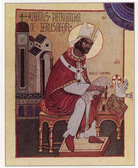
Chapter 5 of the Rule, from the Innocentian Mitigation, addresses the move of the Carmelites into Europe and the issue of where the community should establish foundations: “If the Prior and the brothers see fit, you may have foundations in solitary places, or where you are given a site suitable and convenient for the observance proper to your Order.” It’s obvious that life in the secular world does not work this way. Families and individuals are neither “given” foundations to live, nor can they be limited to living in “solitary” places. However, the underlying principles and concerns do apply to everyone’s life, no matter what their station.
In the original reflection, I wrote:
“the primary factor that is raised above all others, is the effect of the ministry and area on our ability to live our Way of life.
Is this a question that we ask when considering invitations to new ministries? Are the demands of the life of a parish pastor, or high school president/principle compatible with the communal and contemplative life of a Carmelite friar? Are full-time salaried positions with modern benefits compatible with a life of poverty that renounces ownership? Are large cities convenient for a life of simplicity and solitude?”
Now, it’s obvious that these questions don’t necessarily fit with day-to-day life in the world. Families could not survive renouncing full-time positions; it would not be right for parents to commit their children to a life of poverty; and it’s simply unreasonable to even suggest that no one either should live in a large city, or that living in a city prevents one from being a true follower of Christ. But this doesn’t mean that the concepts and ideas are irrelevant to life outside the monastery. One way of looking at this part of the text, is to recognize that it is calling our attention to a very important concept: Where we live, what we do for a living, the types of things we own, and even the friends and associates around us have a major impact on our ability to live a Christian life.
One of the earliest documents that survives in the Roman Catholic Church is a letter called the Apostolic Tradition of Hypolitus. This document, from the 3rd century, gives us one of the first detailed descriptions of the initiation ceremonies practiced in the churches of Rome. In it, there is a long list professions that Christians are forbidden from practicing: “If one is a..., . Soldier, teacher... Now, we may be shocked to think that being a teacher is fundamentally opposed to being Christian, but that specifically is another issue of a different time and culture (to be a teacher in Rome meant to be a teacher of the Roman gods and to be a soldier required one to offer sacrifices to the gods, the very act that Christians were being martyred for refusing to do). The underlying principle here is the very same one that the Rule is drawing our attention to. There are professions, activities and places that significantly hinder our ability to live the values and grow as followers of Christ. We are to accept foundations that are convenient to this Way of Life. If our job asks us to take advantage of people or to manipulate them; if it prevents us from giving time to our families or to spiritual endeavors; if even in a general way it brings us down emotionally and spiritually, we should look for another source of income. If we live in an area that is dangerous, either physically as in a high crime area, or a place that is spiritually destructive we should do what we can to change this, whether that be to move to a place more conducive to a healthy life, or to change the area around us, if we are able to do so. We are to pay attention to the friends that we have, to the belongings that we own and how they encourage us to use our time. We are, in other words, to accept foundations that are convenient to this Way of Life, and whatever else, whatever distracts and pulls us away from a life in Christ we are to avoid.
The rest of the Rule can be treated the same way. Some parts of the Rule are straightforward and very simple, like the exhortation to hear mass daily in Chapter 14. Anyone can Others may be more obscure, like the provision for owning livestock in Chapter 13. But even here, even in the most obscure and seemingly irrelevant parts of Albert’s Rule, it remains inerrantly relevant and affective to Carmelite life in the 21st Century, both for vowed members of the orders and for those living in secular the world.
Desert Reflections may have begun during my life in the Order of Carmelites, but its wisdom and influence has carried over into life outside the order. I hope and pray that you may find in it also some wisdom and inspiration that will lead you along this same Way, ever more deeply and profoundly into a life with Christ, into an 8-century tradition that found God in the silence, in solitude and in simplicity, and into a constant state of being in-love with the One who Loved us first.
In the original reflection, I wrote:
“the primary factor that is raised above all others, is the effect of the ministry and area on our ability to live our Way of life.
Is this a question that we ask when considering invitations to new ministries? Are the demands of the life of a parish pastor, or high school president/principle compatible with the communal and contemplative life of a Carmelite friar? Are full-time salaried positions with modern benefits compatible with a life of poverty that renounces ownership? Are large cities convenient for a life of simplicity and solitude?”
Now, it’s obvious that these questions don’t necessarily fit with day-to-day life in the world. Families could not survive renouncing full-time positions; it would not be right for parents to commit their children to a life of poverty; and it’s simply unreasonable to even suggest that no one either should live in a large city, or that living in a city prevents one from being a true follower of Christ. But this doesn’t mean that the concepts and ideas are irrelevant to life outside the monastery. One way of looking at this part of the text, is to recognize that it is calling our attention to a very important concept: Where we live, what we do for a living, the types of things we own, and even the friends and associates around us have a major impact on our ability to live a Christian life.
One of the earliest documents that survives in the Roman Catholic Church is a letter called the Apostolic Tradition of Hypolitus. This document, from the 3rd century, gives us one of the first detailed descriptions of the initiation ceremonies practiced in the churches of Rome. In it, there is a long list professions that Christians are forbidden from practicing: “If one is a..., . Soldier, teacher... Now, we may be shocked to think that being a teacher is fundamentally opposed to being Christian, but that specifically is another issue of a different time and culture (to be a teacher in Rome meant to be a teacher of the Roman gods and to be a soldier required one to offer sacrifices to the gods, the very act that Christians were being martyred for refusing to do). The underlying principle here is the very same one that the Rule is drawing our attention to. There are professions, activities and places that significantly hinder our ability to live the values and grow as followers of Christ. We are to accept foundations that are convenient to this Way of Life. If our job asks us to take advantage of people or to manipulate them; if it prevents us from giving time to our families or to spiritual endeavors; if even in a general way it brings us down emotionally and spiritually, we should look for another source of income. If we live in an area that is dangerous, either physically as in a high crime area, or a place that is spiritually destructive we should do what we can to change this, whether that be to move to a place more conducive to a healthy life, or to change the area around us, if we are able to do so. We are to pay attention to the friends that we have, to the belongings that we own and how they encourage us to use our time. We are, in other words, to accept foundations that are convenient to this Way of Life, and whatever else, whatever distracts and pulls us away from a life in Christ we are to avoid.
The rest of the Rule can be treated the same way. Some parts of the Rule are straightforward and very simple, like the exhortation to hear mass daily in Chapter 14. Anyone can Others may be more obscure, like the provision for owning livestock in Chapter 13. But even here, even in the most obscure and seemingly irrelevant parts of Albert’s Rule, it remains inerrantly relevant and affective to Carmelite life in the 21st Century, both for vowed members of the orders and for those living in secular the world.
Desert Reflections may have begun during my life in the Order of Carmelites, but its wisdom and influence has carried over into life outside the order. I hope and pray that you may find in it also some wisdom and inspiration that will lead you along this same Way, ever more deeply and profoundly into a life with Christ, into an 8-century tradition that found God in the silence, in solitude and in simplicity, and into a constant state of being in-love with the One who Loved us first.
Desert Reflections
~Introduction~
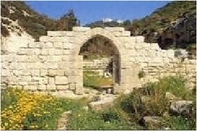
One of the more unique features of the Novitiate year for the Carmelite Order is the Desert experience of Lent. While silence and prayer are the focus of the entire year, the season of Lent is marked as a particularly intense time. The entire house is intended to go into silence (with Sundays and other feast days as the normal exceptions). There is the physical silence: brothers speak only during supper; the television and radios are turned off; cell phones are also limited to necessary use only, such as for a family emergency or if needed for a brother's regular work. Today we have to also consider an electronic silence, computers and social networks are shutdown. Many of the brothers also refrain from reading newspapers. They are also to stay home, there are no daily trips to the coffee shop, or going out to the movies or catching a ballgame. This is the Novitiate Desert, a time that is meant to be as close as we can come to the desert hives of the hermits who began our Order on Mt. Carmel. The silence and the disconnection is meant to be complete, a tangible wrapping that shuts out the daily noise and intrusions of the world; it is only in such silence that lasts for such an extended period of time that we can crawl deeper into our experience of our Beloved and be attuned to the quieter sounds of His voice. This intimacy and inward turn of our attention is the intention and purpose of the desert, the solitude and silence that our tradition has long described as Elijah's encounter at the mouth of his cave, as the Lord passed by in the sound of a silent wind and spoke with him as a friend.
The desert is the place where we go to find God and God alone. Certainly He is present in our daily midst, not only where two or more are gathered, but also actively involved in the day-to-day activity of life. The desert is where we go to find Him alone, it is the place to where Jesus retreated, and where Father met with the Son as we might come to our Lover, free of distractions and other demands, a moment of entry into the bridal chamber where we experience no thing and no one other than Love. The tradition of the desert far exceeds what the Carmelites have adopted and it is not limited to long periods of seclusion. Weekly deserts of a day revitalize the soul. An hour or half-hour during the day serve as respites and oases in the midst of a loud and cluttered life—times and moments when the outside stillness brings stillness to the soul.
The following reflections are not about the desert. They come from the desert. These are reflections on the Rule of Carmel, the Way of Life prescribed by Albert of Jerusalem “to the hermits gathered around the Spring of Elijah on Mt. Carmel.” The Rule is the source and beginning of our Way of Life, so it seemed appropriate to also begin my desert there and to see how it might call me toward our God. I assigned myself no more than one chapter of the Rule each day for meditation, to listen to its words alone (without the clutter and noise of scholarly research, linguistic parsing, historical analysis or any of the dozens of commentaries that have been written—although these things did remain in the corner of my mind as I read). I sought to consider the Rule of Carmel for what it says and what it stirred inside. I did not try to be comprehensive or to explain its true meaning, but to merely be attentive to that still small voice and record how the text of the Rule struck me at that particular moment and as a brother living 800 years after it was written. I was sure then, and can speak with experience now, that different readings at different times strike on different cords. There is no singularly correct reading of the Rule that applies to every circumstance. At the same time, there are certain things that the Rule does say and intend to say. There are things that it does not say and interpretations that simply betray its intentions. The fact that not every interpretation is reasonable, does not mean that only one is. These are my reflections on the Rule. I hope that they help you to glean much more and possibly hear a slightly different stir inside of you. Most of all, I hope that in them you can find that even today, when technology and electronics allows us to reach the entire world from within or near our cell, its words and wisdom continue to apply and guide. In a society that no longer uses donkeys and a Carmel that has been physically removed from the seclusion of the Spring and caves of the wadi, the Rule still serves as the source and foundation that leads us on this Way of Life.
In reading the Rule and trying to transfer it into a contemporary context, there remains a very significant question: For whom is the Rule written? Is it written for cloistered monks, hidden away from public ministry and the concerns and temptations of modern life; for vowed religious with the supports and structures of a common community life? Was it written solely for the brothers living in the caves of Mt. Carmel, or for the mendicant friars as they moved into European cities and away from the primitive seclusion of the desert? Was the Rule specifically written for life in the 13th Century, a time before industry and digital technologies, when one lived on food and water that the land provided, when travel was mostly by foot and seclusion into the cell could not be interrupted by the internet, telephones and text messages?
The opening of the letter is addressed to the hermits “who live near the spring on Mt. Carmel.” This is a very important point. The Carmelite Rule is the only Rule in the Roman Catholic tradition that is addressed to a particular place. There is no mention of those who wish to follow a particular founder; only reference to a Brother B. as a leader of the brothers to whom St. Albert is writing. Rather than being founded by an individual and Rule Giver, the Carmelites were founded according to a place and named accordingly: the Brothers of the Blessed Virgin Mary of Mt. Carmel.
To the hermits gathered around the fountain of Elijah on Mt. Carmel, Albert of Jerusalem prepared a way of life suitable for the pursuit of a life in allegiance to Christ, to be lived in the desert hermitage of caves, in seclusion and silence. What happens though when these brothers are exiled from this mountain by the war of the crusades and the promise of death? What happens to to the silence when the Carmelites move into the cities of Europe; from a life without ownership to living in a society of material goods?
There are no easy answers, and one may describe the 800+ years that have followed the Carmelite exile as the struggle to sort through these very things. How does one live the life and way of a hermit, gathered on the desert mountain, in the midst of a city? Can one even live this life beyond the walls of the cloister? This question is one that continues to be debated and about which many great saints have come down on both sides and this very fact that so many Carmelites and for such a long time have continued to struggle and discern this way of life suggests to e that although founded in a very particular place, there is something beyond that physical place to the Way of Life Albert prepared in the Carmelite Rule.
We ask the question: For whom is the Rule written? Millions have turned to Albert’s Rule and this way of life who long to live in allegiance to Christ. This desire to love and live in close, intimate proximity to our Lord, I believe, is the answer to the question. The Rule is written for those who long to live ‘in allegiance to Christ,” out of love and devotion. And if it is written for all those who love Christ and can commit themselves to this Way in pursuit of His love, then there is a way that the Carmelite Way of Life has meaning and can be translated, or adapted, to this modern and contemporary way of life. While the mitigation of the Rule gave explicit permission to the brothers that “you may have as many asses and mules as you need,” it is not secluded to a place and time where owning a beast of burden is essential to life.
Beyond the cloisters and beyond the brothers and sisters of vowed consecrated life, this Way of Life has profound meaning and can be lived in the midst of the secular world. Of course, it should not be said that this Rule and Way of Life is suited to anyone who may casually pick up its pages and, from time-to-time, graze with the expectation of total fulfillment. As Albert also writes: “Many and varied are the ways in which our saintly forefathers laid down how everyone, whatever his station or the kind of religious observance he has chosen, should live a life of allegiance to Jesus Christ--how, pure in heart and stout in conscience, he must be unswerving in the service of his Master. It is to me, however, that you have come for a rule of life in keeping with your avowed purpose, a rule you may hold fast to henceforward.”
For whom is the Rule written? For those who find in it a Way that is worth devoting their life to in the pursuit and desire to live a life in Christ. Beyond the cloisters and beyond the brothers and sisters of vowed consecrated life, this Way of Life has profound meaning and can be lived in the midst of the secular world-as the thousands of Third Order members and millions of Christian lives have witnessed to.
These reflections are an exploration of the Rule, not just for vowed brothers and sisters living in community, but is intended for anyone who may long for and desire a life of true allegiance to Christ and turn to this particular Way of Life. As I have already mentioned, these reflections were written during my novitiate year in the Order of Carmelites and I have printed them with only minor changes. However, after each of these entries I have now added a few points, specific suggestions and ways of interpreting the concepts and ideas of the Rule into daily, secular life.
The desert is the place where we go to find God and God alone. Certainly He is present in our daily midst, not only where two or more are gathered, but also actively involved in the day-to-day activity of life. The desert is where we go to find Him alone, it is the place to where Jesus retreated, and where Father met with the Son as we might come to our Lover, free of distractions and other demands, a moment of entry into the bridal chamber where we experience no thing and no one other than Love. The tradition of the desert far exceeds what the Carmelites have adopted and it is not limited to long periods of seclusion. Weekly deserts of a day revitalize the soul. An hour or half-hour during the day serve as respites and oases in the midst of a loud and cluttered life—times and moments when the outside stillness brings stillness to the soul.
The following reflections are not about the desert. They come from the desert. These are reflections on the Rule of Carmel, the Way of Life prescribed by Albert of Jerusalem “to the hermits gathered around the Spring of Elijah on Mt. Carmel.” The Rule is the source and beginning of our Way of Life, so it seemed appropriate to also begin my desert there and to see how it might call me toward our God. I assigned myself no more than one chapter of the Rule each day for meditation, to listen to its words alone (without the clutter and noise of scholarly research, linguistic parsing, historical analysis or any of the dozens of commentaries that have been written—although these things did remain in the corner of my mind as I read). I sought to consider the Rule of Carmel for what it says and what it stirred inside. I did not try to be comprehensive or to explain its true meaning, but to merely be attentive to that still small voice and record how the text of the Rule struck me at that particular moment and as a brother living 800 years after it was written. I was sure then, and can speak with experience now, that different readings at different times strike on different cords. There is no singularly correct reading of the Rule that applies to every circumstance. At the same time, there are certain things that the Rule does say and intend to say. There are things that it does not say and interpretations that simply betray its intentions. The fact that not every interpretation is reasonable, does not mean that only one is. These are my reflections on the Rule. I hope that they help you to glean much more and possibly hear a slightly different stir inside of you. Most of all, I hope that in them you can find that even today, when technology and electronics allows us to reach the entire world from within or near our cell, its words and wisdom continue to apply and guide. In a society that no longer uses donkeys and a Carmel that has been physically removed from the seclusion of the Spring and caves of the wadi, the Rule still serves as the source and foundation that leads us on this Way of Life.
In reading the Rule and trying to transfer it into a contemporary context, there remains a very significant question: For whom is the Rule written? Is it written for cloistered monks, hidden away from public ministry and the concerns and temptations of modern life; for vowed religious with the supports and structures of a common community life? Was it written solely for the brothers living in the caves of Mt. Carmel, or for the mendicant friars as they moved into European cities and away from the primitive seclusion of the desert? Was the Rule specifically written for life in the 13th Century, a time before industry and digital technologies, when one lived on food and water that the land provided, when travel was mostly by foot and seclusion into the cell could not be interrupted by the internet, telephones and text messages?
The opening of the letter is addressed to the hermits “who live near the spring on Mt. Carmel.” This is a very important point. The Carmelite Rule is the only Rule in the Roman Catholic tradition that is addressed to a particular place. There is no mention of those who wish to follow a particular founder; only reference to a Brother B. as a leader of the brothers to whom St. Albert is writing. Rather than being founded by an individual and Rule Giver, the Carmelites were founded according to a place and named accordingly: the Brothers of the Blessed Virgin Mary of Mt. Carmel.
To the hermits gathered around the fountain of Elijah on Mt. Carmel, Albert of Jerusalem prepared a way of life suitable for the pursuit of a life in allegiance to Christ, to be lived in the desert hermitage of caves, in seclusion and silence. What happens though when these brothers are exiled from this mountain by the war of the crusades and the promise of death? What happens to to the silence when the Carmelites move into the cities of Europe; from a life without ownership to living in a society of material goods?
There are no easy answers, and one may describe the 800+ years that have followed the Carmelite exile as the struggle to sort through these very things. How does one live the life and way of a hermit, gathered on the desert mountain, in the midst of a city? Can one even live this life beyond the walls of the cloister? This question is one that continues to be debated and about which many great saints have come down on both sides and this very fact that so many Carmelites and for such a long time have continued to struggle and discern this way of life suggests to e that although founded in a very particular place, there is something beyond that physical place to the Way of Life Albert prepared in the Carmelite Rule.
We ask the question: For whom is the Rule written? Millions have turned to Albert’s Rule and this way of life who long to live in allegiance to Christ. This desire to love and live in close, intimate proximity to our Lord, I believe, is the answer to the question. The Rule is written for those who long to live ‘in allegiance to Christ,” out of love and devotion. And if it is written for all those who love Christ and can commit themselves to this Way in pursuit of His love, then there is a way that the Carmelite Way of Life has meaning and can be translated, or adapted, to this modern and contemporary way of life. While the mitigation of the Rule gave explicit permission to the brothers that “you may have as many asses and mules as you need,” it is not secluded to a place and time where owning a beast of burden is essential to life.
Beyond the cloisters and beyond the brothers and sisters of vowed consecrated life, this Way of Life has profound meaning and can be lived in the midst of the secular world. Of course, it should not be said that this Rule and Way of Life is suited to anyone who may casually pick up its pages and, from time-to-time, graze with the expectation of total fulfillment. As Albert also writes: “Many and varied are the ways in which our saintly forefathers laid down how everyone, whatever his station or the kind of religious observance he has chosen, should live a life of allegiance to Jesus Christ--how, pure in heart and stout in conscience, he must be unswerving in the service of his Master. It is to me, however, that you have come for a rule of life in keeping with your avowed purpose, a rule you may hold fast to henceforward.”
For whom is the Rule written? For those who find in it a Way that is worth devoting their life to in the pursuit and desire to live a life in Christ. Beyond the cloisters and beyond the brothers and sisters of vowed consecrated life, this Way of Life has profound meaning and can be lived in the midst of the secular world-as the thousands of Third Order members and millions of Christian lives have witnessed to.
These reflections are an exploration of the Rule, not just for vowed brothers and sisters living in community, but is intended for anyone who may long for and desire a life of true allegiance to Christ and turn to this particular Way of Life. As I have already mentioned, these reflections were written during my novitiate year in the Order of Carmelites and I have printed them with only minor changes. However, after each of these entries I have now added a few points, specific suggestions and ways of interpreting the concepts and ideas of the Rule into daily, secular life.
Chapter 1~ In the Name of the Father, and of the Son and the Holy Spirit
"Albert, called by God's fervor to be Patriarch of the Church if Jerusalem, bids health in the Lord and the blessing of the Holy Spirit to his beloved sons in Christ, B., and the other hermits under obedience to him, who live near the spring on Mount Carmel."
I have heard a lot said about the writing of our Rule in the form of a letter, much conjecture about who brother "B." really was, why Patriarch Albert did not use his full name and who precisely were these hermits, but I have not yet heard anyone mention the most interesting part of this opening: The Rule, from the very beginning and first greeting, is trinitarian. Albert does not merely greet his brothers in Christ, as one could easily and often expect from such a letter, but in the name of the Lord, the Holy Spirit and as sons in Christ.
He greets the community of hermits, and us, just as we are baptized into the name of the Father, and the Son, and the Holy Spirit. I do not know if this was an intentional move by Albert-- it is hard to imagine that anything he wrote was not done intentionally-- but in either case, he is greeting the brothers into their new way of life according to the same way that they had entered and were received into their first life in Christ and under the same name of God. He reminds us also of a long tradition of monastic and religious communities that understood the profession of vows as a second baptism.
And so we begin our life in the single name of the Father, the Son and the Holy Spirit. Perhaps it would be fitting to include these words in our profession of vows, with this simple greeting in the name of our One God, that our life from here forward enjoy good health in the Lord, and remain in the blessing of the Holy Spirit as his beloved sons in Christ.
--Br. Kendall, O.Carm.
I have heard a lot said about the writing of our Rule in the form of a letter, much conjecture about who brother "B." really was, why Patriarch Albert did not use his full name and who precisely were these hermits, but I have not yet heard anyone mention the most interesting part of this opening: The Rule, from the very beginning and first greeting, is trinitarian. Albert does not merely greet his brothers in Christ, as one could easily and often expect from such a letter, but in the name of the Lord, the Holy Spirit and as sons in Christ.
He greets the community of hermits, and us, just as we are baptized into the name of the Father, and the Son, and the Holy Spirit. I do not know if this was an intentional move by Albert-- it is hard to imagine that anything he wrote was not done intentionally-- but in either case, he is greeting the brothers into their new way of life according to the same way that they had entered and were received into their first life in Christ and under the same name of God. He reminds us also of a long tradition of monastic and religious communities that understood the profession of vows as a second baptism.
And so we begin our life in the single name of the Father, the Son and the Holy Spirit. Perhaps it would be fitting to include these words in our profession of vows, with this simple greeting in the name of our One God, that our life from here forward enjoy good health in the Lord, and remain in the blessing of the Holy Spirit as his beloved sons in Christ.
--Br. Kendall, O.Carm.
